Magic: The Gathering® – Doctor Who™ Release Notes
Compiled by Jess Dunks
Document last modified Date June 22, 2023
PDF Download Links:
English | Français | Deutsch | 日本語
The Release Notes include information concerning the release of a new Magic: The Gathering set, as well as a collection of clarifications and rulings involving that set's cards. It's intended to make playing with the new cards more fun by clearing up the common misconceptions and confusion inevitably caused by new mechanics and interactions. As future sets are released, updates to the Magic rules may cause some of this information to become outdated. Go to Magic.Wizards.com/Rules to find the most up-to-date rules.
The "General Notes" section includes information about card legality and explains some of the mechanics and concepts in the set.
The "Card-Specific Notes" sections contain answers to the most important, most common, and most confusing questions players might ask about cards in the set. Items in the "Card-Specific Notes" sections include full card text for your reference. Not all cards in the set are listed.
GENERAL NOTES
Card Legality
Magic: The Gathering® – Doctor Who™ Commander cards with the WHO set code are permitted in the Commander, Legacy, and Vintage formats. Previously printed cards with the WHO set code are also legal for play in any format where a card with the same name is permitted.
Go to Magic.Wizards.com/Formats for a complete list of formats and their permitted card sets and banned lists.
Go to Magic.Wizards.com/Commander for more information on the Commander variant.
Go to Locator.Wizards.com to find an event or store near you.
New Mechanic: Face-Down Cybermen
The Cybermen are on the march, looking to "upgrade" anyone in their path.
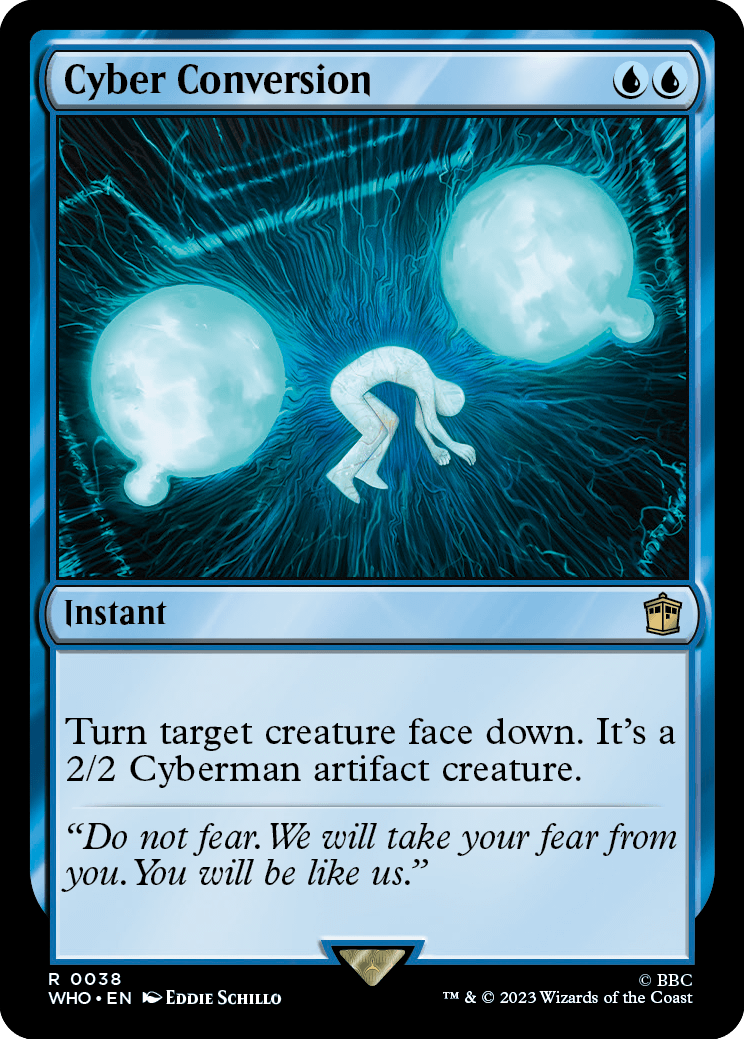
Cyber Conversion
{U}{U}
Instant
Turn target creature face down. It's a 2/2 Cyberman artifact creature.
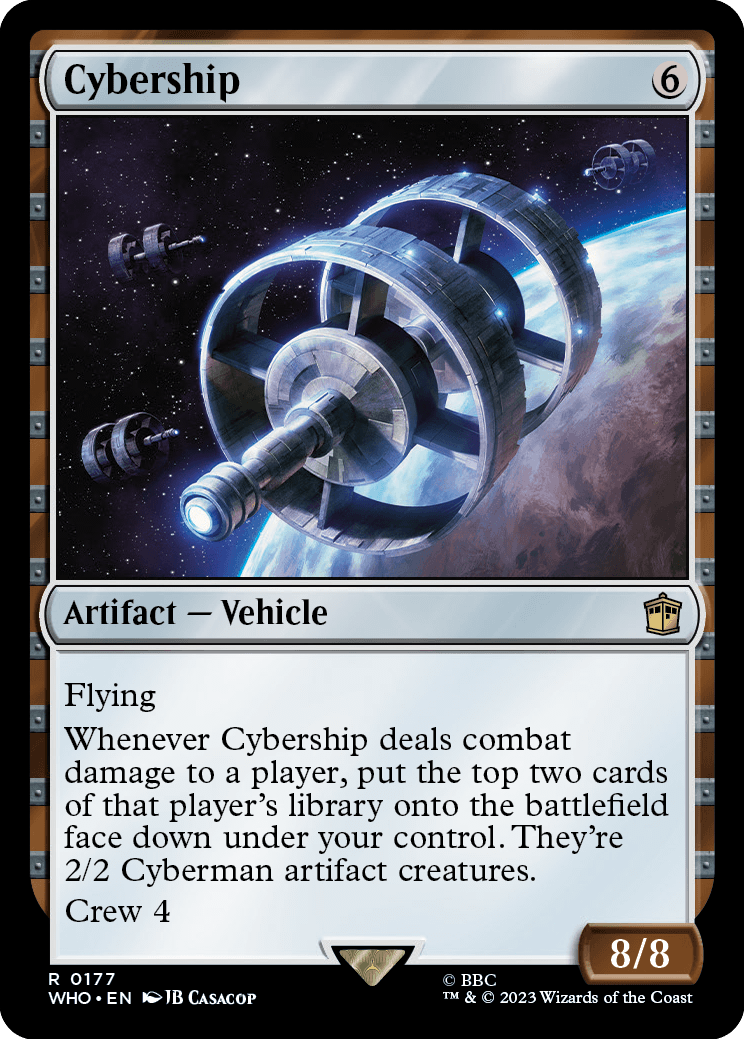
Cybership
{6}
Artifact — Vehicle
8/8
Flying
Whenever Cybership deals combat damage to a player, put the top two cards of that player's library onto the battlefield face down under your control. They're 2/2 Cyberman artifact creatures.
Crew 4
- Each creature turned face down this way or put onto the battlefield this way is a 2/2 Cyberman artifact creature with no name and no color.
- If, for any reason, the face-down creature is turned face up, the effect making it a Cyberman ends. It will be whatever is printed on the card.
- The player who controls a face-down permanent may look at it at any time. Notably, if the cards were put on the battlefield face down from another player's library, the player that owns them does not get to look at those cards.
- Double-faced permanents that are already on the battlefield can't be turned face down this way. However, a double-faced card can be put onto the battlefield face down from another zone this way.
- If the face-down card has a morph ability, its controller may turn it face up by paying the associated morph cost.
New Keyword Ability: Doctor's Companion
The Doctor always travels with a companion, and the new Doctor's companion ability is a partner ability that allows your Doctor Who™ Commander deck to reflect this. If the Doctor is your commander, you may also have a legendary creature with Doctor's companion as your second commander.
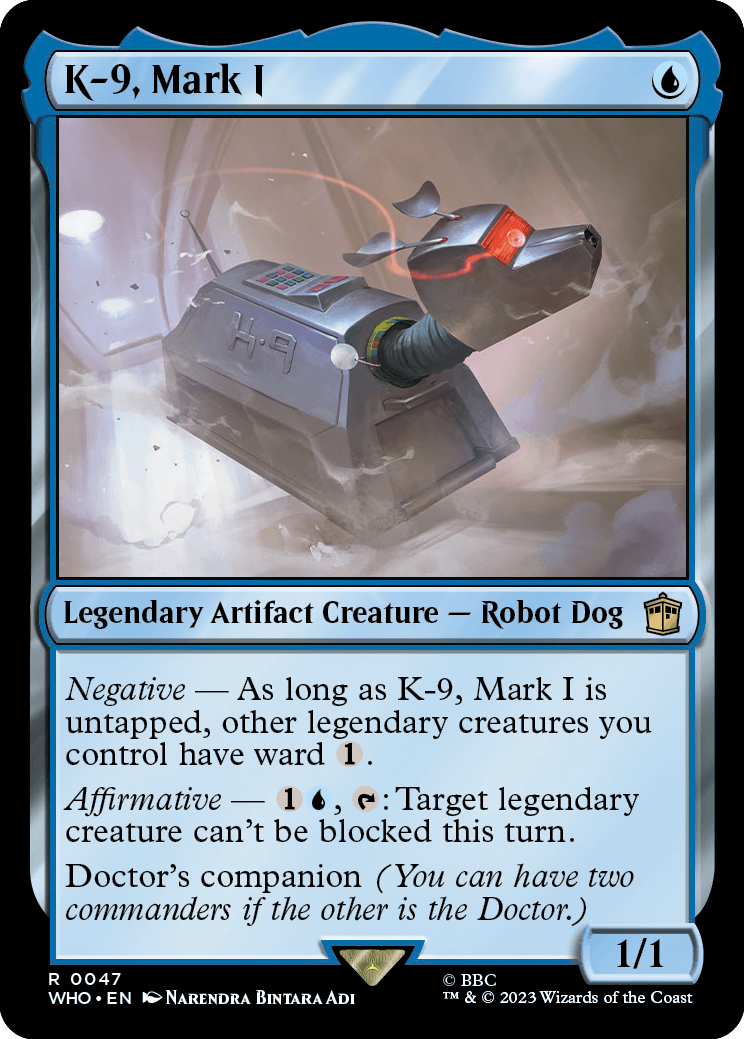
K-9, Mark I
{U}
Legendary Artifact Creature — Robot Dog
1/1
Negative — As long as K-9, Mark I is untapped, other legendary creatures you control have ward {1}.
Affirmative — {1}{U}, {T}: Target legendary creature can't be blocked this turn.
Doctor's companion (You can have two commanders if the other is the Doctor.)
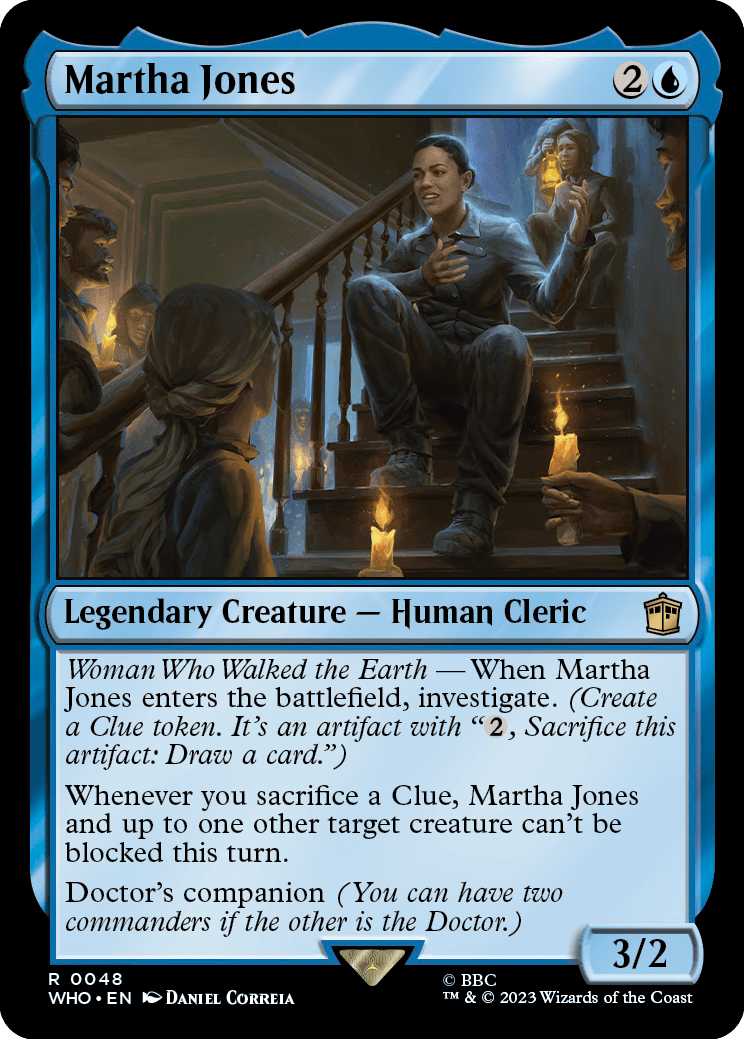
Martha Jones
{2}{U}
Legendary Creature — Human Cleric
3/2
Woman Who Walked the Earth — When Martha Jones enters the battlefield, investigate. (Create a Clue token. It's an artifact with "{2}, Sacrifice this artifact: Draw a card.")
Whenever you sacrifice a Clue, Martha Jones and up to one other target creature can't be blocked this turn.
Doctor's companion (You can have two commanders if the other is the Doctor.)
- The Doctor's companion ability allows you to have two commanders if one has the ability and the other is a legendary creature that is a Time Lord Doctor and has no other creature types. Creatures with the changeling ability, for example, can't be a second commander this way.
- Although Doctor's companion is a new variant of the partner ability, the rules for partner have not otherwise changed. Notably, Time Lord Doctors and cards with Doctor's companion do not interact with cards which have another partner ability.
- If your Commander deck has two commanders, you can include only cards whose own color identities are also found in your commanders' combined color identities.
- Both commanders start in the command zone, and the remaining 98 cards (or 58 cards in a Commander Draft game) of your deck are shuffled to become your library.
- Once the game begins, your two commanders are tracked separately. If you cast one, you won't have to pay an additional {2} the first time you cast the other. A player loses the game after having been dealt 21 combat damage from any one of them, not from both of them combined.
- If something refers to your commander while you have two commanders, it refers to one of them of your choice. If you are instructed to perform an action on your commander (e.g. put it from the command zone into your hand due to Command Beacon), you choose one of your commanders at the time the effect happens.
- An effect that checks whether you control your commander is satisfied if you control one or both of your two commanders.
New Keyword Action: Time Travel
The Doctor and his companions travel forward and backward in time on a regular basis, experiencing history and events in unexpected orders. The new time travel mechanic allows you to experience that by manipulating time counters on objects you own and objects in exile, causing events to happen (or not happen!) at unexpected times.
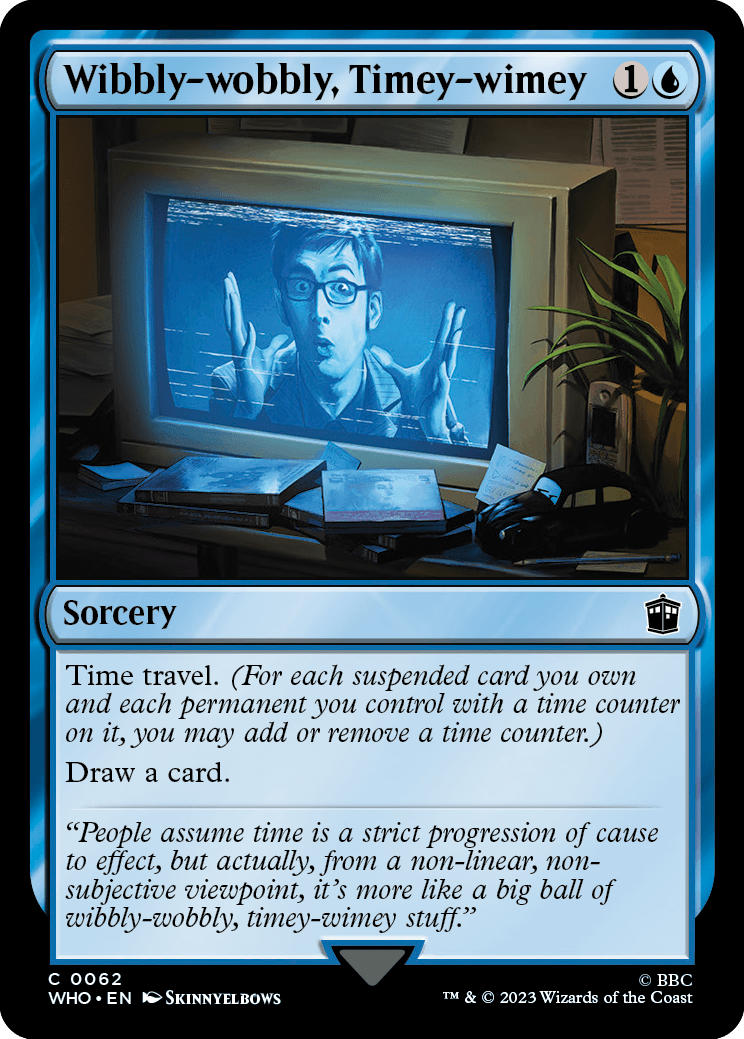
Wibbly-wobbly, Timey-wimey
{1}{U}
Sorcery
Time travel. (For each suspended card you own and each permanent you control with a time counter on it, you may add or remove a time counter.)
Draw a card.
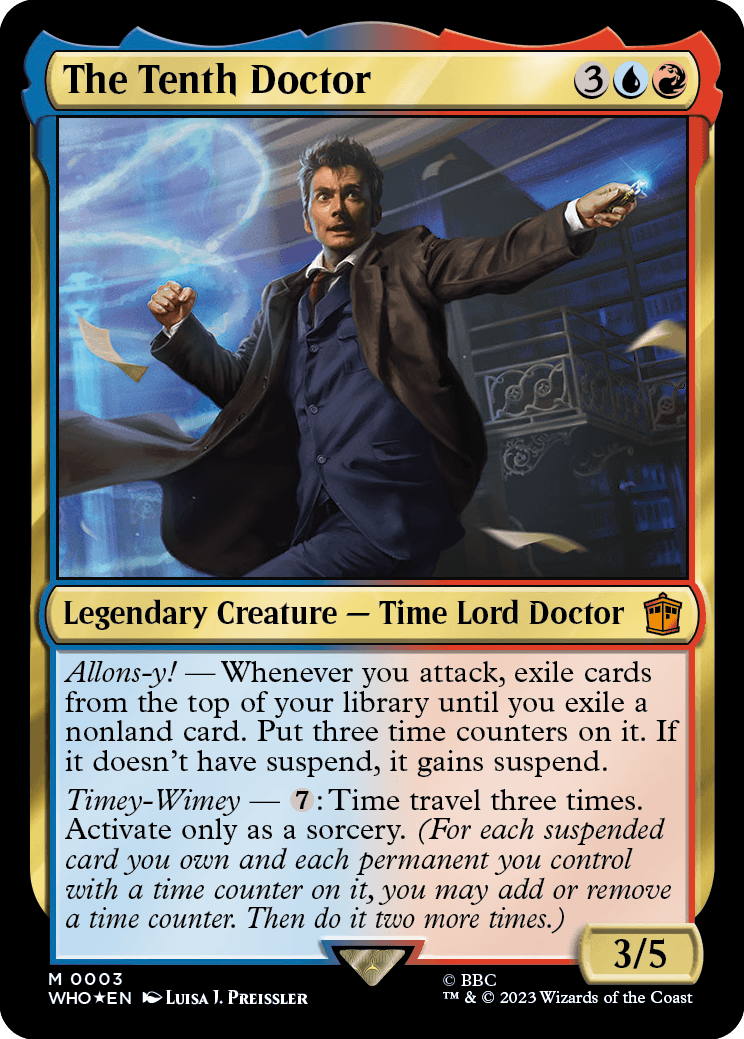
The Tenth Doctor
{3}{U}{R}
Legendary Creature — Time Lord Doctor
3/5
Allons-y! — Whenever you attack, exile cards from the top of your library until you exile a nonland card. Put three time counters on it. If it doesn't have suspend, it gains suspend.
Timey-Wimey — {7}: Time travel three times. Activate only as a sorcery. (For each suspended card you own and each permanent you control with a time counter on it, you may add or remove a time counter. Then do it two more times.)
- To time travel, look at each permanent you control with a time counter on it and each card you own in exile with a time counter on it. For each of them, you choose whether you want to put a time counter on that card or permanent, remove a time counter from it, or do neither. Then those changes all happen simultaneously.
- Time counters are usually found on cards with suspend and vanishing, but may be found on other cards as well. Notably, Sagas use lore counters to track their progress, not time counters. You can't move a Saga's chapters forward and backward this way.
New Keyword Action: Face a Villainous Choice
Villains of all stripes have a few things in common. In addition to an unrestrained desire for power and penchant for monologuing, they also tend to present our heroes with a terrible dilemma: a set of options which all seem bad with no obvious right answer. The villains in this product are no exception, and the villainous choice mechanic can force your opponent to make exactly these kinds of decisions.
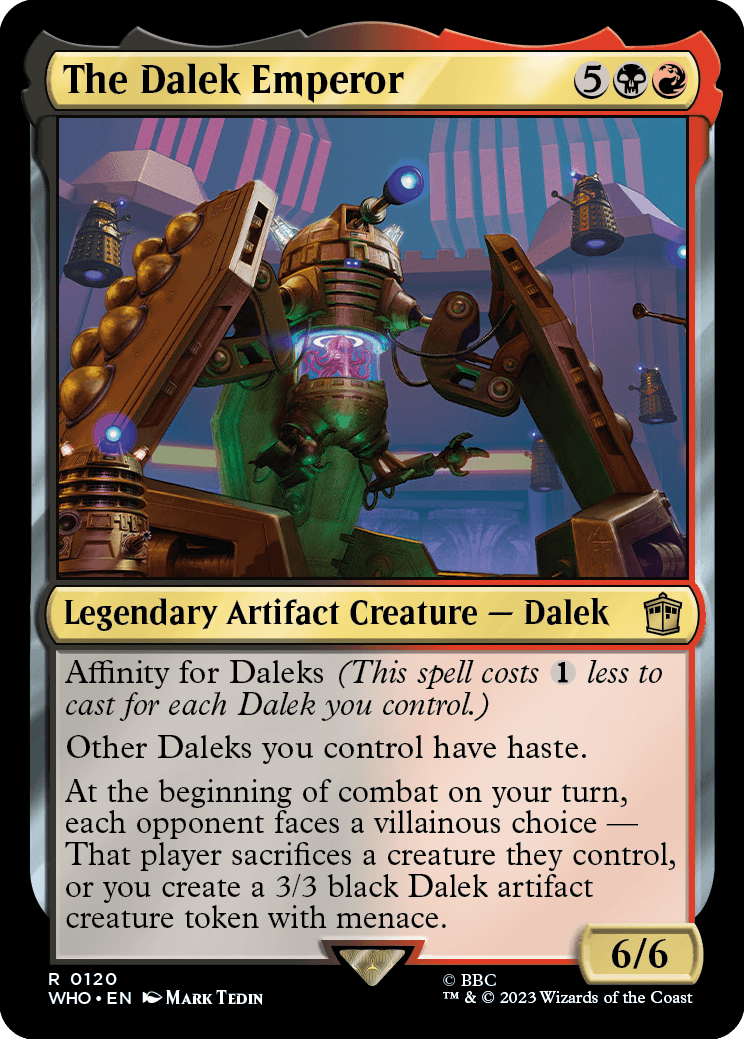
The Dalek Emperor
{5}{B}{R}
Legendary Artifact Creature — Dalek
6/6
Affinity for Daleks (This spell costs {1} less to cast for each Dalek you control.)
Other Daleks you control have haste.
At the beginning of combat on your turn, each opponent faces a villainous choice — That player sacrifices a creature they control, or you create a 3/3 black Dalek artifact creature token with menace.
- When a player faces a villainous choice, they first choose one of the two options, then all actions in the chosen option are performed.
- If a spell or ability requires multiple players to face a villainous choice, the result is a little different from other effects in Magic. In that case, the first player in turn order makes their choice and the action for that choice is performed before the next player makes their choice. Then each of the remaining players repeat this process in turn order.
New Ability Word: Paradox
Paradox is a new ability word that appears on cards which care about casting spells from zones other than your hand.
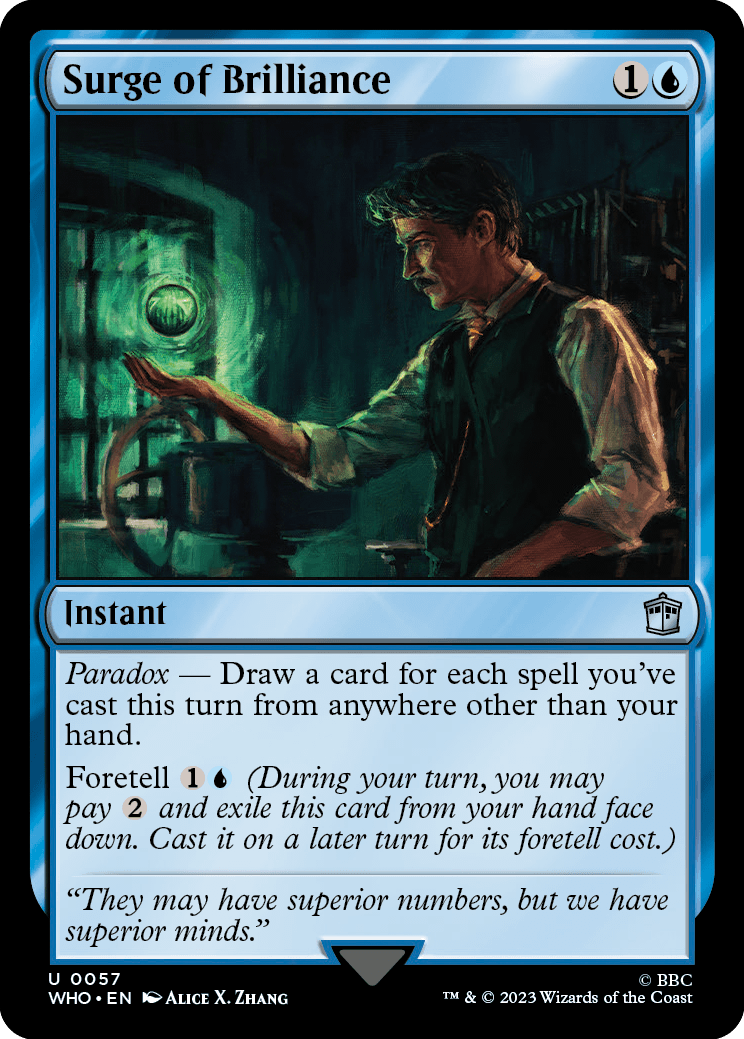
Surge of Brilliance
{1}{U}
Instant
Paradox — Draw a card for each spell you've cast this turn from anywhere other than your hand.
Foretell {1}{U} (During your turn, you may pay {2} and exile this card from your hand face down. Cast it on a later turn for its foretell cost.)
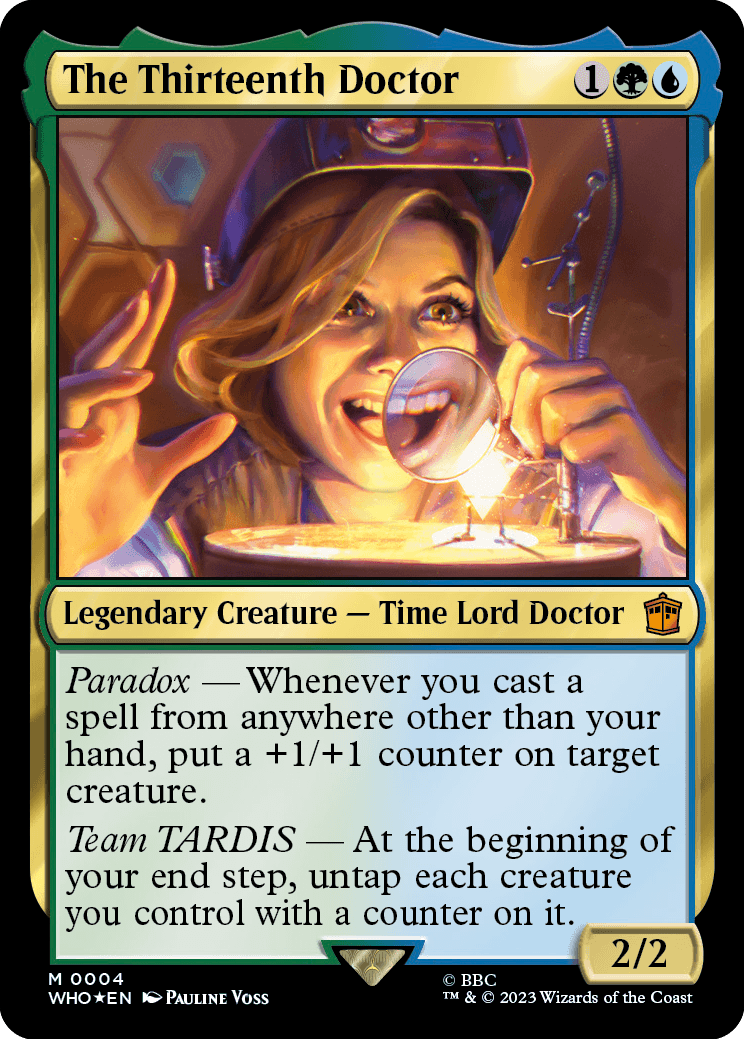
The Thirteenth Doctor
{1}{G}{U}
Legendary Creature — Time Lord Doctor
2/2
Paradox — Whenever you cast a spell from anywhere other than your hand, put a +1/+1 counter on target creature.
Team TARDIS — At the beginning of your end step, untap each creature you control with a counter on it.
- Paradox abilities count any spells cast from zones other than your hand. These are usually spells cast from exile, the graveyard, or the command zone. They also count spells cast from outside the game, such as spells cast with Wish or Garth One-Eye's ability.
- An instant or sorcery that counts how many spells you've cast from anywhere other than your hand, such as Surge of Brilliance, counts itself if it was cast from a zone other than your hand.
- A triggered ability that triggers when a spell is cast from anywhere other than your hand, such as that of The Thirteenth Doctor, functions only on the battlefield, so it doesn't trigger when you cast that spell from a zone other than your hand.
- If a spell or ability allows you to copy a spell on the stack but doesn't specify that the spell is cast, that spell wasn't cast and won't be counted by paradox abilities. However, if a spell or ability allows you to cast a copy of a spell, that spell will be counted for paradox abilities.
New Creature Type: Time Lord
Time Lord is a new creature type appearing on some cards in this set.
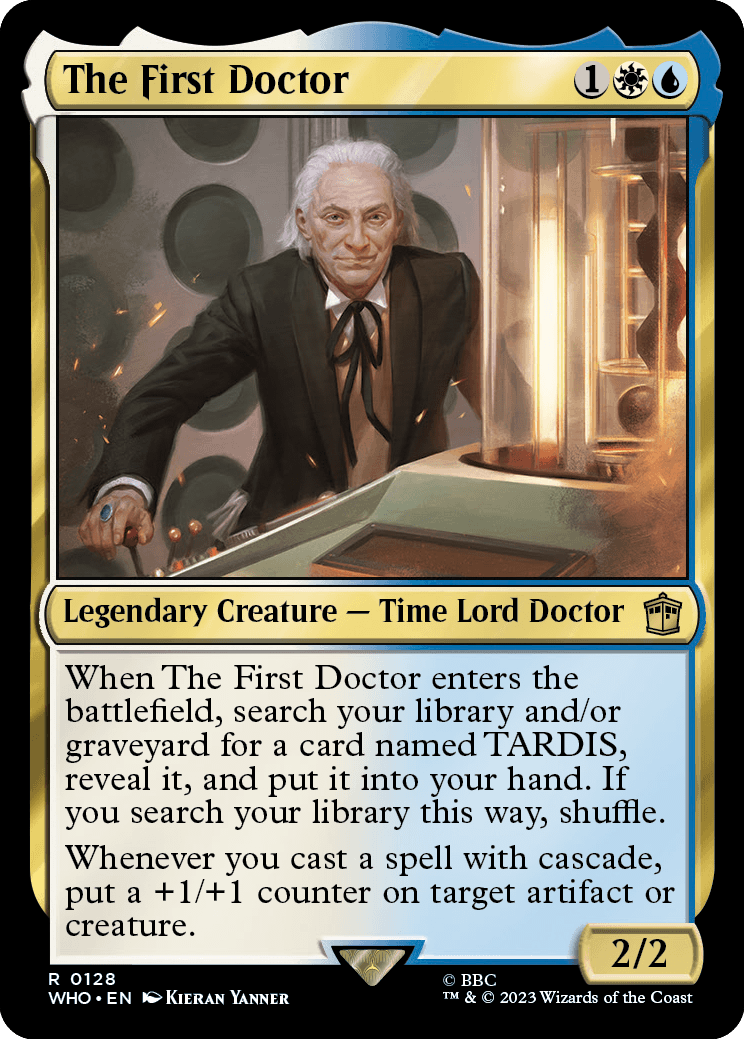
The First Doctor
{1}{W}{U}
Legendary Creature — Time Lord Doctor
2/2
When The First Doctor enters the battlefield, search your library and/or graveyard for a card named TARDIS, reveal it, and put it into your hand. If you search your library this way, shuffle.
Whenever you cast a spell with cascade, put a +1/+1 counter on target artifact or creature.
- Unlike other creature types in Magic that are each only one word, the two words "Time Lord" represent a single creature subtype. Time Lord is the only two-word creature type.
- Neither "Time" nor "Lord" are creature types. Some older cards were printed with the subtype "Lord," but all of those cards have updated Oracle card text that removed that type.
- If an effect instructs you to choose a creature type, you may choose Time Lord.
Returning Keyword Ability: Partner with [Name]
In addition to the Doctor's companion partner ability, another partner variant returns to represent iconic duos from the Doctor Who™ universe. A partner with [name] ability allows you to have two commanders if each of them has the other's name in the ability. This follows the normal partner rules for deckbuilding and most of the bullet points listed above under Doctor's companion. However, it also includes an enters-the-battlefield ability that allows you to target a player to search their library for that card and put it into their hand.
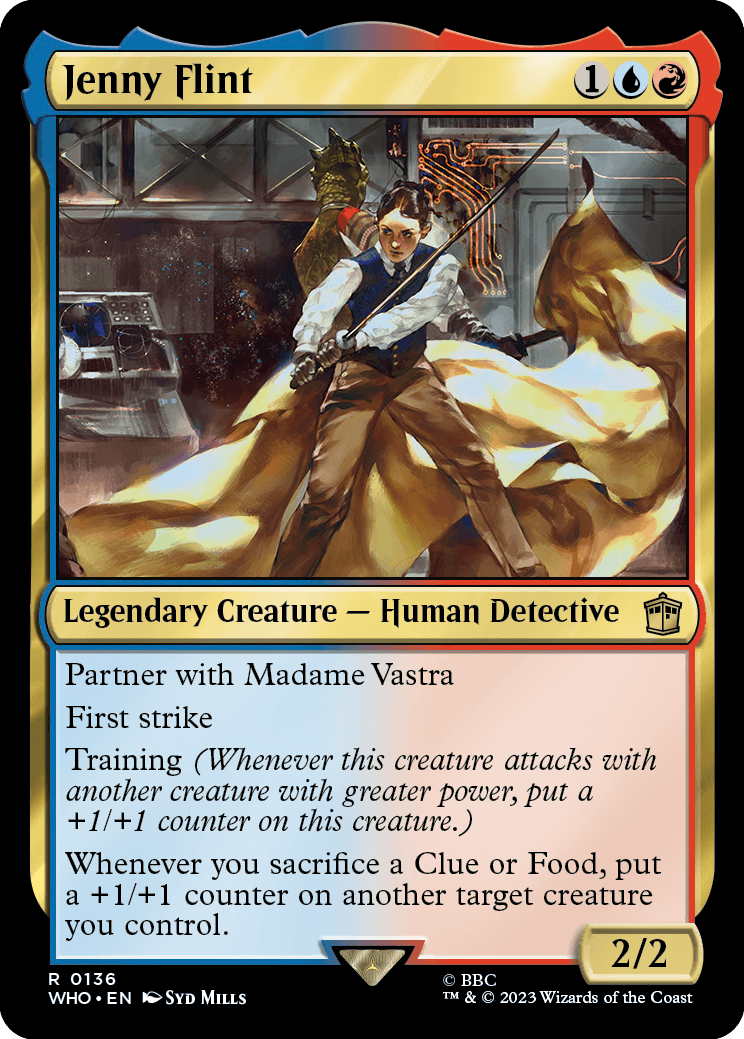
Jenny Flint
{1}{U}{R}
Legendary Creature — Human Detective
2/2
Partner with Madame Vastra
First strike
Training (Whenever this creature attacks with another creature with greater power, put a +1/+1 counter on this creature.)
Whenever you sacrifice a Clue or Food, put a +1/+1 counter on another target creature you control.
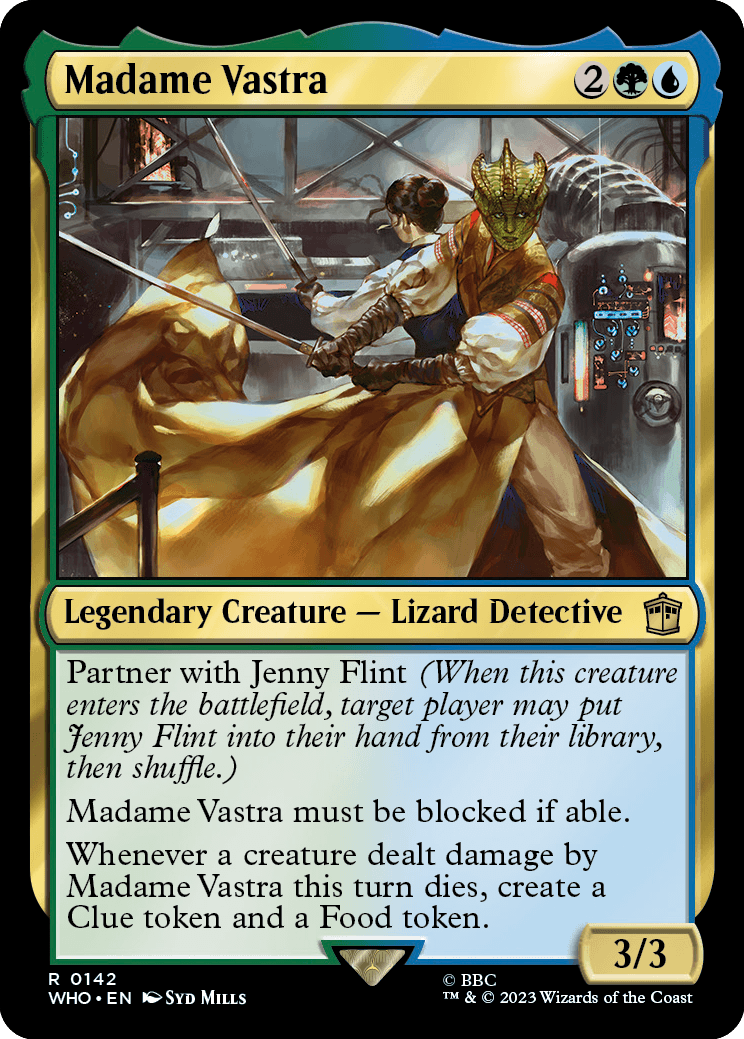
Madame Vastra
{2}{G}{U}
Legendary Creature — Lizard Detective
3/3
Partner with Jenny Flint (When this creature enters the battlefield, target player may put Jenny Flint into their hand from their library, then shuffle.)
Madame Vastra must be blocked if able.
Whenever a creature dealt damage by Madame Vastra this turn dies, create a Clue token and a Food token.
- "Partner with [name]" represents two abilities. The first is a triggered ability: "When this permanent enters the battlefield, target player may search their library for a card named [name], reveal it, put it into their hand, then shuffle."
- The second ability represented by the "partner with [name]" keyword modifies the rules for deck construction in the Commander variant and has no function outside of that variant. If a legendary creature card with "partner with [name]" is designated as your commander, the named legendary creature card can also be designated as your commander.
- Note that the target player searches their library (which may be affected by effects such as that of Stranglehold) and that the card they find is revealed, even though these words aren't included in the ability's reminder text.
Returning Keyword Ability: Suspend
Suspend is a mechanic that lets you set aside a card to be cast some number of turns later—you'll spend less mana to get it, but you'll have to spend time waiting for its arrival. Or you can just time travel!
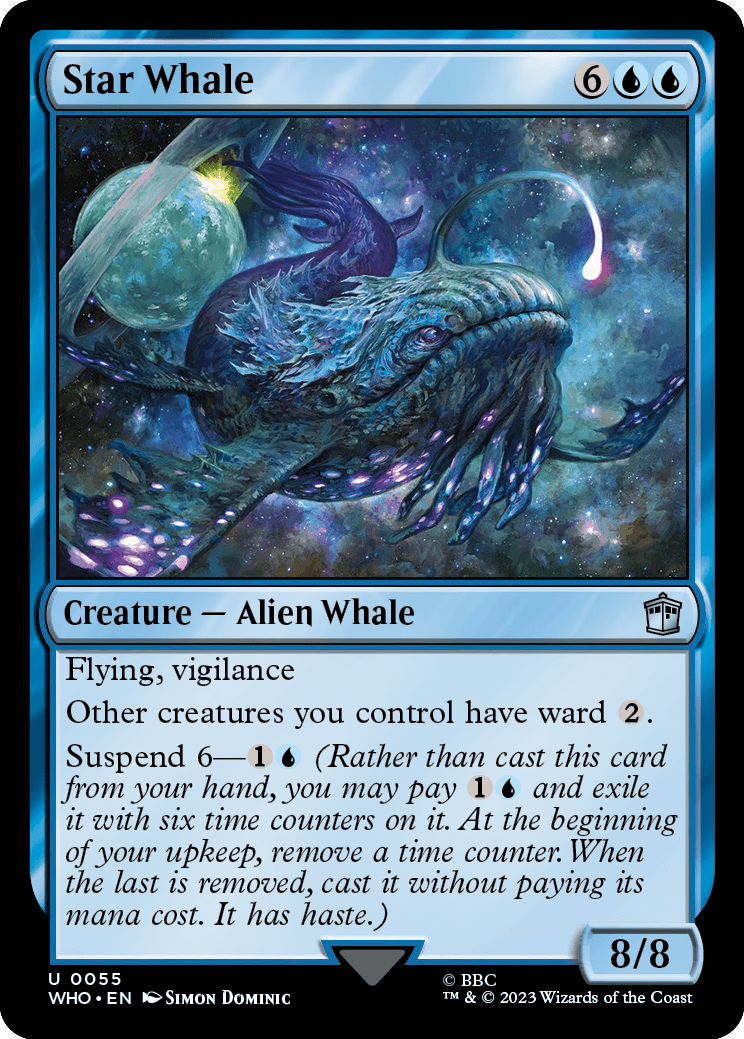
Star Whale
{6}{U}{U}
Creature — Alien Whale
8/8
Flying, vigilance
Other creatures you control have ward {2}.
Suspend 6—{1}{U} (Rather than cast this card from your hand, you may pay {1}{U} and exile it with six time counters on it. At the beginning of your upkeep, remove a time counter. When the last is removed, cast it without paying its mana cost. It has haste.)
- Suspend is a keyword that represents three abilities. The first is a static ability that allows you to exile the card from your hand with the specified number of time counters (the number before the dash) on it by paying its suspend cost (listed after the dash). The second is a triggered ability that removes a time counter from the suspended card at the beginning of each of your upkeeps. The third is a triggered ability that causes you to cast the card when the last time counter is removed. If you cast a creature spell this way, it gains haste until you lose control of that creature (or, in rare cases, you lose control of the creature spell while it's on the stack).
- You can exile a card in your hand using suspend any time you could cast that card. Consider its card type, any effects that modify when you could cast it (such as flash) and any other effects that stop you from casting it (such as from Meddling Mage's ability) to determine if and when you can do this. Whether you could actually complete all steps in casting the card is irrelevant. For example, you can exile a card with suspend that has no mana cost or that requires a target even if no legal targets are available at that time.
- Cards exiled with suspend are exiled face up.
- Exiling a card with suspend isn't casting that card. This action doesn't use the stack and can't be responded to.
- If the spell requires any targets, those targets are chosen when the spell is finally cast, not when the card is exiled.
- If an effect refers to a "suspended card," that means a card that (1) has suspend, (2) is in exile, and (3) has one or more time counters on it.
- If the first triggered ability of suspend (the one that removes time counters) is countered, no time counter is removed. The ability will trigger again at the beginning of the card's owner's next upkeep.
- When the last time counter is removed, the second triggered ability of suspend (the one that lets you cast the card) triggers. It doesn't matter why the last time counter was removed or what effect removed it.
- If the second triggered ability is countered, the card can't be cast. It remains exiled with no time counters on it, and it's no longer suspended.
- As the second triggered ability resolves, you must cast the card if able. You must do so even if it requires targets and the only legal targets are ones that you really don't want to target. Timing permissions based on the card's type are ignored.
- If you can't cast the card, perhaps because there are no legal targets available, it remains exiled with no time counters on it, and it's no longer suspended.
- If you cast a card "without paying its mana cost," such as with suspend, you can't choose to cast it for any alternative costs. You can, however, pay additional costs. If the card has any mandatory additional costs, you must pay those if you want to cast the card.
- You are never forced to activate mana abilities to pay costs, so if there is a mandatory additional mana cost (such as from Thalia, Guardian of Thraben), you can decline to activate mana abilities to pay for it and hence fail to cast the suspended card, leaving it in exile.
- If the card has {X} in its mana cost, you must choose 0 as the value of X when casting it without paying its mana cost.
- The mana value of a spell cast without paying its mana cost is determined by its mana cost, even though that cost wasn't paid.
CARD-SPECIFIC NOTES
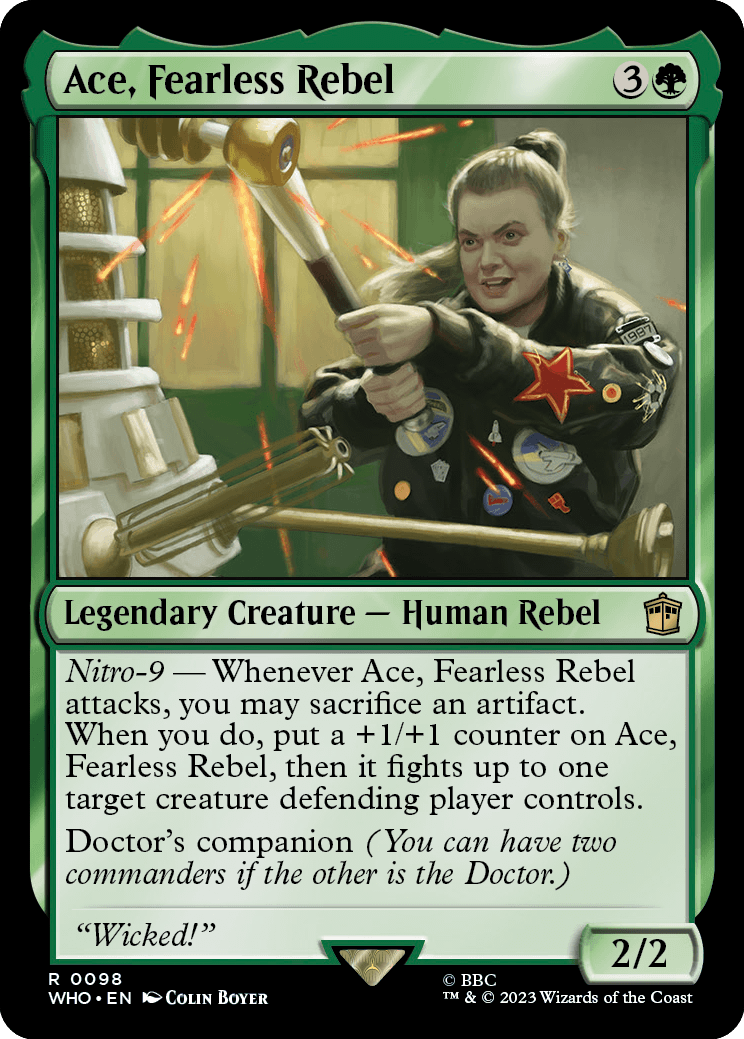
Ace, Fearless Rebel
{3}{G}
Legendary Creature — Human Rebel
2/2
Nitro-9 — Whenever Ace, Fearless Rebel attacks, you may sacrifice an artifact. When you do, put a +1/+1 counter on Ace, Fearless Rebel, then it fights up to one target creature defending player controls.
Doctor's companion (You can have two commanders if the other is the Doctor.)
- If you choose no target for Ace's Nitro-9 ability, you will put a +1/+1 counter on it. However, if you chose a target and it is an illegal target as the ability tries to resolve, you won't put a +1/+1 counter on Ace. In either case, no fight will happen and no creature will deal or be dealt damage.
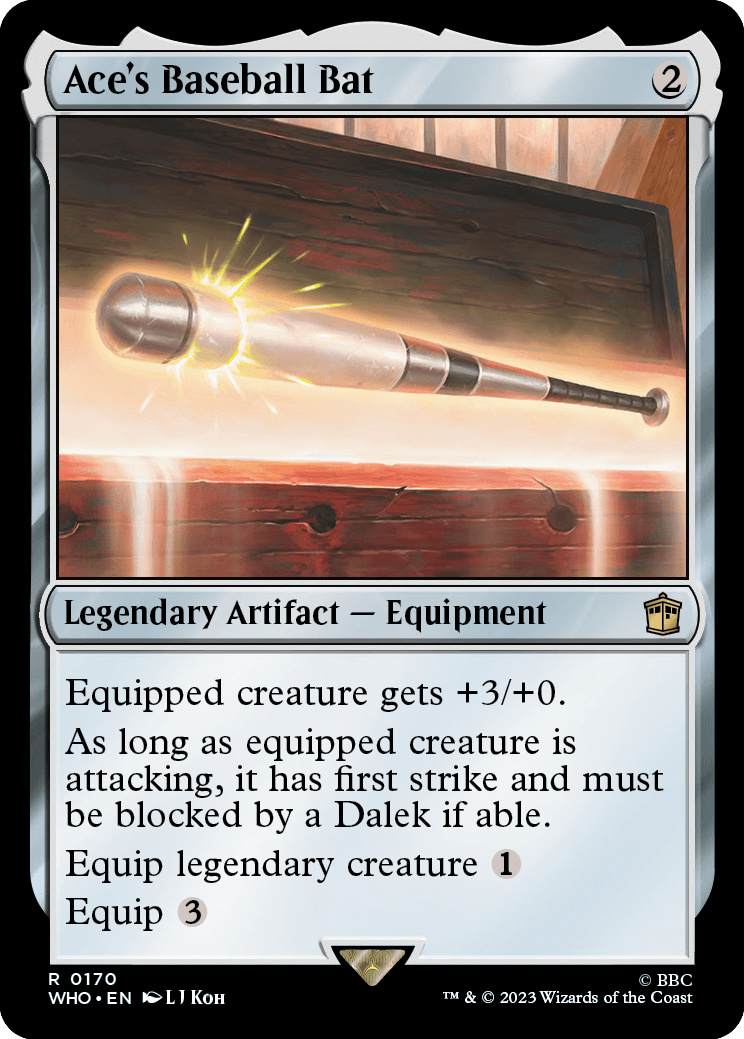
Ace's Baseball Bat
{2}
Legendary Artifact — Equipment
Equipped creature gets +3/+0.
As long as equipped creature is attacking, it has first strike and must be blocked by a Dalek if able.
Equip legendary creature {1}
Equip {3}
- Only one Dalek is required to block the equipped creature. Other Dalek and non-Dalek creatures may also block that creature and are free to block other creatures or not block at all.
- The defending player, not the attacking player, chooses which Dalek blocks the equipped creature.
- If each Dalek that could block the equipped creature is tapped or is affected by a spell or ability that says it can't block, then none of them block. If there's a cost associated with having each of those creatures block, its controller isn't forced to pay the cost, so they don't have to block in that case either.
- If one creature is somehow equipped with multiple Ace's Baseball Bats, that creature still requires only a single Dalek to block it.
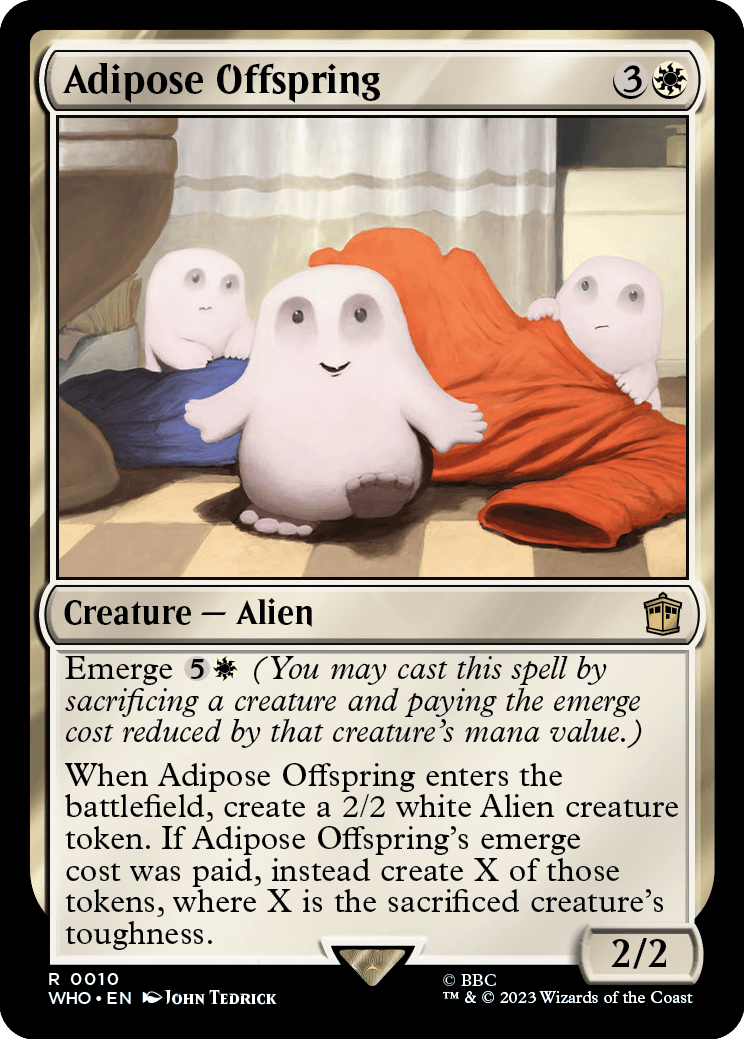
Adipose Offspring
{3}{W}
Creature — Alien
2/2
Emerge {5}{W} (You may cast this spell by sacrificing a creature and paying the emerge cost reduced by that creature's mana value.)
When Adipose Offspring enters the battlefield, create a 2/2 white Alien creature token. If Adipose Offspring's emerge cost was paid, instead create X of those tokens, where X is the sacrificed creature's toughness.
- A permanent's mana value is determined solely by the mana symbols printed in its upper right corner (unless that creature is the back face of a double-faced card, is a melded permanent, or is copying something else; see below). If the mana cost includes {X}, X is considered to be 0. If it's a single-faced card with no mana symbols in its upper right corner (because it's an animated land, for example), its mana value is 0. Ignore any alternative costs or additional costs (such as kicker) that were paid as the creature was cast.
- Colored mana components of emerge costs can't be reduced with emerge.
- You may sacrifice a creature with a mana value of 0, such as a token creature that's not a copy of another permanent, to cast a spell for its emerge cost. You'll just pay the full emerge cost with no reduction.
- You may sacrifice a creature with mana value greater than or equal to the emerge cost. If you do, you'll pay only the colored mana component of the emerge cost.
- The mana value of the back face of a transforming double-faced permanent is the mana value of its front face. The mana value of a melded permanent is the sum of the mana values of its front faces.
- The mana value of Adipose Offspring isn't affected by whether its emerge cost is paid. Its mana value is always 4.
- The creature chosen to be sacrificed is still on the battlefield up through the time that you activate mana abilities. Its abilities may affect the spell's cost, be activated to generate mana, and so on. However, if it has an ability that triggers when a spell is cast, it will have been sacrificed before that ability can trigger.
- Once you begin to cast a spell with emerge, no player may take actions until you're done. Notably, opponents can't try to remove the creature you wish to sacrifice.
- For Adipose Offspring's last ability, use the toughness of the sacrificed creature as it existed when it was last on the battlefield, which may be different from its toughness in the graveyard.
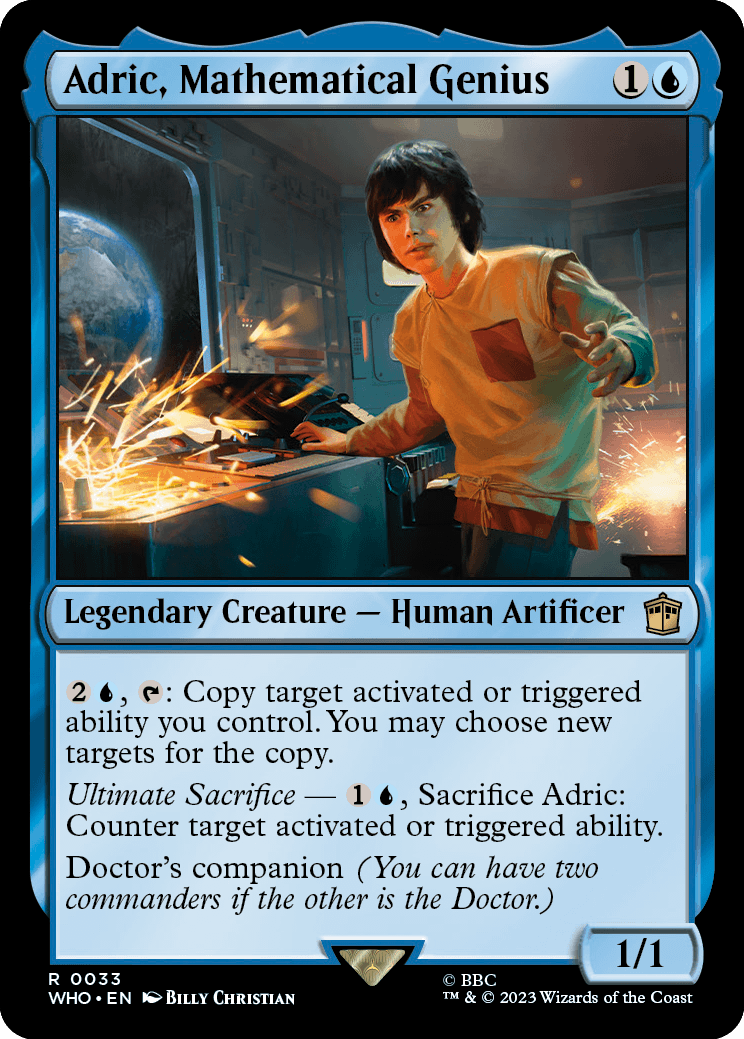
Adric, Mathematical Genius
{1}{U}
Legendary Creature — Human Artificer
1/1
{2}{U}, {T}: Copy target activated or triggered ability you control. You may choose new targets for the copy.
Ultimate Sacrifice — {1}{U}, Sacrifice Adric: Counter target activated or triggered ability.
Doctor's companion (You can have two commanders if the other is the Doctor.)
- The source of the copy from Adric, Mathematical Genius's first ability is the same as the source of the original ability.
- Activated abilities contain a colon. They're generally written "[Cost]: [Effect]." Some keyword abilities (such as equip) are activated abilities and will have a colon in their reminder text.
- Triggered abilities use the word "when," "whenever," or "at." They're often written as "[Trigger condition], [effect]." Some keywords (such as prowess) are triggered abilities and will use "when," "whenever," or "at" in their reminder text.
- Adric, Mathematical Genius's first ability targets an activated or triggered ability that is on the stack and creates another instance of that ability on the stack. It doesn't cause any object to gain an ability.
- If an ability is linked to a second ability, copies of that first ability are also linked to that second ability. If the second ability refers to "the exiled card," it refers to all cards exiled by the first ability and the copy. For example, if Fiend Hunter's enters-the-battlefield ability is copied and two creatures are exiled, they both return when Fiend Hunter leaves the battlefield.
- Adric, Mathematical Genius can copy any activated or triggered ability on the stack, not just one with targets.
- The copy is created on the stack, so it's not "activated." Creating the copy won't cause abilities that trigger when a player activates an ability to trigger. Abilities that say that a triggered ability triggers additional times won't apply to copying a triggered ability.
- The copy will resolve before the original ability does.
- The copy will have the same targets as the ability it's copying unless you choose new ones. You may change any number of the targets, including all of them or none of them. If, for one of the targets, you can't choose a new legal target, then it remains unchanged (even if the current target is illegal).
- If the ability that's copied is modal (that is, it says "Choose one —" or the like), the copy will have the same mode. A different mode can't be chosen.
- If the ability that's copied has an X whose value was determined as it was activated, the copy will have the same value of X.
- If the ability has damage divided as it was put onto the stack, the division can't be changed, although the targets receiving that damage still can. The same is true of abilities that distribute counters.
- You can't choose to pay any activation costs for the copy. However, effects based on those costs that were paid for the original ability are copied as though those same costs were paid for the copy.
- Any choices made when the ability resolves won't have been made yet when it's copied. Any such choices will be made separately when the copy resolves. Most notably, if a triggered ability asks its controller to pay a cost, you pay that cost for the copy if you wish to have it paid.
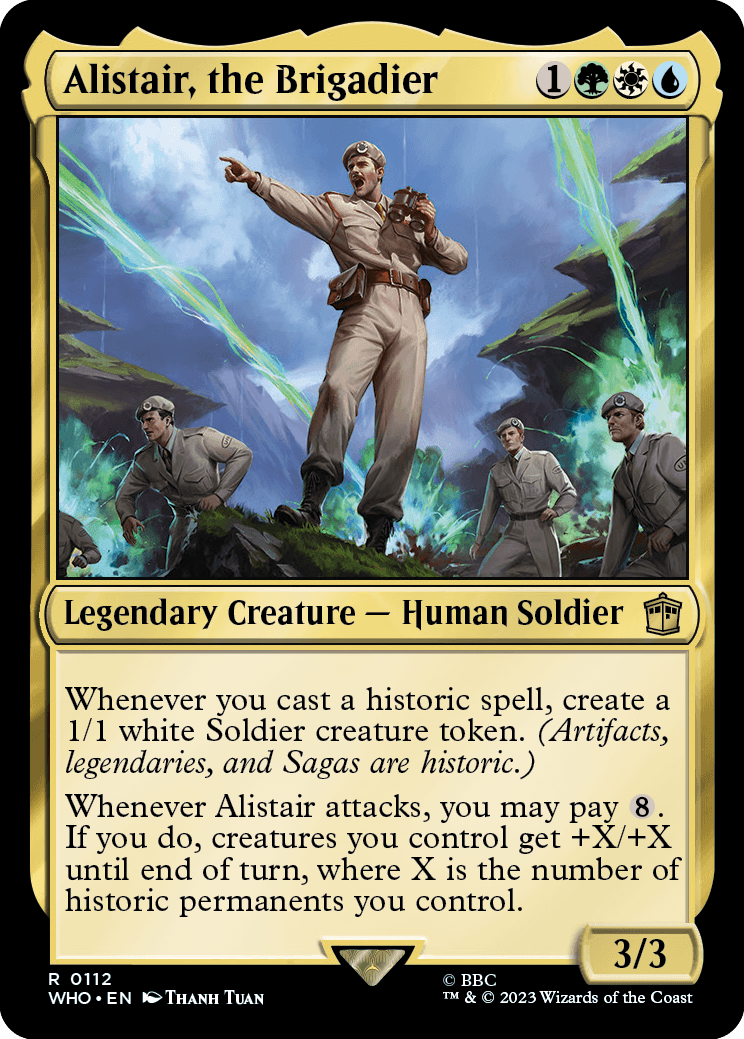
Alistair, the Brigadier
{1}{G}{W}{U}
Legendary Creature — Human Soldier
3/3
Whenever you cast a historic spell, create a 1/1 white Soldier creature token. (Artifacts, legendaries, and Sagas are historic.)
Whenever Alistair attacks, you may pay {8}. If you do, creatures you control get +X/+X until end of turn, where X is the number of historic permanents you control.
- You choose whether to pay {8} as Alistair's second ability resolves. Notably, once it begins to resolve, none of your opponents may take actions that might change the result before it happens, such as casting a spell that destroys one of your historic permanents.
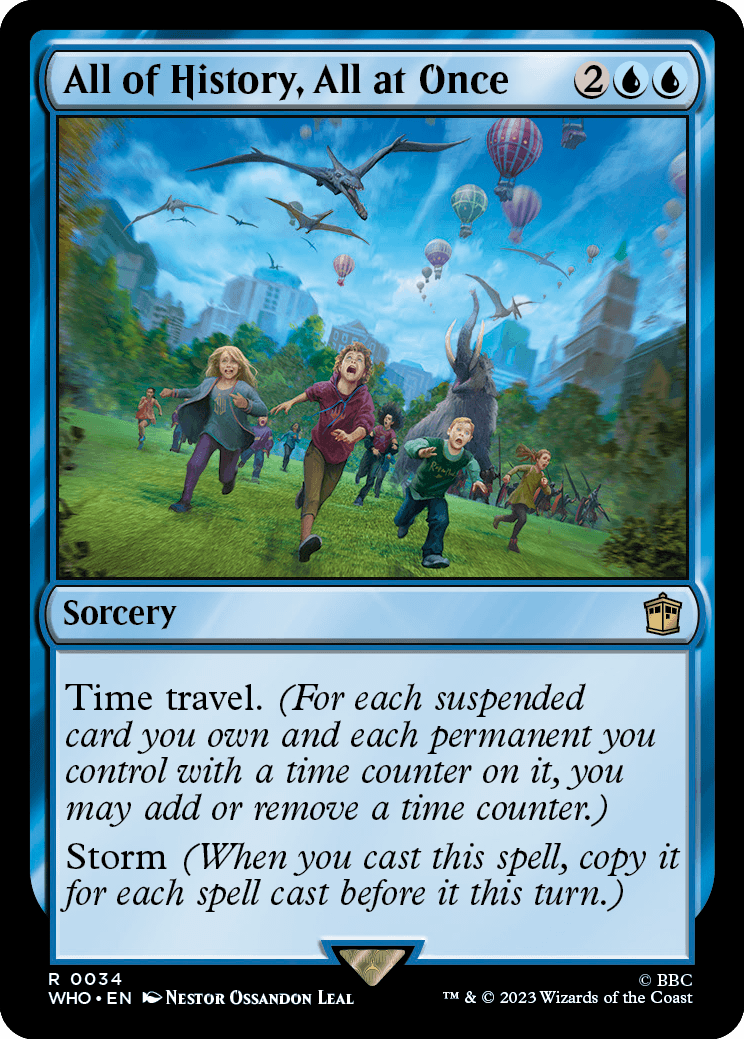
All of History, All at Once
{2}{U}{U}
Sorcery
Time travel. (For each suspended card you own and each permanent you control with a time counter on it, you may add or remove a time counter.)
Storm (When you cast this spell, copy it for each spell cast before it this turn.)
- The copies are put directly onto the stack. They aren't cast and won't be counted by other spells with storm cast later in the turn.
- Spells cast from zones other than a player's hand and spells that were countered are counted by the storm ability.
- A copy of a spell can be countered like any other spell, but each copy must be countered individually. Countering a spell with storm won't affect the copies.
- The triggered ability that creates the copies can itself be countered by anything that can counter a triggered ability. If it is countered, no copies will be put onto the stack.
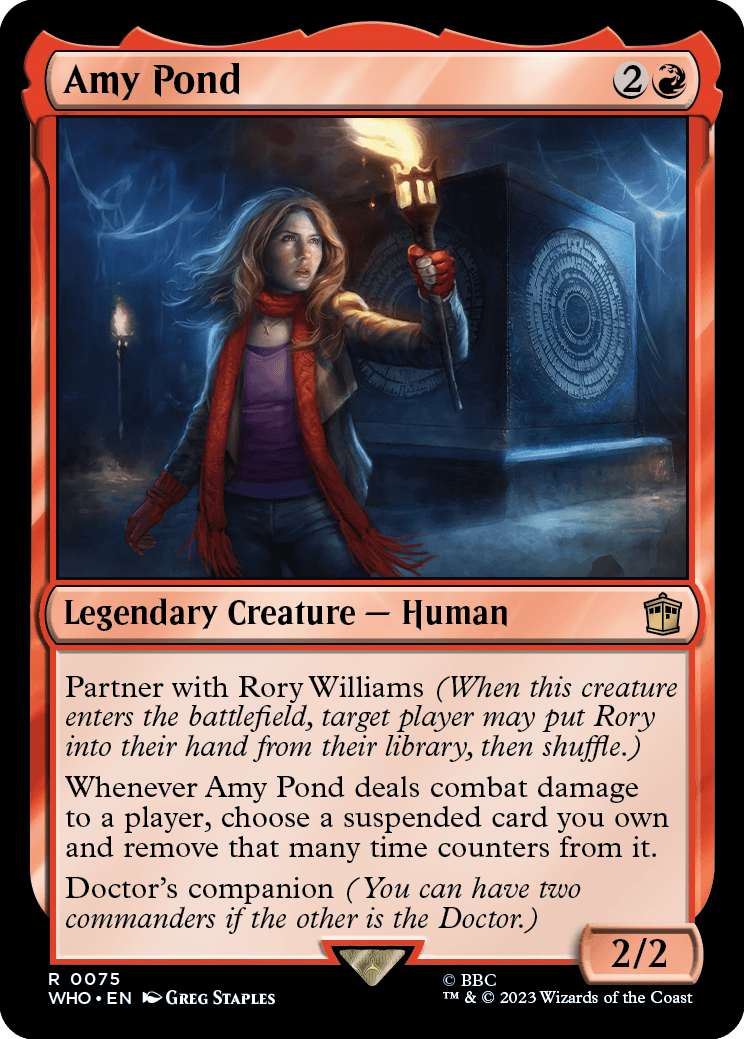
Amy Pond
{2}{R}
Legendary Creature — Human
2/2
Partner with Rory Williams (When this creature enters the battlefield, target player may put Rory into their hand from their library, then shuffle.)
Whenever Amy Pond deals combat damage to a player, choose a suspended card you own and remove that many time counters from it.
Doctor's companion (You can have two commanders if the other is the Doctor.)
- A suspended card is a card that (1) has suspend, (2) is in exile, and (3) has one or more time counters on it.
- If you remove the last time counter from a suspended card this way, you will cast that card.
- Amy Pond has two different partner abilities, but you can't have Amy, Rory, and the Doctor as your commanders at the same time. Amy must choose one of the two. Even if your other commander is one of the Doctor cards, however, the "Partner with Rory Williams" ability can still search for Rory in a library.
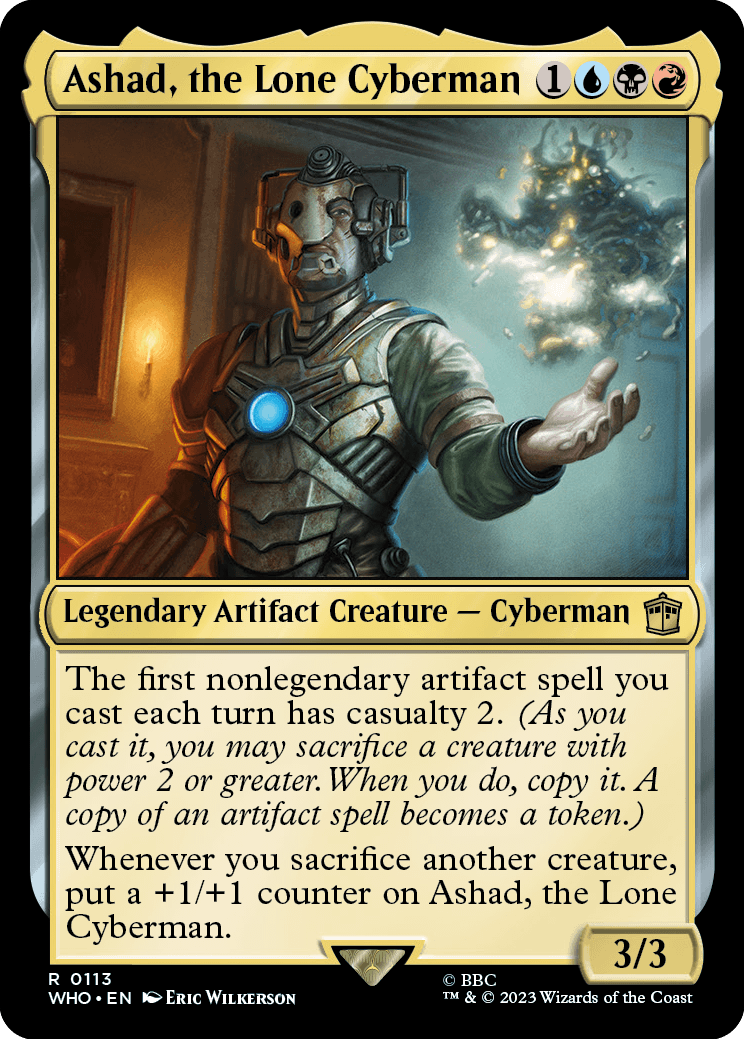
Ashad, the Lone Cyberman
{1}{U}{B}{R}
Legendary Artifact Creature — Cyberman
3/3
The first nonlegendary artifact spell you cast each turn has casualty 2. (As you cast it, you may sacrifice a creature with power 2 or greater. When you do, copy it. A copy of an artifact spell becomes a token.)
Whenever you sacrifice another creature, put a +1/+1 counter on Ashad, the Lone Cyberman.
- Casualty 2 means "As an additional cost to cast this spell, you may sacrifice a creature with power 2 or greater." and "When you cast this spell, if a casualty cost was paid for it, copy it. If the spell has any targets, you may choose new targets for the copy."
- You may sacrifice only one creature to pay a spell's casualty cost, and you copy the spell only once.
- If you pay the casualty cost of a spell, the copy will resolve before the original spell.
- The copy of the spell is created on the stack, so it's not "cast." Abilities that trigger when a player casts a spell won't trigger.
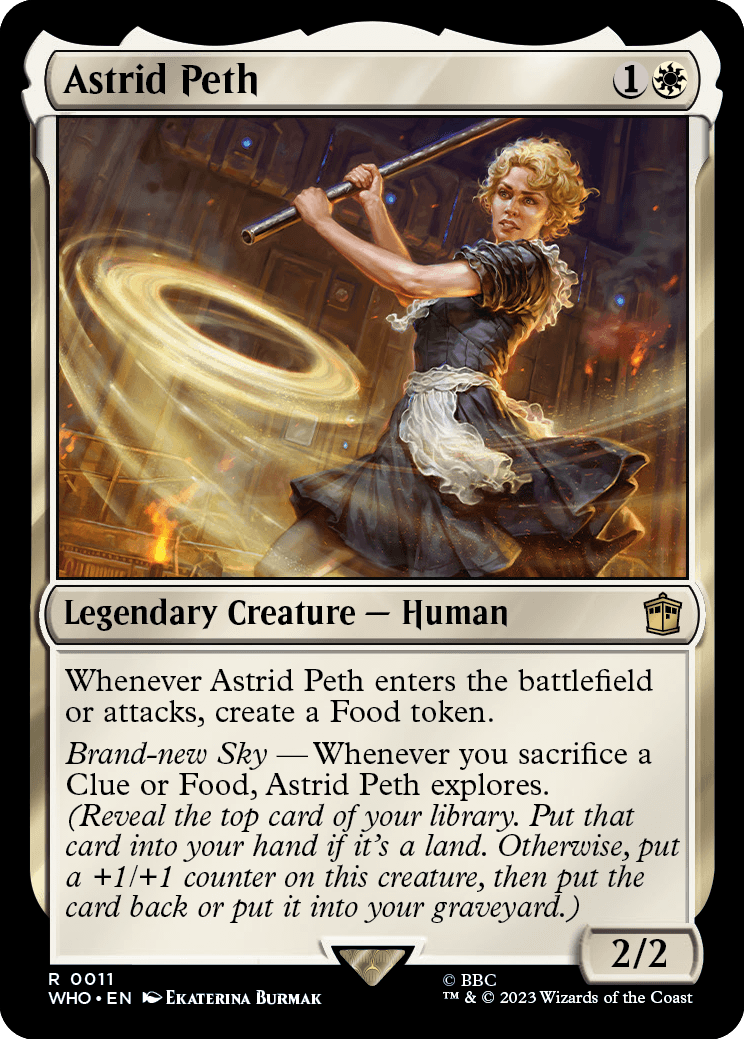
Astrid Peth
{1}{W}
Legendary Creature — Human
2/2
Whenever Astrid Peth enters the battlefield or attacks, create a Food token.
Brand-new Sky — Whenever you sacrifice a Clue or Food, Astrid Peth explores. (Reveal the top card of your library. Put that card into your hand if it's a land. Otherwise, put a +1/+1 counter on this creature, then put the card back or put it into your graveyard.)
- Once an ability that causes a creature to explore begins to resolve, no player may take any other actions until it's done. Notably, opponents can't try to remove the exploring creature after you reveal a nonland card but before it receives a counter.
- If no card is revealed, most likely because that player's library is empty, the exploring creature receives a +1/+1 counter.
- If a resolving spell or ability instructs a specific creature to explore but that creature has left the battlefield, the creature still explores. If you reveal a nonland card this way, you won't put a +1/+1 counter on anything, but you may put the revealed card into your graveyard. Effects that trigger "whenever a creature you control explores" trigger if appropriate.
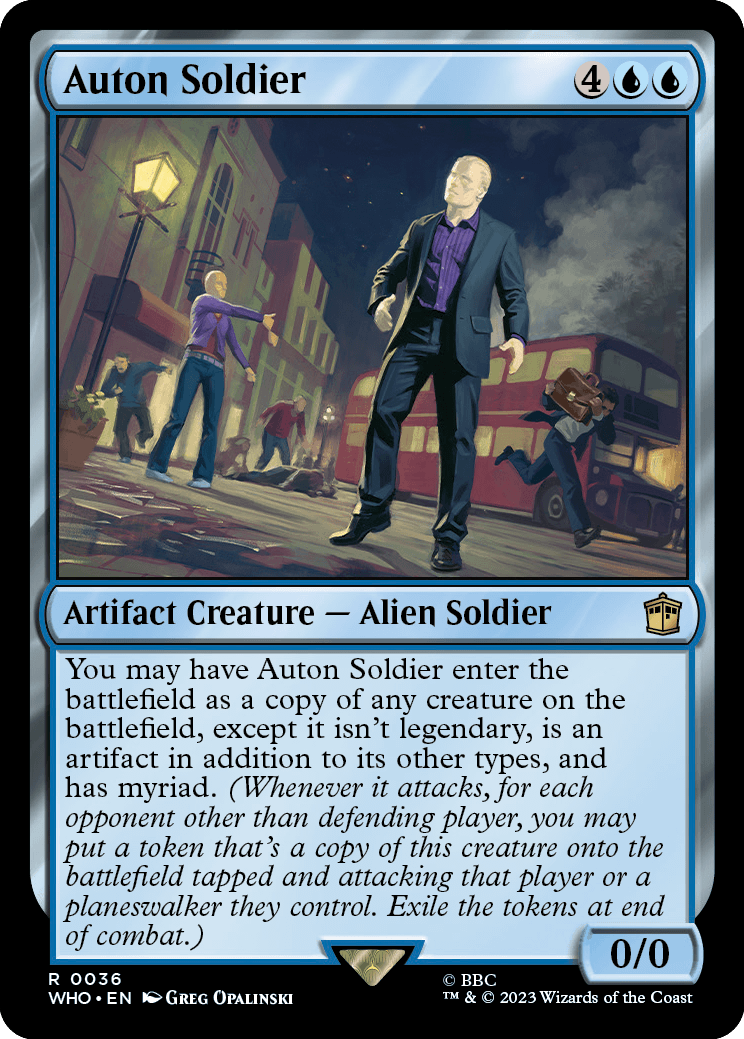
Auton Soldier
{4}{U}{U}
Artifact Creature — Alien Soldier
0/0
You may have Auton Soldier enter the battlefield as a copy of any creature on the battlefield, except it isn't legendary, is an artifact in addition to its other types, and has myriad. (Whenever it attacks, for each opponent other than defending player, you may put a token that's a copy of this creature onto the battlefield tapped and attacking that player or a planeswalker they control. Exile the tokens at end of combat.)
- The term "defending player" in the myriad rules (or any other ability of an attacking creature) refers to the player the creature with myriad was attacking at the time it became an attacking creature this combat, or the controller of the planeswalker or protector of the battle the creature was attacking at the time it became an attacking creature this combat.
- If the defending player is your only opponent, no tokens are put onto the battlefield.
- You choose whether each token is attacking the player or a planeswalker they control as the token is created.
- Although the tokens enter the battlefield attacking, they were never declared as attackers. Abilities that trigger whenever a creature attacks won't trigger, including the myriad ability of the tokens. If there any costs to have a creature attack, those costs won't apply to the tokens.
- The tokens all enter the battlefield at the same time.
- Each token created by the myriad ability will be a copy of whatever Auton Soldier is copying, along with the listed exceptions. However, it doesn't copy whether Auton Soldier is tapped or untapped, whether it has any counters on it or Auras and Equipment attached to it, or any non-copy effects that have changed its power, toughness, types, color, and so on.
- Any enters-the-battlefield abilities of the copied creature will trigger when the token enters the battlefield. Any "as [this permanent] enters the battlefield" or "[this permanent] enters the battlefield with" abilities of the copied creature will also work.
- If myriad creates more than one token for any given player (due to an effect such as the one Doubling Season creates), you may choose separately for each token whether it's attacking the player or a planeswalker they control.
- If you choose not to have Auton Soldier enter the battlefield as a copy of another creature, it won't have myriad. It will also probably die due to having 0 toughness.
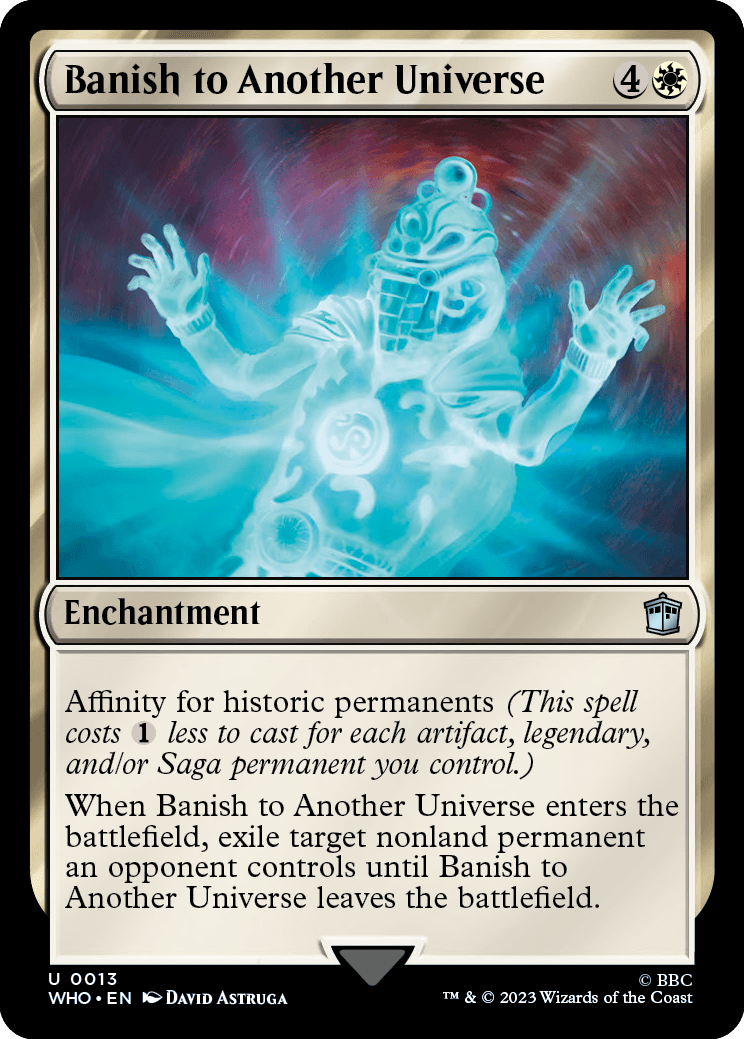
Banish to Another Universe
{4}{W}
Enchantment
Affinity for historic permanents (This spell costs {1} less to cast for each artifact, legendary, and/or Saga permanent you control.)
When Banish to Another Universe enters the battlefield, exile target nonland permanent an opponent controls until Banish to Another Universe leaves the battlefield.
- If Banish to another Universe leaves the battlefield before its triggered ability resolves, the target permanent will not be exiled.
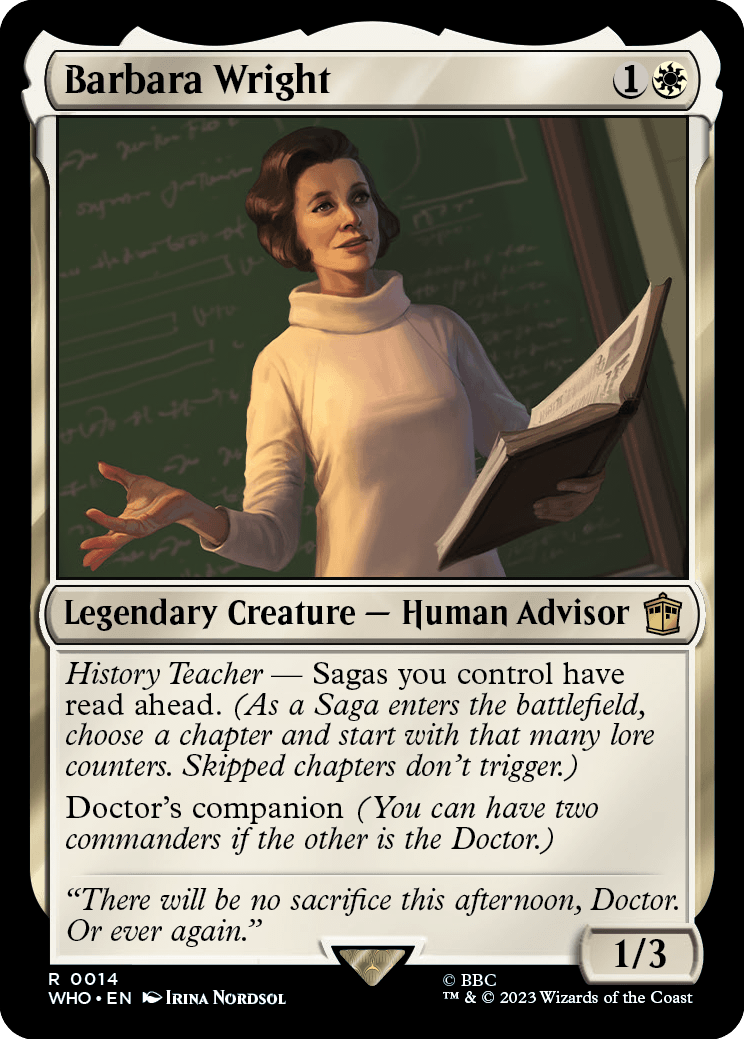
Barbara Wright
{1}{W}
Legendary Creature — Human Advisor
1/3
History Teacher — Sagas you control have read ahead. (As a Saga enters the battlefield, choose a chapter and start with that many lore counters. Skipped chapters don't trigger.)
Doctor's companion (You can have two commanders if the other is the Doctor.)
- As a Saga with read ahead enters the battlefield, its controller chooses a number from one to that Saga's greatest chapter number. The Saga enters the battlefield with the chosen number of lore counters. Neither choosing the number nor putting the counters on the Saga use the stack, and neither can be responded to.
- Having multiple instances of read ahead doesn't cause anything unusual to happen. It functions the same way as having one instance of read ahead.
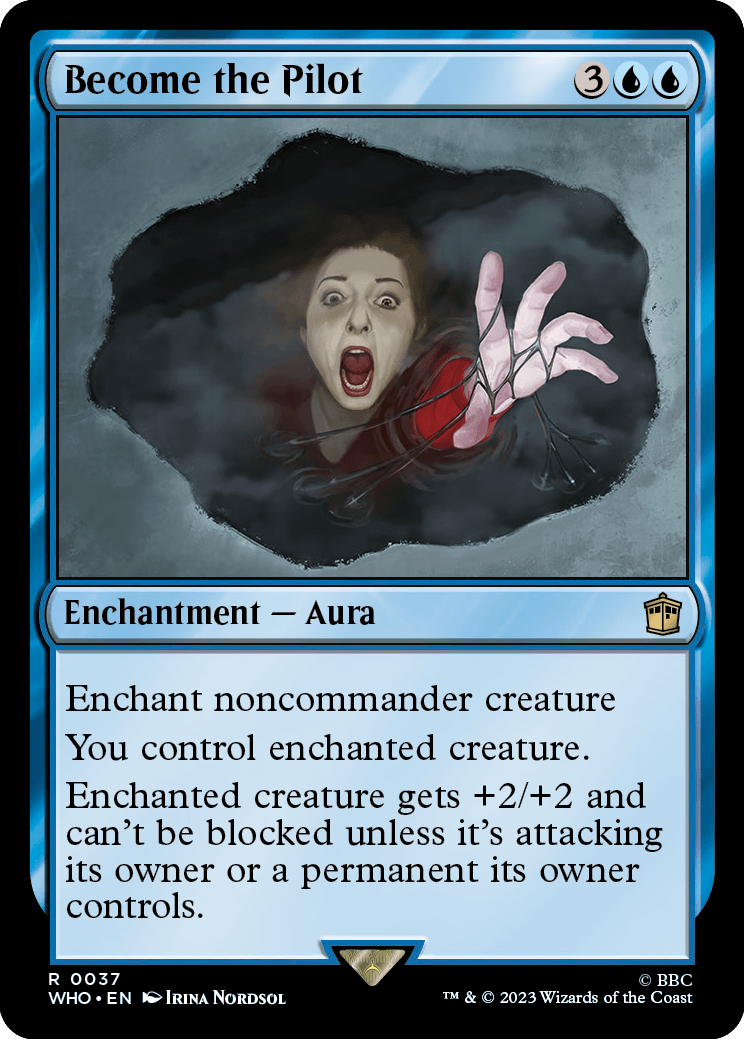
Become the Pilot
{3}{U}{U}
Enchantment — Aura
Enchant noncommander creature
You control enchanted creature.
Enchanted creature gets +2/+2 and can't be blocked unless it's attacking its owner or a permanent its owner controls.
- Only planeswalker and battle permanents can be attacked. Other permanents, such as creatures, can't be attacked.
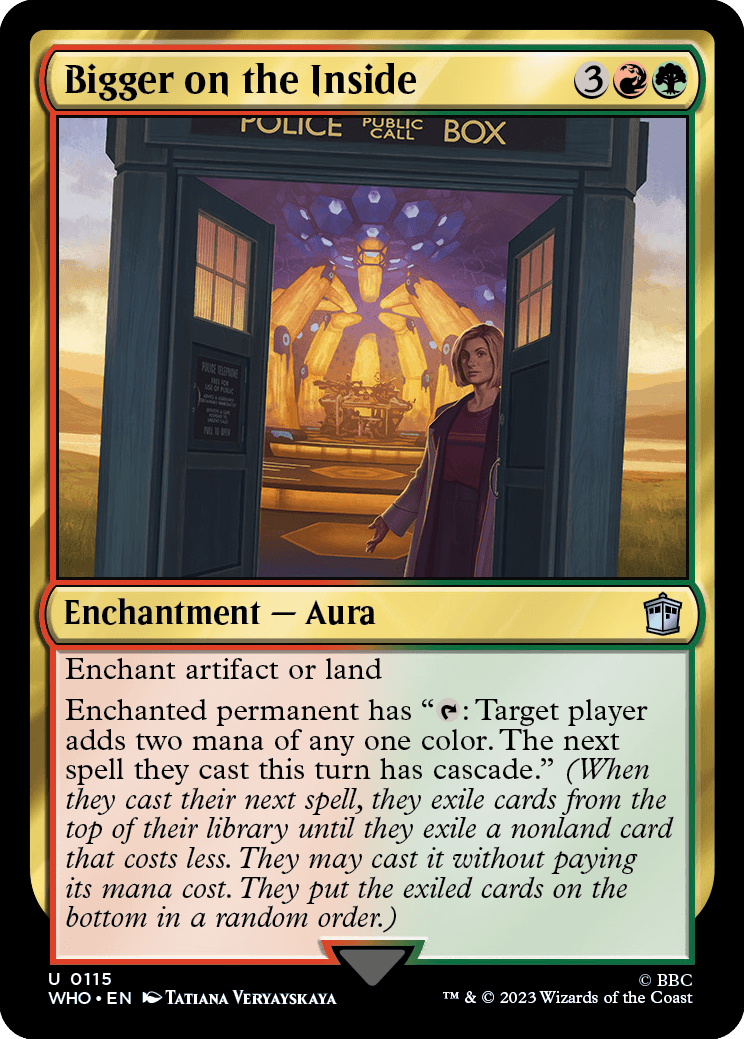
Bigger on the Inside
{3}{R}{G}
Enchantment — Aura
Enchant artifact or land
Enchanted permanent has "{T}: Target player adds two mana of any one color. The next spell they cast this turn has cascade." (When they cast their next spell, they exile cards from the top of their library until they exile a nonland card that costs less. They may cast it without paying its mana cost. They put the exiled cards on the bottom in a random order.)
- As the activated ability resolves, it creates a continuous effect that won't begin to apply until the targeted player starts casting a spell this turn. It applies to that spell and the timestamp of that effect is the time that the spell was put on the stack.
- If a spell has multiple instances of cascade, each one triggers separately.
- A spell's mana value is determined only by its mana cost. Ignore any alternative costs, additional costs, cost increases, or cost reductions.
- Cascade triggers when you cast the spell, meaning that it resolves before that spell. If you end up casting the exiled card, it will go on the stack above the spell with cascade.
- When the cascade ability resolves, you must exile cards. The only optional part of the ability is whether or not you cast the last card exiled.
- If a spell with cascade is countered, the cascade ability will still resolve normally.
- You exile the cards face up. All players will be able to see them.
- If you cast a card "without paying its mana cost," you can't choose to cast it for any alternative costs. You can, however, pay additional costs. If the card has any mandatory additional costs, you must pay those to cast the card.
- If the card has {X} in its mana cost, you must choose 0 as the value of X when casting it without paying its mana cost.
- Some cards, such as modal double-faced cards or adventurer cards, can be cast as one of two different spells, each with different mana costs. If the card you're casting as the cascade ability resolves is one of those cards, you may choose to cast it as either of those spells that has a lower mana value than the spell with cascade.
- The mana value of a split card is determined by the combined mana cost of its two halves. If cascade allows you to cast a split card, you may cast either half but not both halves (unless the card has fuse).
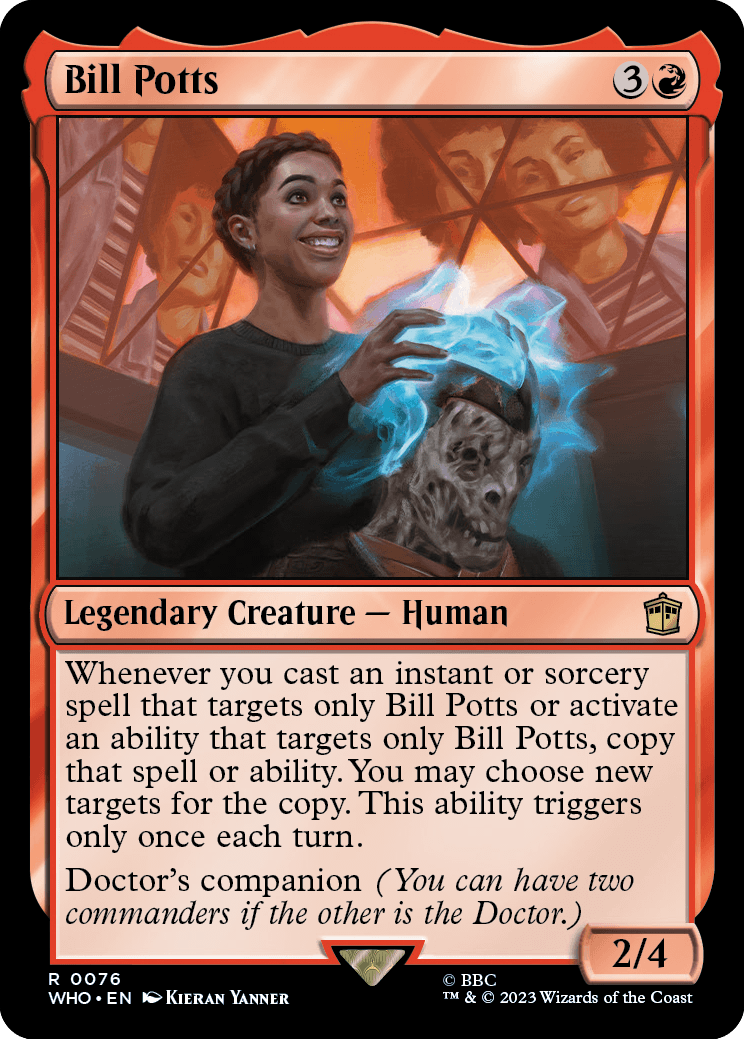
Bill Potts
{3}{R}
Legendary Creature — Human
2/4
Whenever you cast an instant or sorcery spell that targets only Bill Potts or activate an ability that targets only Bill Potts, copy that spell or ability. You may choose new targets for the copy. This ability triggers only once each turn.
Doctor's companion (You can have two commanders if the other is the Doctor.)
- The first ability of Bill Potts will trigger as long as it is the only target of that spell or ability, even if that spell or ability could target multiple permanents.
- The copy will have the same targets as the spell or ability it's copying unless you choose new ones. You may change any number of the targets, including all of them or none of them. The new targets must be legal.
- If the spell or ability that's copied is modal (that is, it says "Choose one —" or the like), the copy will have the same mode or modes. You can't choose different ones.
- If the spell or ability that's copied has an X whose value was determined as it was cast, the copy will have the same value of X.
- You can't choose to pay any additional costs for the copy. However, effects based on any additional costs that were paid for the original spell are copied as though those same costs were paid for the copy too.
- The copy made by Bill's triggered ability is created on the stack, so it's not "cast" or "activated."
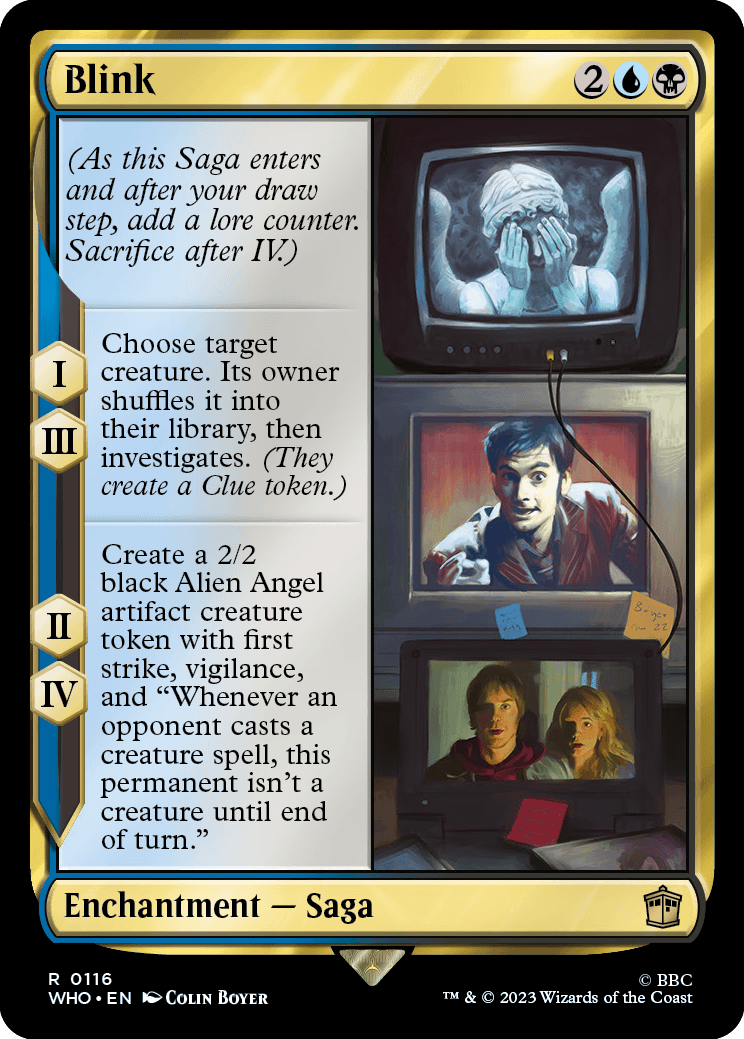
Blink
{2}{U}{B}
Enchantment — Saga
(As this Saga enters and after your draw step, add a lore counter. Sacrifice after IV.)
I, III — Choose target creature. Its owner shuffles it into their library, then investigates. (They create a Clue token.)
II, IV — Create a 2/2 black Alien Angel artifact creature token with first strike, vigilance, and "Whenever an opponent casts a creature spell, this permanent isn't a creature until end of turn."
- People often assume that Sagas are a strict progression from top to bottom, but actually, from a non-linear, non-subjective viewpoint, it's more like a big ball of wibbly wobbly, timey-wimey . . . stuff. That is, the rules support chapter abilities that appear to be out of order, like those on Blink. The first ability triggers when the first and third lore counters are added. The last ability triggers when the second and fourth lore counters are placed on it.
- As the triggered ability of the Alien Angel token resolves, it continues to be an artifact but will stop being both an Alien and an Angel until it becomes a creature again.
- If an opponent casts a creature spell with flash while the token is attacking or blocking, the token is removed from combat because it stops being a creature. However, any creatures that it was blocking are still considered blocked.
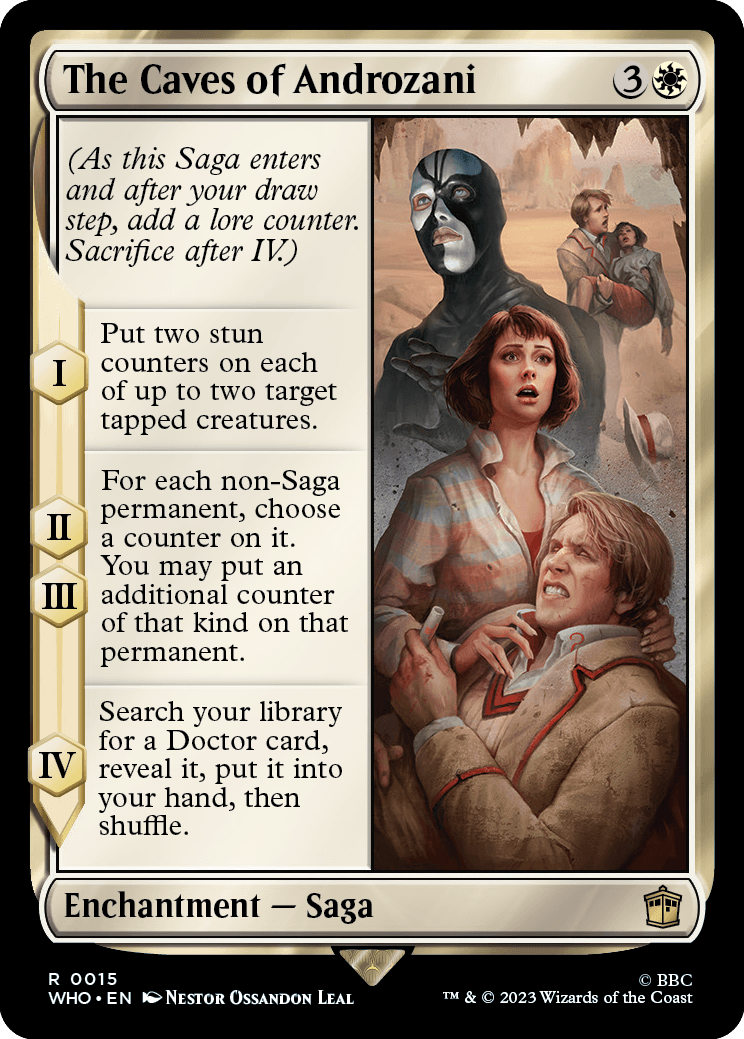
The Caves of Androzani
{3}{W}
Enchantment — Saga
(As this Saga enters and after your draw step, add a lore counter. Sacrifice after IV.)
I — Put two stun counters on each of up to two target tapped creatures.
II, III — For each non-Saga permanent, choose a counter on it. You may put an additional counter of that kind on that permanent.
IV — Search your library for a Doctor card, reveal it, put it into your hand, then shuffle.
- The last ability of the Caves of Androzani can find any card with the Doctor creature type, not cards with the word "Doctor" in the name.
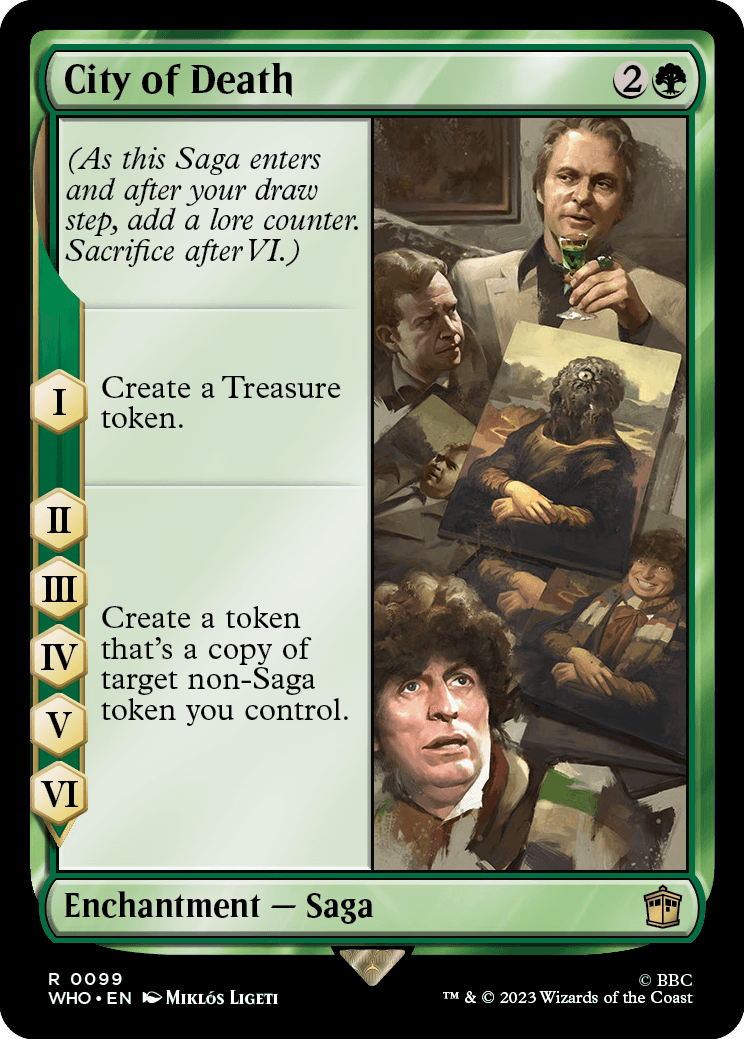
City of Death
{2}{G}
Enchantment — Saga
(As this Saga enters and after your draw step, add a lore counter. Sacrifice after VI.)
I — Create a Treasure token.
II, III. IV, V, VI — Create a token that's a copy of target non-Saga token you control.
- The token you create copies the original characteristics of the token as stated by the effect that created that token, (unless that token is copying something else; see below). It doesn't copy whether that token is tapped or untapped, whether it has any counters on it or Auras and Equipment attached to it, or any non-copy effects that have changed its power, toughness, types, color, or so on.
- If the copied token has {X} in its mana cost, X is considered to be 0.
- If the copied token is copying something else (for example, if the copied token is one previously created by this ability), then the token enters the battlefield as whatever that token copied.
- Any enters-the-battlefield abilities of the copied token will trigger when the token enters the battlefield. Any "as [this permanent] enters the battlefield" or "[this permanent] enters the battlefield with" abilities of the chosen token will also work.
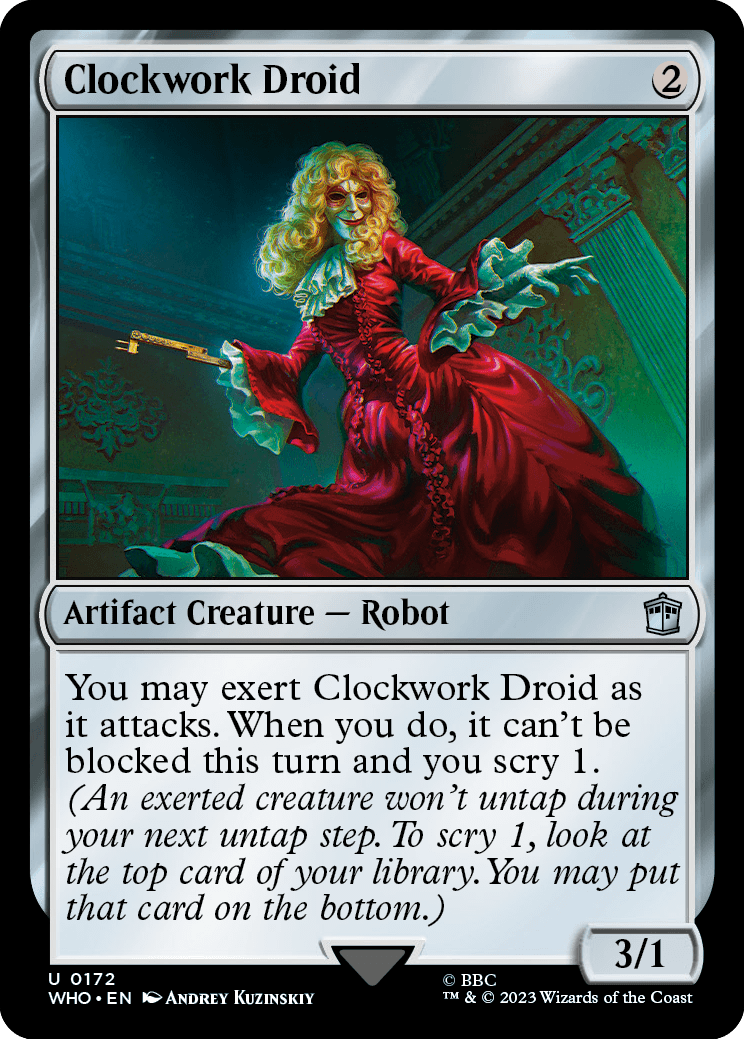
Clockwork Droid
{2}
Artifact Creature — Robot
3/1
You may exert Clockwork Droid as it attacks. When you do, it can't be blocked this turn and you scry 1. (An exerted creature won't untap during your next untap step. To scry 1, look at the top card of your library. You may put that card on the bottom.)
- You can't exert a creature unless an effect allows you to do so. Similar effects that "tap and freeze" a creature don't exert that creature.
- If an exerted creature is already untapped during your next untap step (most likely because it had vigilance or an effect untapped it), exert's effect preventing it from untapping expires without having done anything.
- If you gain control of another player's creature until end of turn and exert it, and then that player regains control of it, it will untap during that player's untap step.
- You may exert Clockwork Droid only as you attack with it. You can't do so later in combat, and creatures put onto the battlefield attacking can't be exerted. The ability that triggers on exerting it will resolve before blockers are declared.
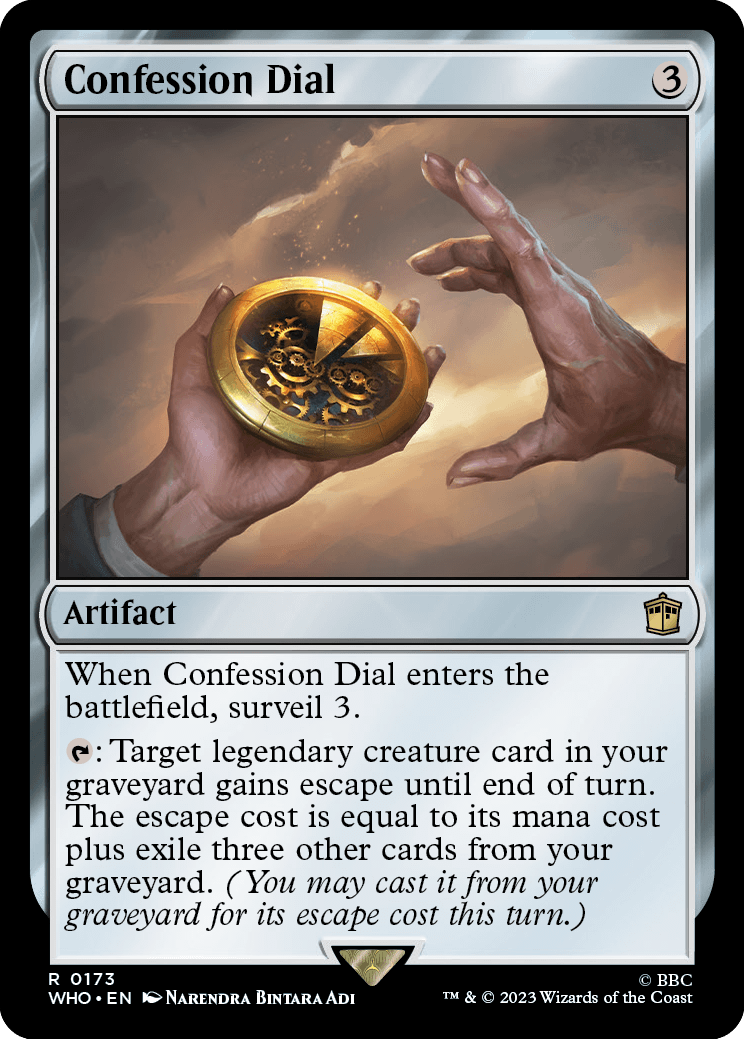
Confession Dial
{3}
Artifact
When Confession Dial enters the battlefield, surveil 3.
{T}: Target legendary creature card in your graveyard gains escape until end of turn. The escape cost is equal to its mana cost plus exile three other cards from your graveyard. (You may cast it from your graveyard for its escape cost this turn.)
- If a spell you're casting with escape has an additional cost of discarding cards or sacrificing permanents, you may exile cards discarded or sacrificed this way to pay that part of its escape cost.
- Escape's permission doesn't change when you may cast the spell from your graveyard.
- To determine the total cost of a spell, start with the mana cost or alternative cost you're paying (such as an escape cost), add any cost increases, then apply any cost reductions. The mana value of the spell remains unchanged, no matter what the total cost to cast it was and no matter whether an alternative cost was paid.
- After an escaped permanent spell resolves, it enters the battlefield and will return to its owner's graveyard if it dies later.
- If a card has multiple abilities giving you permission to cast it, such as two escape abilities or an escape ability and a flashback ability, you choose which one to apply. The others have no effect.
- If you cast a spell with its escape permission, you can't choose to apply any other alternative costs or to cast it without paying its mana cost. You may pay any optional additional costs the spell has, such as kicker costs. If it has any mandatory additional costs, you must pay those.
- Once you begin casting a spell with escape, it immediately moves to the stack. Players can't take any other actions until you're done casting the spell.
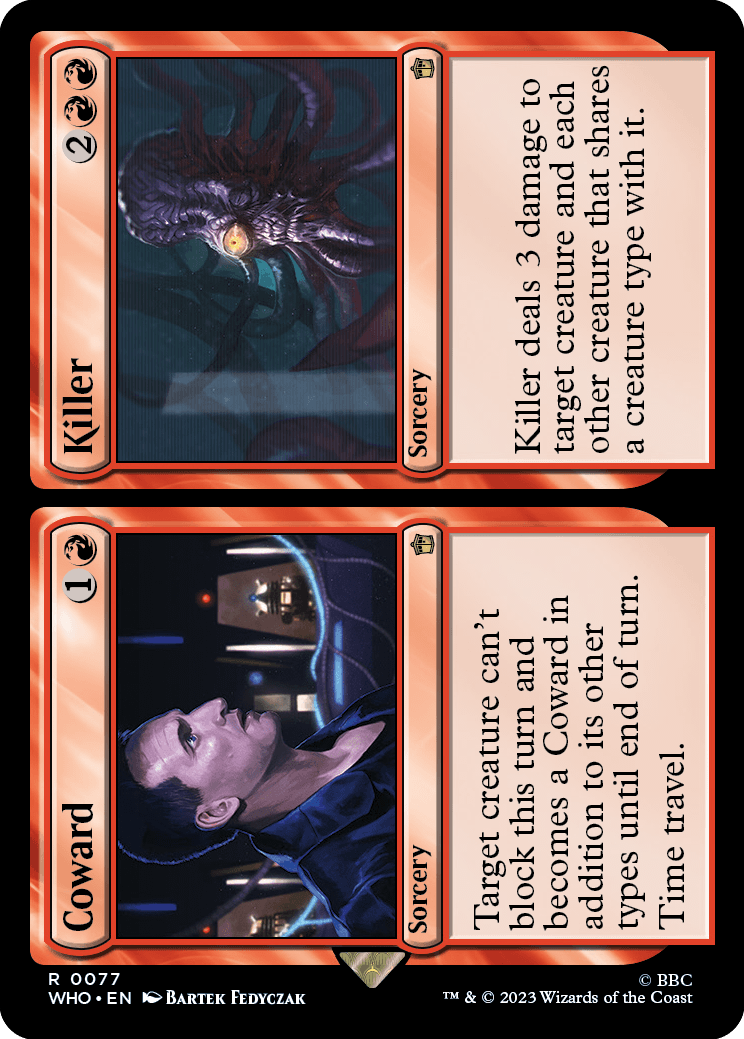
Coward // Killer
{1}{R}
Sorcery
Target creature can't block this turn and becomes a Coward in addition to its other types until end of turn.
Time travel.
//
Killer
{2}{R}{R}
Sorcery
Killer deals 3 damage to target creature and each other creature that shares a creature type with it.
- If the target of Killer is illegal as the spell tries to resolve, it won't deal damage to any creatures.
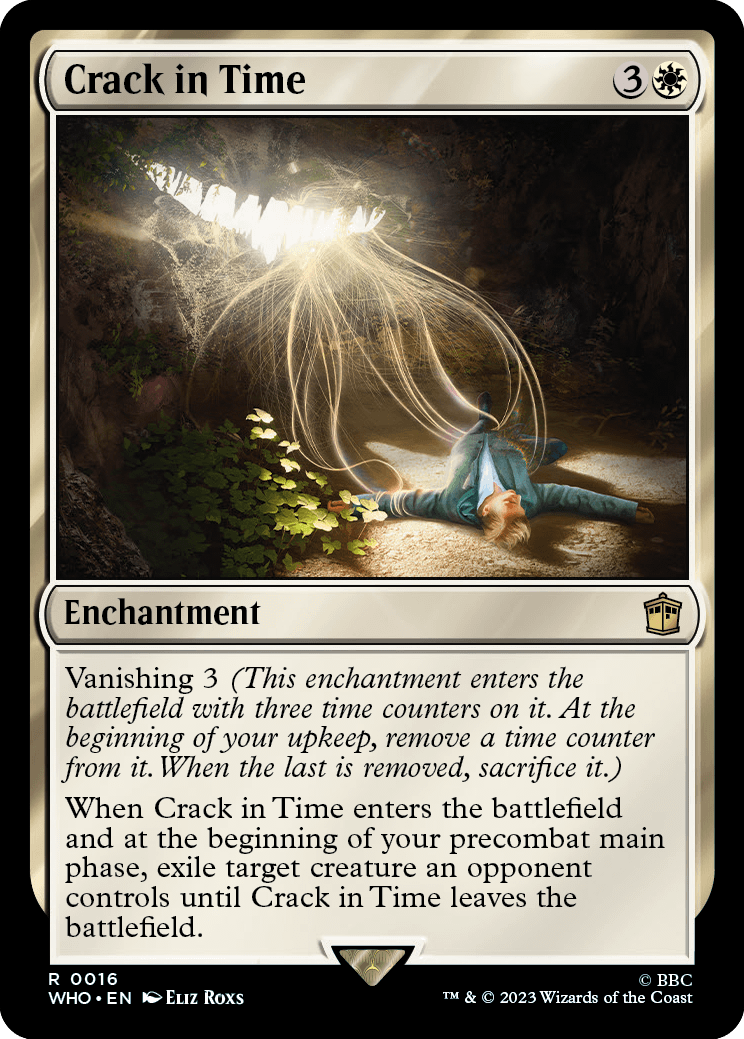
Crack in Time
{3}{W}
Enchantment
Vanishing 3 (This enchantment enters the battlefield with three time counters on it. At the beginning of your upkeep, remove a time counter from it. When the last is removed, sacrifice it.)
When Crack in Time enters the battlefield and at the beginning of your precombat main phase, exile target creature an opponent controls until Crack in Time leaves the battlefield.
- If Crack in Time leaves the battlefield before its triggered ability resolves, the target creature won't be exiled.
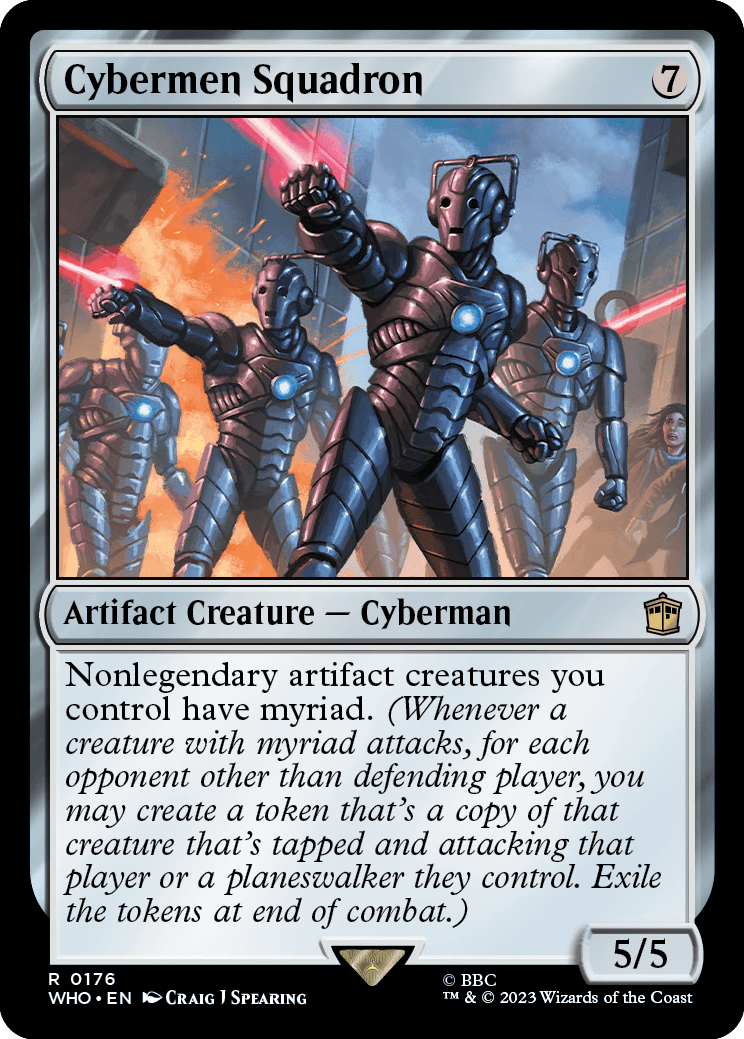
Cybermen Squadron
{7}
Artifact Creature — Cyberman
5/5
Nonlegendary artifact creatures you control have myriad. (Whenever a creature with myriad attacks, for each opponent other than defending player, you may create a token that's a copy of that creature that's tapped and attacking that player or a planeswalker they control. Exile the tokens at end of combat.)
- Cybermen Squadron will itself have myriad as long as it remains a nonlegendary artifact creature.
- The term "defending player" in the myriad rules (or any other ability of an attacking creature) refers to the player the creature with myriad was attacking at the time it became an attacking creature this combat, or the controller of the planeswalker or the protector of the battle the creature was attacking at the time it became an attacking creature this combat.
- If the defending player is your only opponent, no tokens are put onto the battlefield.
- You choose whether each token is attacking the player or a planeswalker they control as the token is created.
- Although the tokens enter the battlefield attacking, they were never declared as attackers. Abilities that trigger whenever a creature attacks won't trigger, including the myriad ability of the tokens. If there any costs to have a creature attack, those costs won't apply to the tokens.
- The token creatures all enter the battlefield at the same time.
- Each token copies exactly what was printed on the original creature and nothing else. It doesn't copy whether that creature is tapped or untapped, whether it has any counters on it or Auras and Equipment attached to it, or any non-copy effects that have changed its power, toughness, types, color, and so on.
- Any enters-the-battlefield abilities of the copied creature will trigger when the token enters the battlefield. Any "as [this permanent] enters the battlefield" or "[this permanent] enters the battlefield with" abilities of the copied creature will also work.
- If myriad creates more than one token for any given player (due to an effect such as the one Doubling Season creates), you may choose separately for each token whether it's attacking the player or a planeswalker they control.
- Multiple instances of myriad trigger separately.
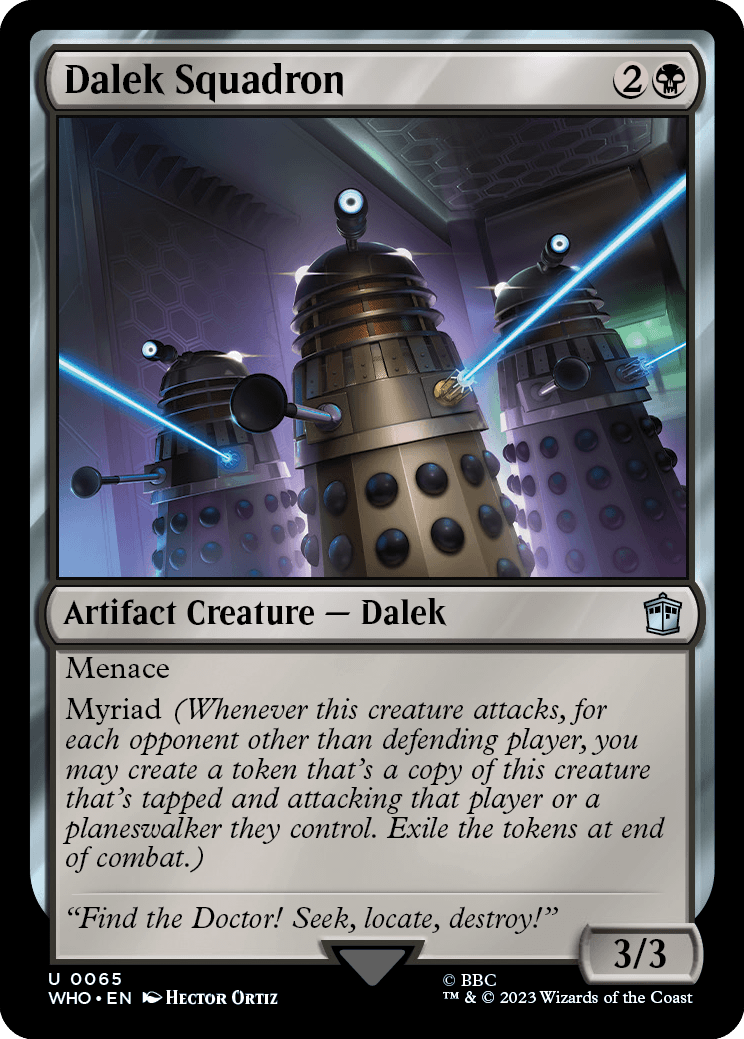
Dalek Squadron
{2}{B}
Artifact Creature — Dalek
3/3
Menace
Myriad (Whenever this creature attacks, for each opponent other than defending player, you may create a token that's a copy of this creature that's tapped and attacking that player or a planeswalker they control. Exile the tokens at end of combat.)
- The term "defending player" in the myriad rules (or any other ability of an attacking creature) refers to the player the creature with myriad was attacking at the time it became an attacking creature this combat, or the controller of the planeswalker or the protector of the battle the creature was attacking at the time it became an attacking creature this combat.
- If the defending player is your only opponent, no tokens are put onto the battlefield.
- You choose whether each token is attacking the player or a planeswalker they control as the token is created.
- Although the tokens enter the battlefield attacking, they were never declared as attackers. Abilities that trigger whenever a creature attacks won't trigger, including the myriad ability of the tokens. If there any costs to have a creature attack, those costs won't apply to the tokens.
- The token creatures all enter the battlefield at the same time.
- Each token copies exactly what was printed on the original creature and nothing else. It doesn't copy whether that creature is tapped or untapped, whether it has any counters on it or Auras and Equipment attached to it, or any non-copy effects that have changed its power, toughness, types, color, and so on.
- Any enters-the-battlefield abilities of the copied creature will trigger when the token enters the battlefield. Any "as [this permanent] enters the battlefield" or "[this permanent] enters the battlefield with" abilities of the copied creature will also work.
- If myriad creates more than one token for any given player (due to an effect such as the one Doubling Season creates), you may choose separately for each token whether it's attacking the player or a planeswalker they control.
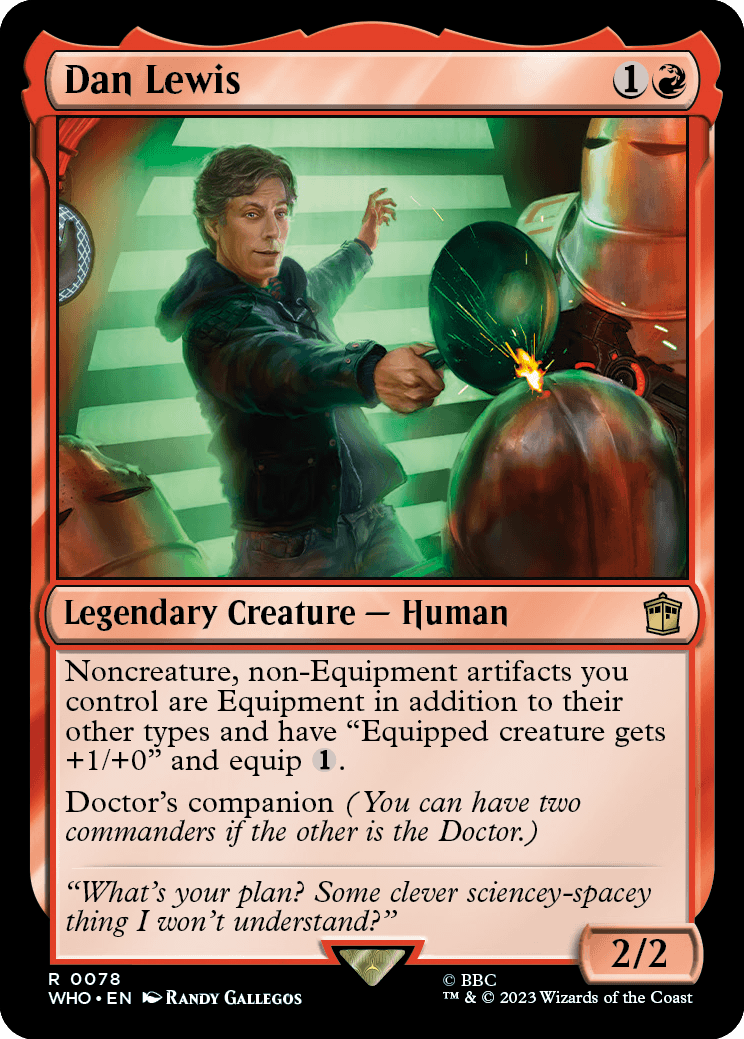
Dan Lewis
{1}{R}
Legendary Creature — Human
2/2
Noncreature, non-Equipment artifacts you control are Equipment in addition to their other types and have "Equipped creature gets +1/+0" and equip {1}.
Doctor's companion (You can have two commanders if the other is the Doctor.)
- The affected artifacts retain their other types and abilities.
- An Equipment that's also a creature can't be equipped to anything unless it has the reconfigure ability.
- If an artifact affected by Dan Lewis later becomes a creature, Dan's effect no longer applies to it. That artifact will stop being an Equipment and become unattached from any creature it was attached to; it will remain on the battlefield. The same thing happens if Dan leaves the battlefield.
- While Dan is on the battlefield, an Aura enchantment that somehow becomes an artifact in addition to its other types will also become an Equipment. Any of its abilities that refer to either "enchanted creature" or "equipped creature" refer to the creature it's currently attached to. It can be attached to other creatures using its equip ability. If you try to attach the Aura Equipment to a creature it can't legally be attached to, it remains where it is. If the creature it's attached to becomes an illegal permanent for it to enchant, the Aura Equipment will be put into its owner's graveyard as a state-based action.
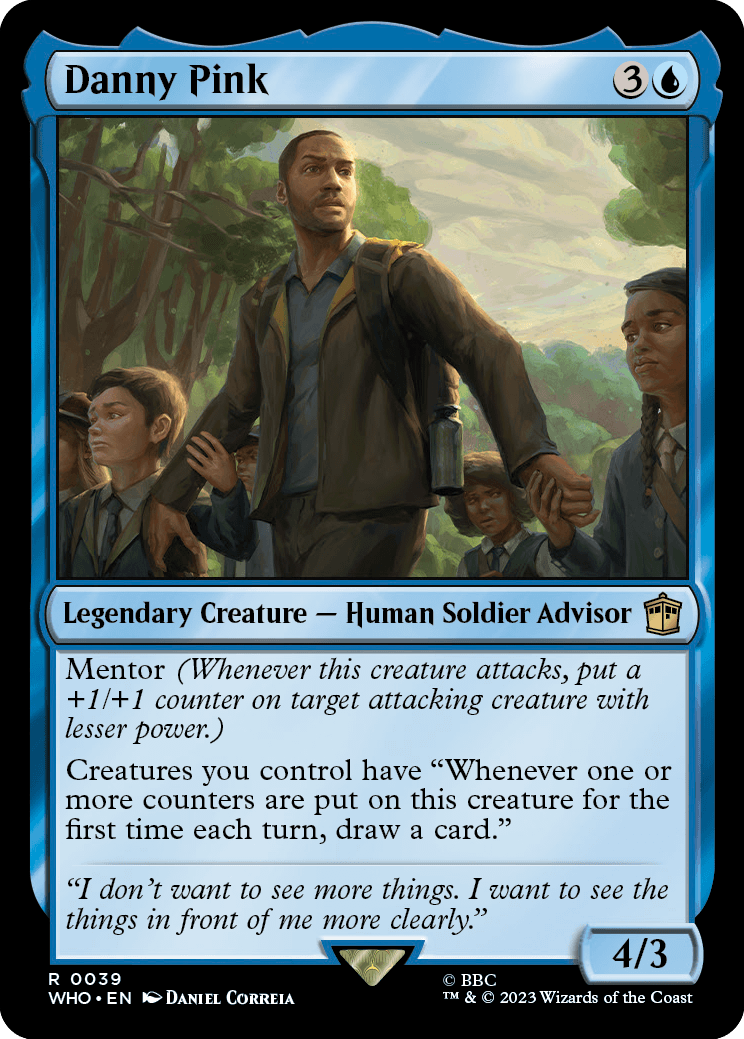
Danny Pink
{3}{U}
Legendary Creature — Human Soldier Advisor
4/3
Mentor (Whenever this creature attacks, put a +1/+1 counter on target attacking creature with lesser power.)
Creatures you control have "Whenever one or more counters are put on this creature for the first time each turn, draw a card."
- Mentor compares the power of the creature with mentor with that of the target creature at two different times: once as the triggered ability is put onto the stack, and once as the triggered ability resolves. If you wish to raise a creature's power so its mentor ability can target a bigger creature, the last chance you have to do so is during the beginning of combat step.
- If the target creature's power is no longer less than the attacking creature's power as the ability resolves, mentor doesn't add a +1/+1 counter. For example, if two 3/3 creatures with mentor attack and both mentor triggers target the same 2/2 creature, the first to resolve puts a +1/+1 counter on it and the second does nothing.
- If the creature with mentor leaves the battlefield with the mentor ability on the stack, use its power as that creature last existed on the battlefield to determine whether the target creature has lesser power.
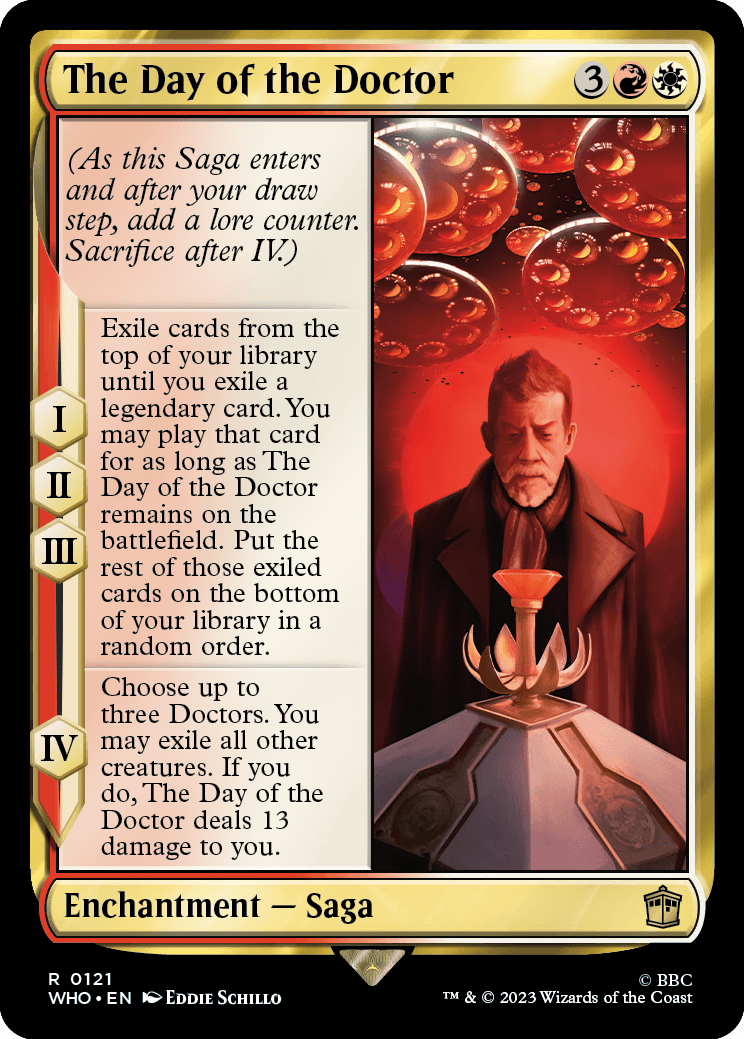
The Day of the Doctor
{3}{R}{W}
Enchantment — Saga
(As this Saga enters and after your draw step, add a lore counter. Sacrifice after IV.)
I, II, III — Exile cards from the top of your library until you exile a legendary card. You may play that card for as long as The Day of the Doctor remains on the battlefield. Put the rest of those exiled cards on the bottom of your library in a random order.
IV — Choose up to three Doctors. You may exile all other creatures. If you do, The Day of the Doctor deals 13 damage to you.
- As the last chapter ability resolves, you may choose to exile all other creatures even if you didn't choose any Doctors. In that case, all creatures are exiled.
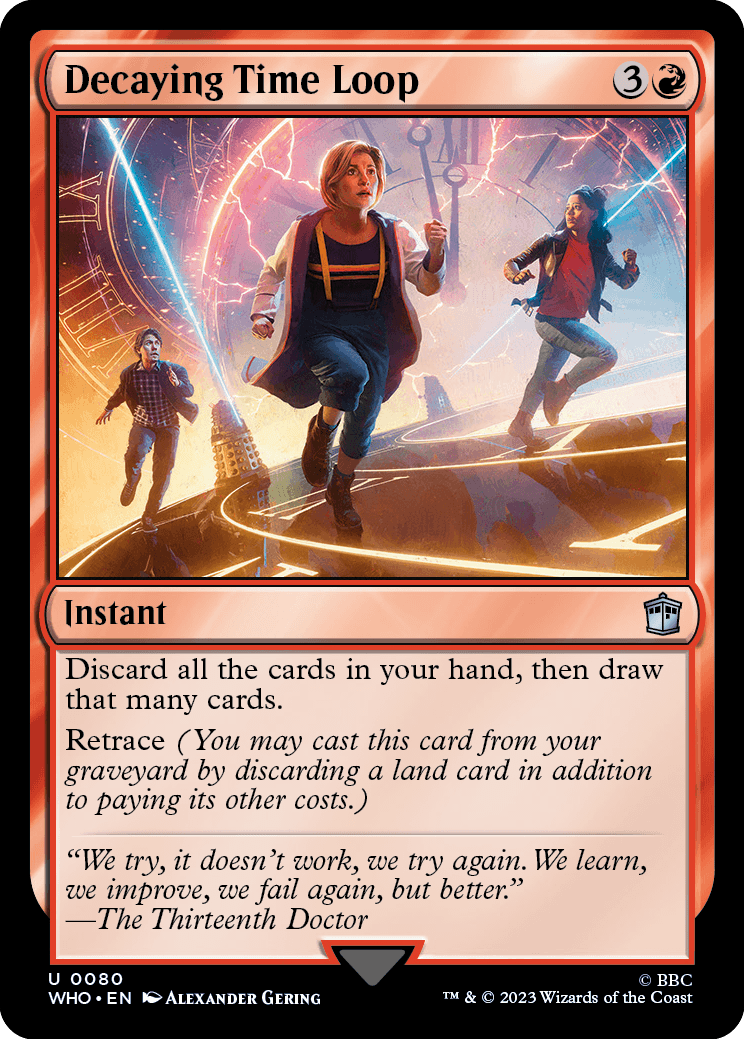
Decaying Time Loop
{3}{R}
Instant
Discard all the cards in your hand, then draw that many cards.
Retrace (You may cast this card from your graveyard by discarding a land card in addition to paying its other costs.)
- Casting a card by using its retrace ability works just like casting any other spell, with two exceptions: You're casting it from your graveyard rather than your hand, and you must discard a land card in addition to any other costs.
- A retrace card cast from your graveyard follows the normal timing rules for its card type.
- When a retrace spell you cast from your graveyard resolves, fails to resolve, or is countered, it's put back into your graveyard. You may use the retrace ability to cast it again.
- If the active player casts a spell that has retrace, that player may cast that card again after it resolves, before another player can remove the card from the graveyard. The active player has priority after the spell resolves, so they can immediately cast a new spell. Since casting a card with retrace from the graveyard moves that card onto the stack, no one else would have the chance to affect it while it's still in the graveyard.
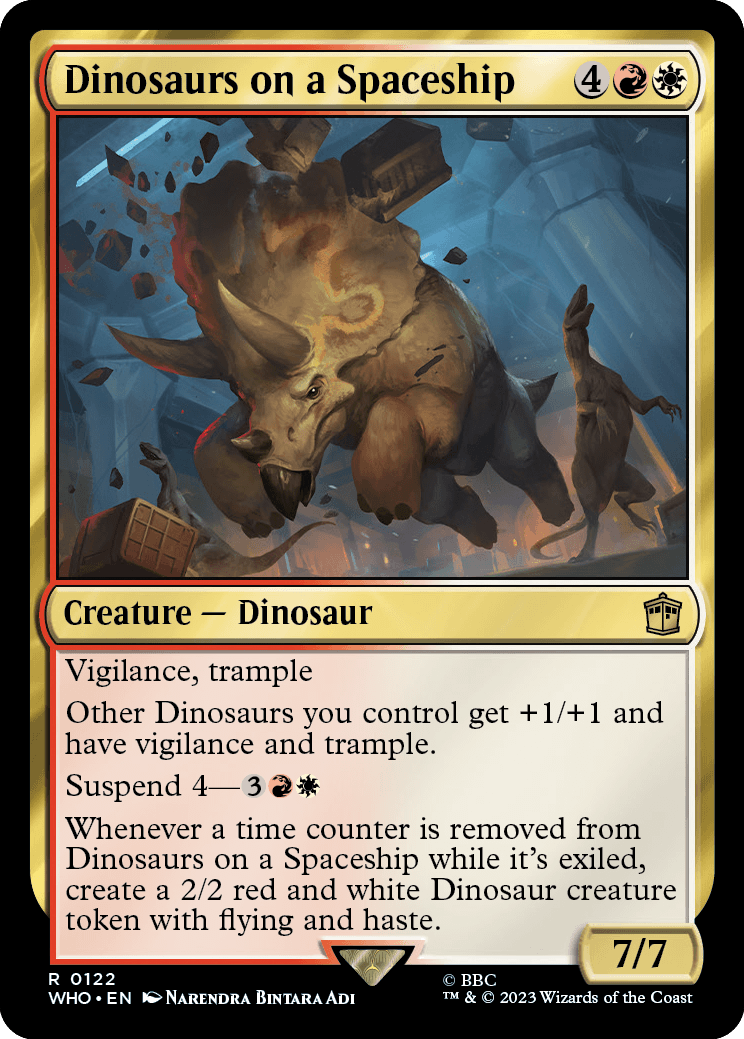
Dinosaurs on a Spaceship
{4}{R}{W}
Creature — Dinosaur
7/7
Vigilance, trample
Other Dinosaurs you control get +1/+1 and have vigilance and trample.
Suspend 4—{3}{R}{W}
Whenever a time counter is removed from Dinosaurs on a Spaceship while it's exiled, create a 2/2 red and white Dinosaur creature token with flying and haste.
- If this card is suspended, then when the last time counter is removed from it, both its last ability and the "cast this spell" part of the suspend ability will trigger. They can be put on the stack in either order.
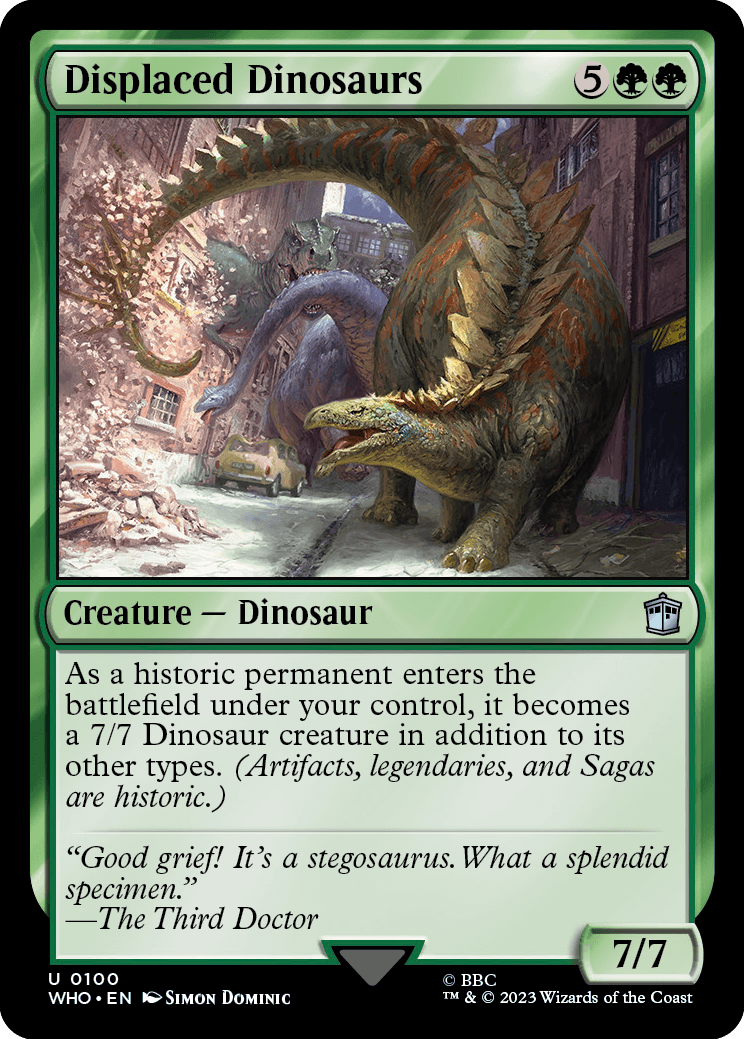
Displaced Dinosaurs
{5}{G}{G}
Creature — Dinosaur
7/7
As a historic permanent enters the battlefield under your control, it becomes a 7/7 Dinosaur creature in addition to its other types. (Artifacts, legendaries, and Sagas are historic.)
- The permanent enters as a 7/7 Dinosaur creature that still has its other types and abilities; it doesn't enter and then become a 7/7 Dinosaur creature. Any triggered abilities that look for power, toughness, or creature types to determine whether or not they trigger will see those characteristics.
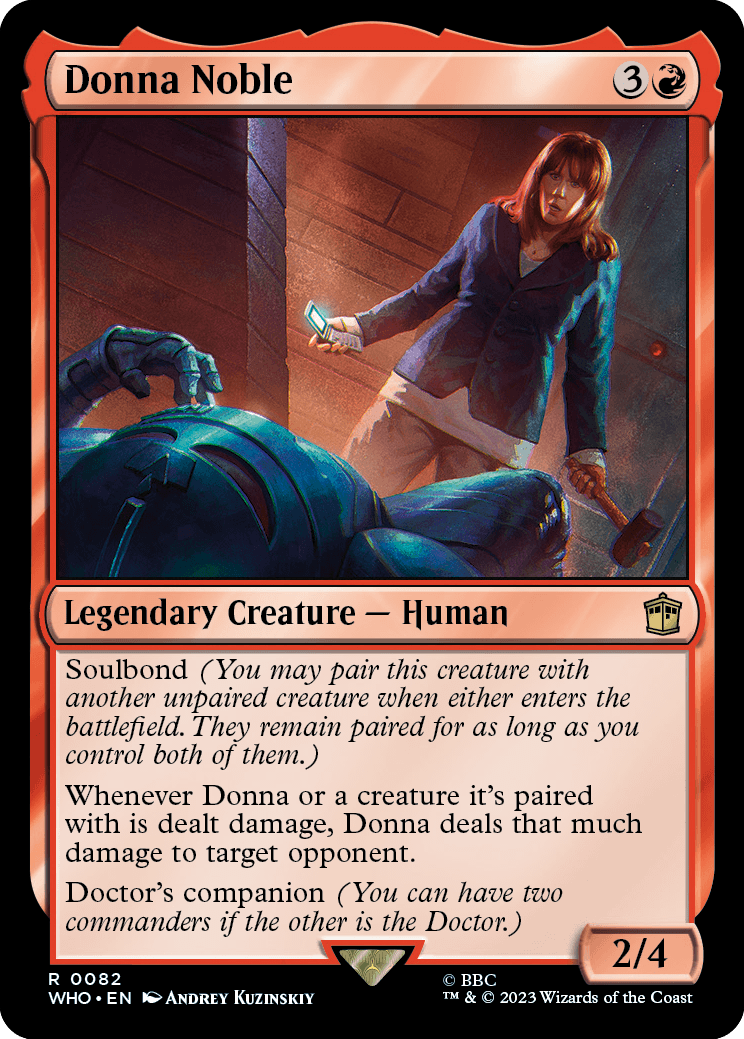
Donna Noble
{3}{R}
Legendary Creature — Human
2/4
Soulbond (You may pair this creature with another unpaired creature when either enters the battlefield. They remain paired for as long as you control both of them.)
Whenever Donna or a creature it's paired with is dealt damage, Donna deals that much damage to target opponent.
Doctor's companion (You can have two commanders if the other is the Doctor.)
- If Donna is paired with another creature and they are both dealt damage at the same time, the second ability triggers twice.
- Donna's ability triggers when either creature is dealt damage even if one or both were dealt lethal damage.
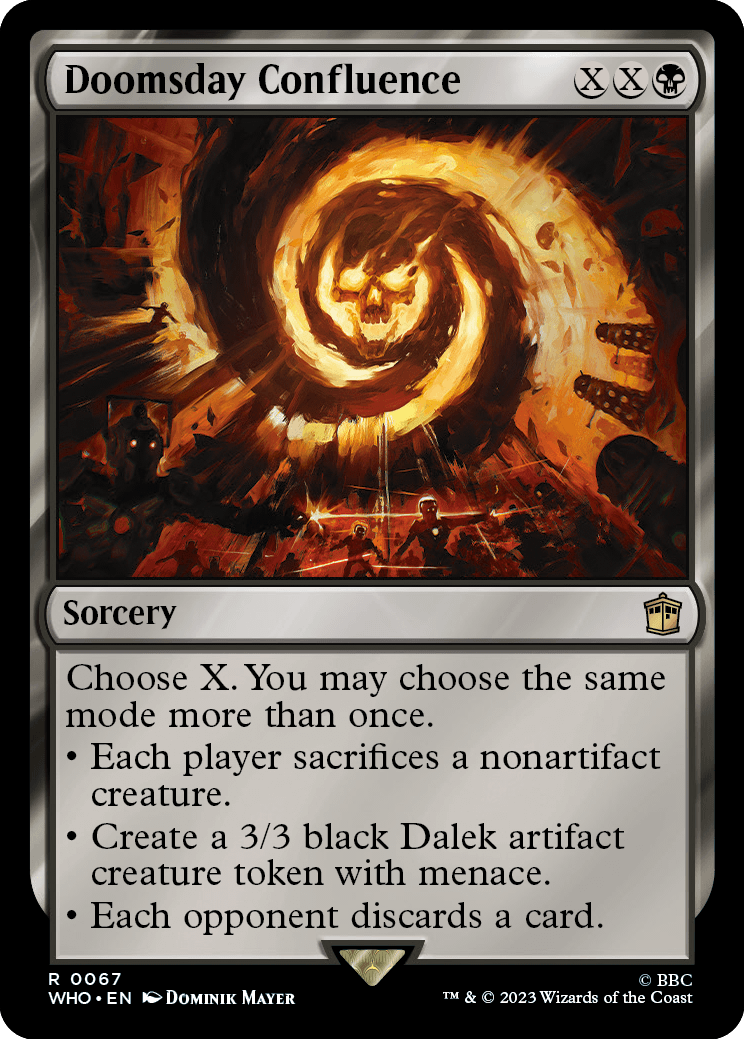
Doomsday Confluence
{X}{X}{B}
Sorcery
Choose X. You may choose the same mode more than once.
• Each player sacrifices a nonartifact creature.
• Create a 3/3 black Dalek artifact creature token with menace.
• Each opponent discards a card.
- You choose the modes as you cast the spell. Once modes are chosen, they can't be changed.
- No matter which combination of modes you choose, you always follow the instructions in the order they are written.
- No player can cast spells or activate abilities in between the modes of a resolving spell.
- If an effect copies Doomsday Confluence, the copy will have the same modes chosen the same number of times.
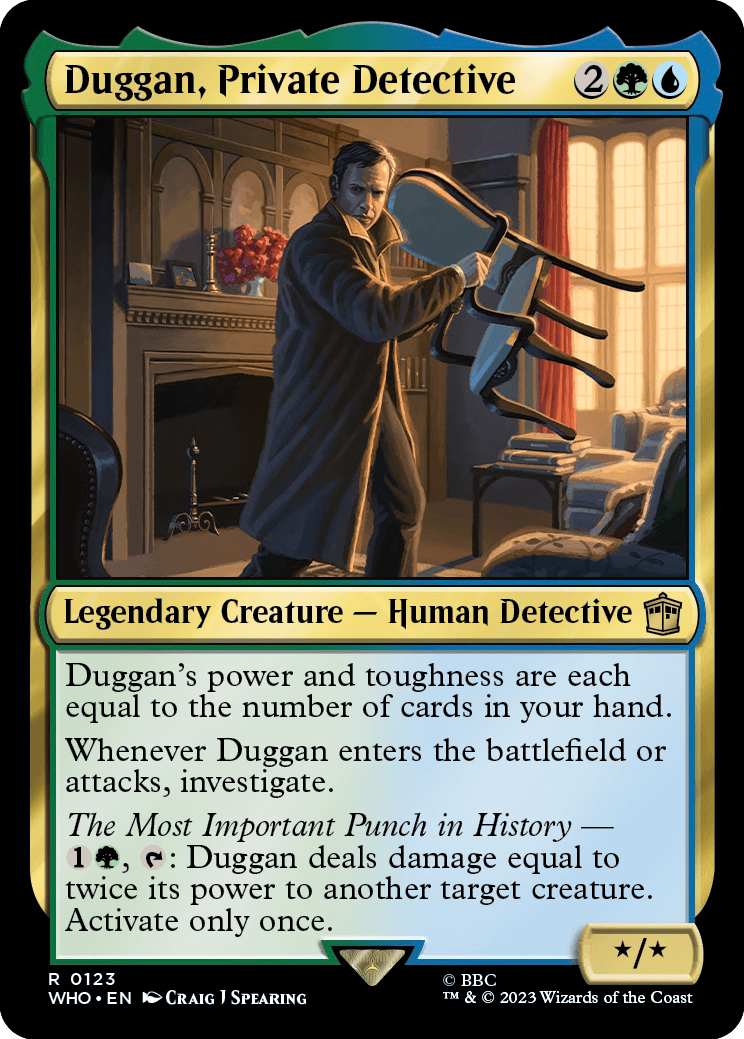
Duggan, Private Detective
{2}{G}{U}
Legendary Creature — Human Detective
*/*
Duggan's power and toughness are each equal to the number of cards in your hand.
Whenever Duggan enters the battlefield or attacks, investigate.
The Most Important Punch in History — {1}{G}, {T}: Duggan deals damage equal to twice its power to another target creature. Activate only once.
- Duggan, Private Detective's last ability can be activated only once during the game. However, if Duggan leaves and later returns to the battlefield, he's considered a new permanent (with a new set of abilities) and it can be activated again.
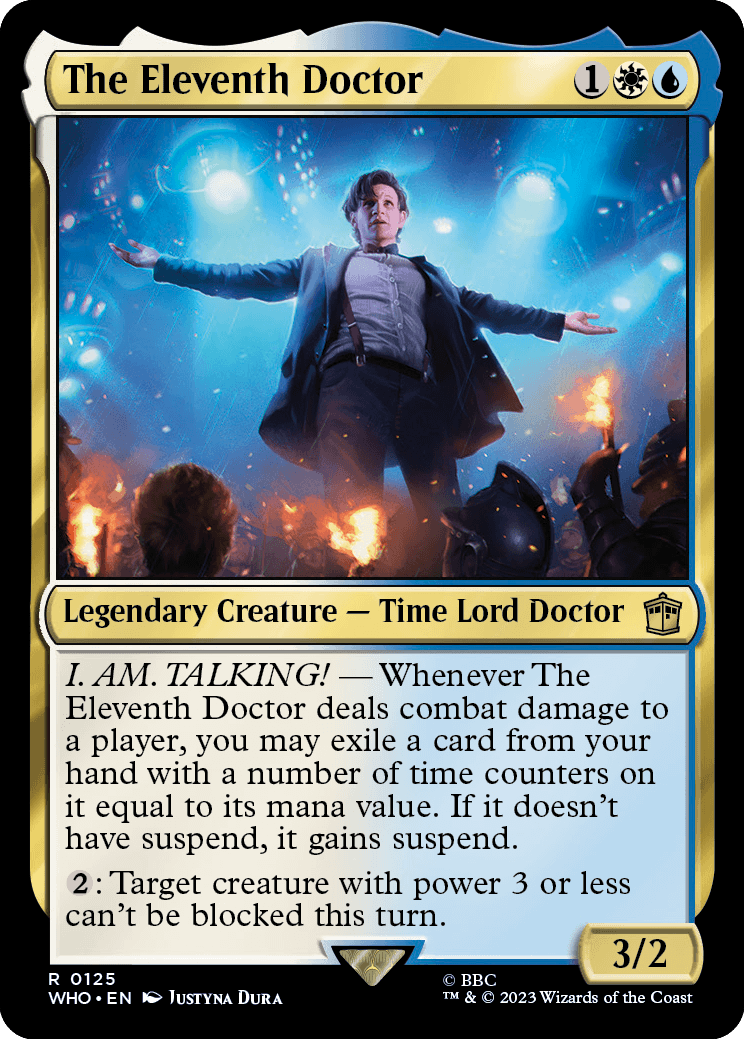
The Eleventh Doctor
{1}{W}{U}
Legendary Creature — Time Lord Doctor
3/2
I. AM. TALKING! — Whenever The Eleventh Doctor deals combat damage to a player, you may exile a card from your hand with a number of time counters on it equal to its mana value. If it doesn't have suspend, it gains suspend.
{2}: Target creature with power 3 or less can't be blocked this turn.
- After The Eleventh Doctor's last ability resolves, that creature can't be blocked this turn even if its power later increases to greater than 3.
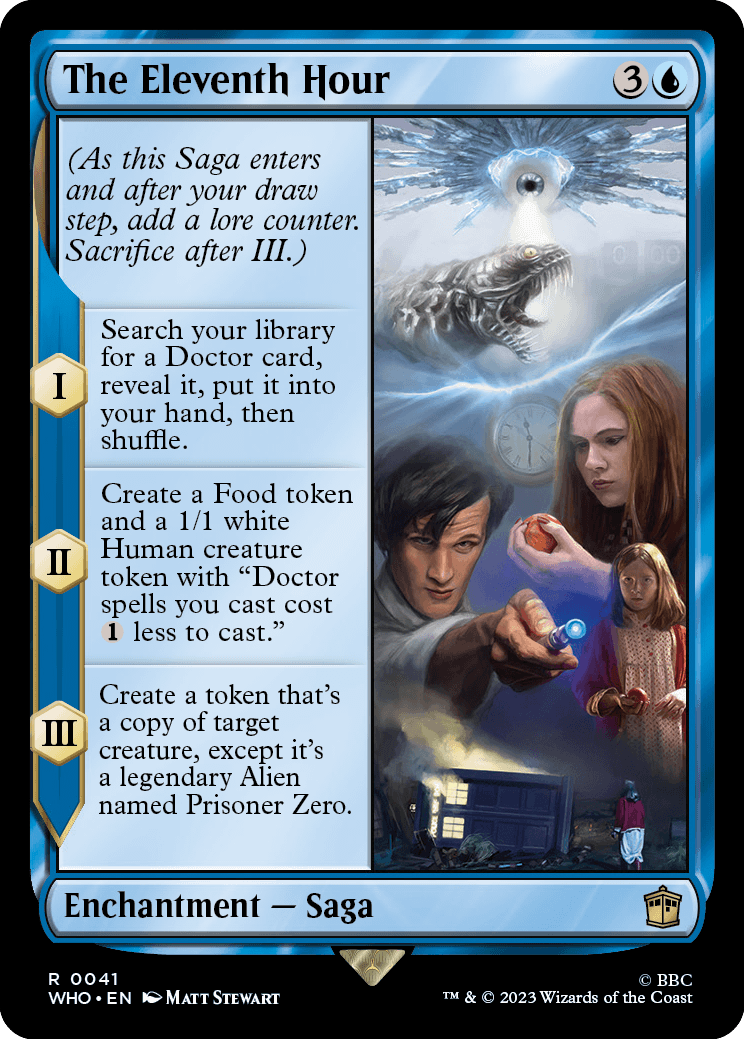
The Eleventh Hour
{3}{U}
Enchantment — Saga
(As this Saga enters and after your draw step, add a lore counter. Sacrifice after III.)
I — Search your library for a Doctor card, reveal it, put it into your hand, then shuffle.
II — Create a Food token and a 1/1 white Human creature token with "Doctor spells you cast cost {1} less to cast."
III — Create a token that's a copy of target creature, except it's a legendary Alien named Prisoner Zero.
- The Eleventh Hour's first ability can find any card with the Doctor creature type, not cards with the word "Doctor" in the name.
- The same is true for reducing the cost of Doctor spells.
- Except for its name and types, the token copies exactly what was printed on the original creature and nothing else (unless that permanent is copying something else or it is a token; see below). It doesn't copy whether that creature is tapped or untapped, whether it has any counters on it or Auras and Equipment attached to it, and so on.
- If the copied creature has {X} in its mana cost, X is considered to be 0.
- If the copied creature is a token, the new token that's created copies the original characteristics of that token as stated by the effect that created that token, with the exceptions noted above.
- If the copied creature is copying something else, then the token enters the battlefield as whatever that creature copied, with the exceptions noted above.
- Any enters-the-battlefield abilities of the copied creature will trigger when the token enters the battlefield. Any "as [this creature] enters the battlefield" or "[this creature] enters the battlefield with" abilities of the chosen creature will also work.
- The token will still have any card types it normally has, such as creature or artifact, but it will lose any non-Alien subtypes it has, such as Human or Vehicle.
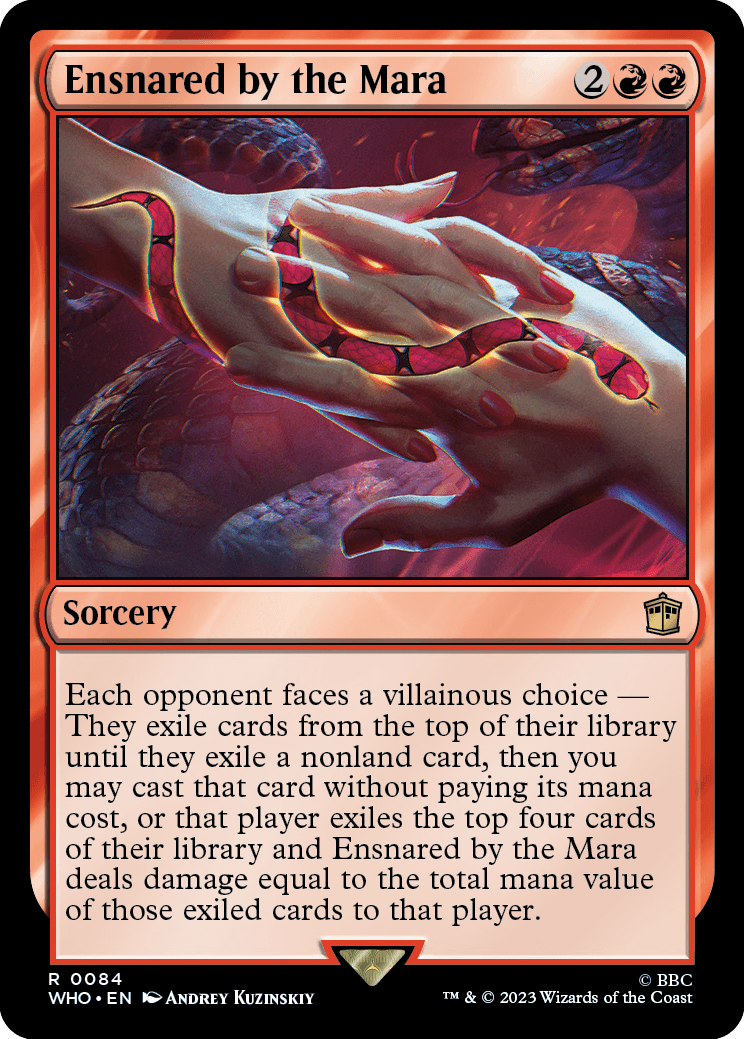
Ensnared by the Mara
{2}{R}{R}
Sorcery
Each opponent faces a villainous choice — They exile cards from the top of their library until they exile a nonland card, then you may cast that card without paying its mana cost, or that player exiles the top four cards of their library and Ensnared by the Mara deals damage equal to the total mana value of those exiled cards to that player.
- The opponent chooses whether to exile cards from the top of their library until they exile a nonland card or to exile the top four cards of their library. They don't choose whether you cast the cards exiled by the first option.
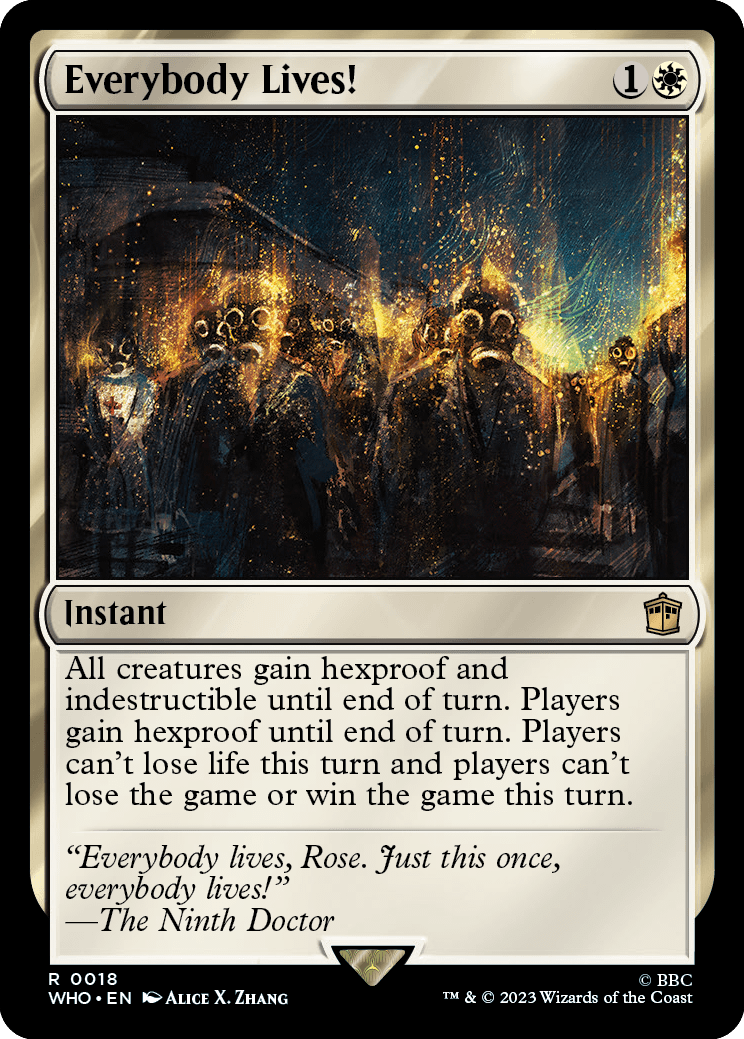
Everybody Lives!
{1}{W}
Instant
All creatures gain hexproof and indestructible until end of turn. Players gain hexproof until end of turn. Players can't lose life this turn and players can't lose the game or win the game this turn.
- Players can always concede from the game, even if they can't otherwise lose the game.
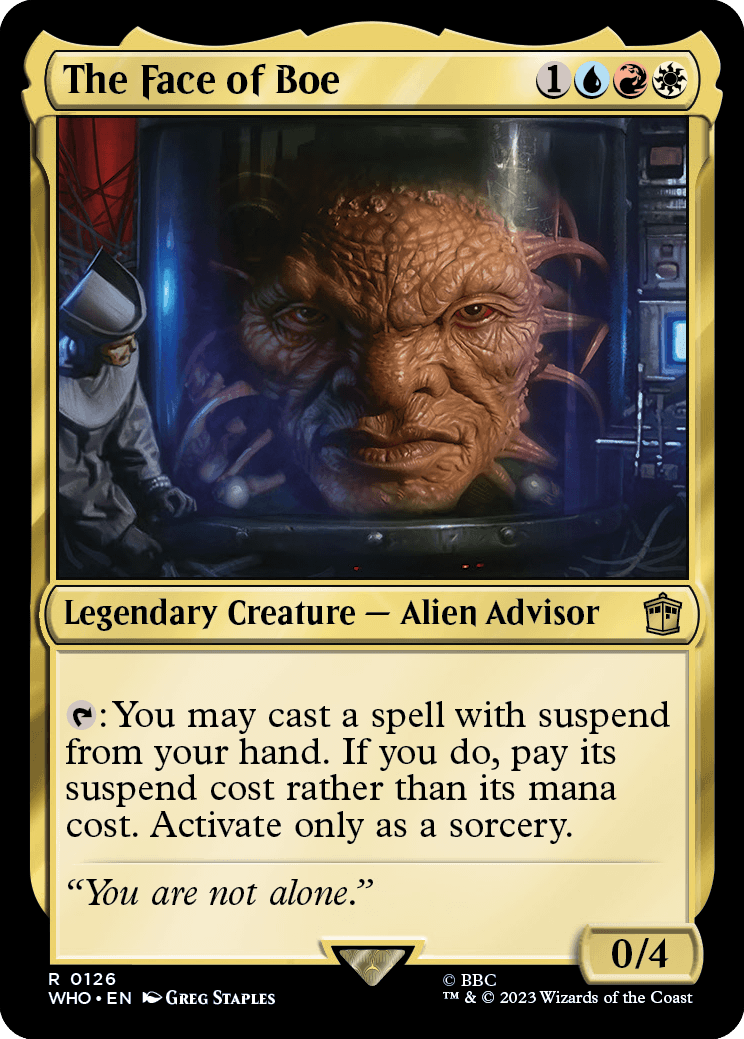
The Face of Boe
{1}{U}{R}{W}
Legendary Creature — Alien Advisor
0/4
{T}: You may cast a spell with suspend from your hand. If you do, pay its suspend cost rather than its mana cost. Activate only as a sorcery.
- You cast the spell immediately as The Face of Boe's ability resolves.

The First Doctor
{1}{W}{U}
Legendary Creature — Time Lord Doctor
2/2
When The First Doctor enters the battlefield, search your library and/or graveyard for a card named TARDIS, reveal it, and put it into your hand. If you search your library this way, shuffle.
Whenever you cast a spell with cascade, put a +1/+1 counter on target artifact or creature.
- You choose the target for The First Doctor's last ability before revealing any cards for cascade.
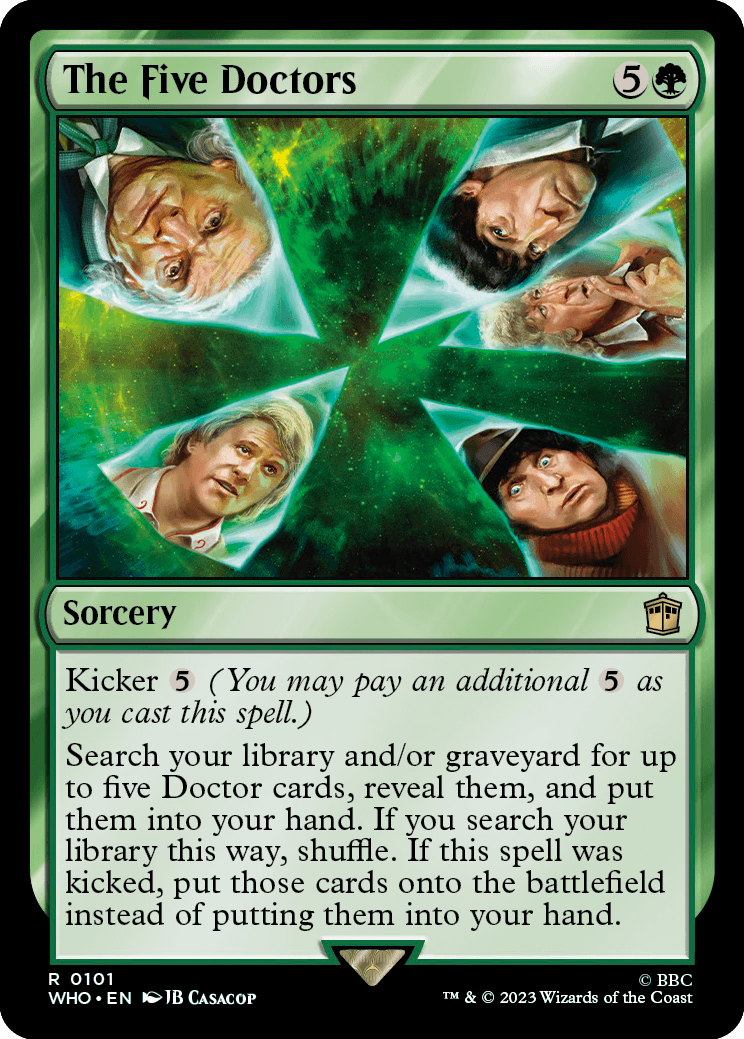
The Five Doctors
{5}{G}
Sorcery
Kicker {5} (You may pay an additional {5} as you cast this spell.)
Search your library and/or graveyard for up to five Doctor cards, reveal them, and put them into your hand. If you search your library this way, shuffle. If this spell was kicked, put those cards onto the battlefield instead of putting them into your hand.
- The Five Doctors can find any card with the Doctor creature type, not cards with the word "Doctor" in the name.
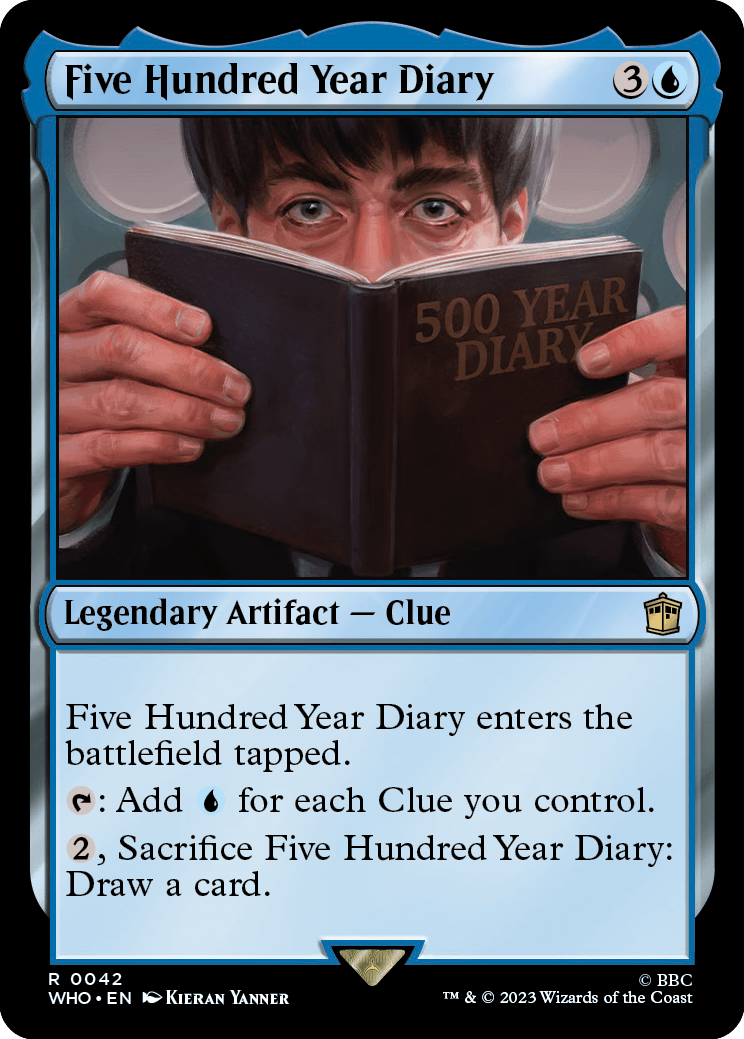
Five Hundred Year Diary
{3}{U}
Legendary Artifact — Clue
Five Hundred Year Diary enters the battlefield tapped.
{T}: Add {U} for each Clue you control.
{2}, Sacrifice Five Hundred Year Diary: Draw a card.
- Five Hundred Year Diary counts itself for its second ability.
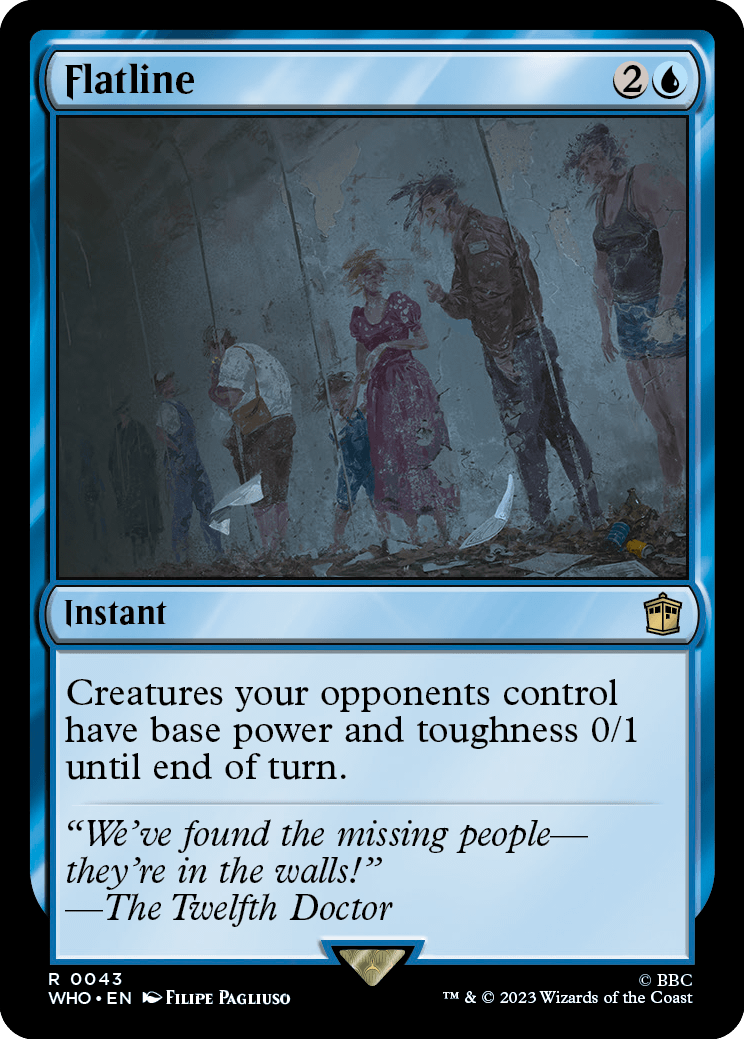
Flatline
{2}{U}
Instant
Creatures your opponents control have base power and toughness 0/1 until end of turn.
- Flatline overwrites any effects that set a creature's power and toughness. Any existing effects or counters that raise, lower, or switch a creature's power and/or toughness continue to apply to the creature's newly-set power and toughness.
- Flatline affects only creatures your opponents control at the time it resolves. Creatures they begin to control later in the turn won't change power and toughness.
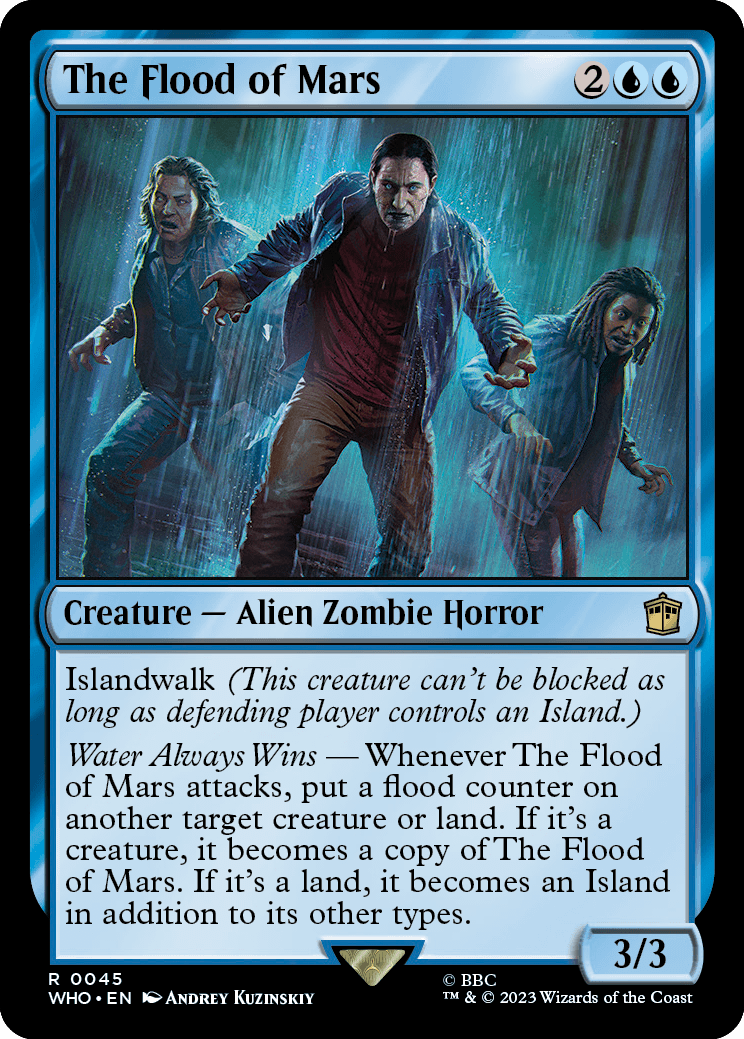
The Flood of Mars
{2}{U}{U}
Creature — Alien Zombie Horror
3/3
Islandwalk (This creature can't be blocked as long as defending player controls an Island.)
Water Always Wins — Whenever The Flood of Mars attacks, put a flood counter on another target creature or land. If it's a creature, it becomes a copy of The Flood of Mars. If it's a land, it becomes an Island in addition to its other types.
- If the target is both a creature and a land as the triggered ability resolves, it will become a copy of The Flood of Mars. Excepting some very unusual cases, that copy won't be a land, so it won't also become an Island.
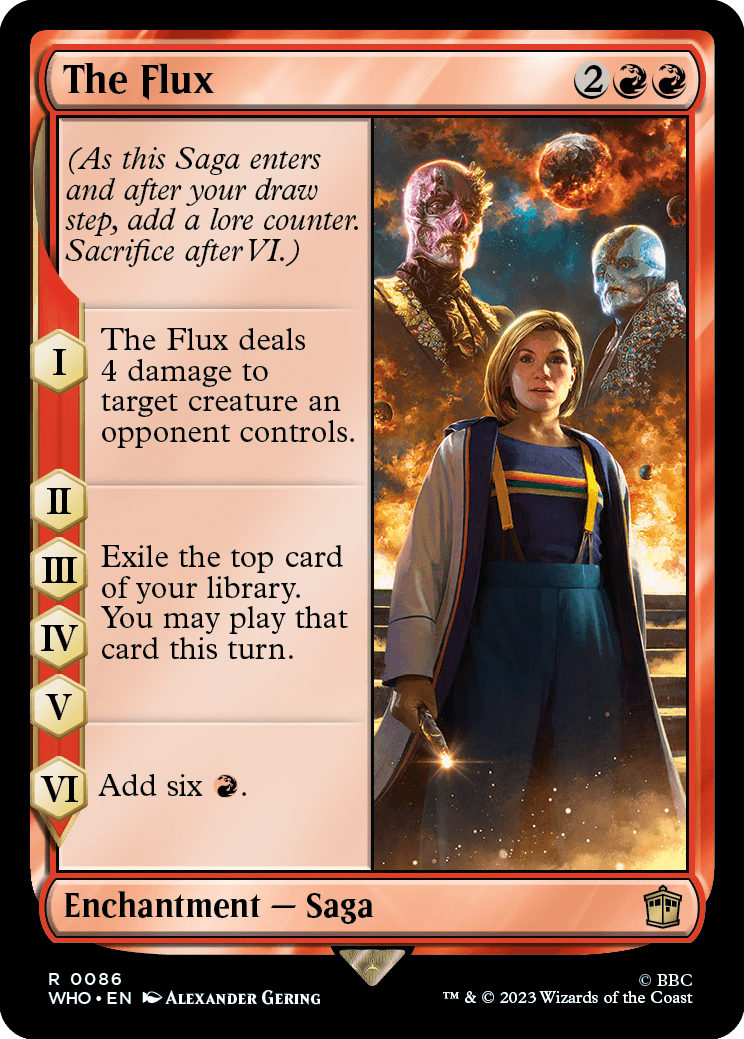
The Flux
{2}{R}{R}
Enchantment — Saga
(As this Saga enters and after your draw step, add a lore counter. Sacrifice after VI.)
I — The Flux deals 4 damage to target creature an opponent controls.
II, III, IV, V — Exile the top card of your library. You may play that card this turn.
VI — Add six {R}.
- You must pay all costs and follow all normal timing rules to play a card with The Flux's middle chapter abilities. For example, you can play a land exiled this way only during your main phase while the stack is empty.
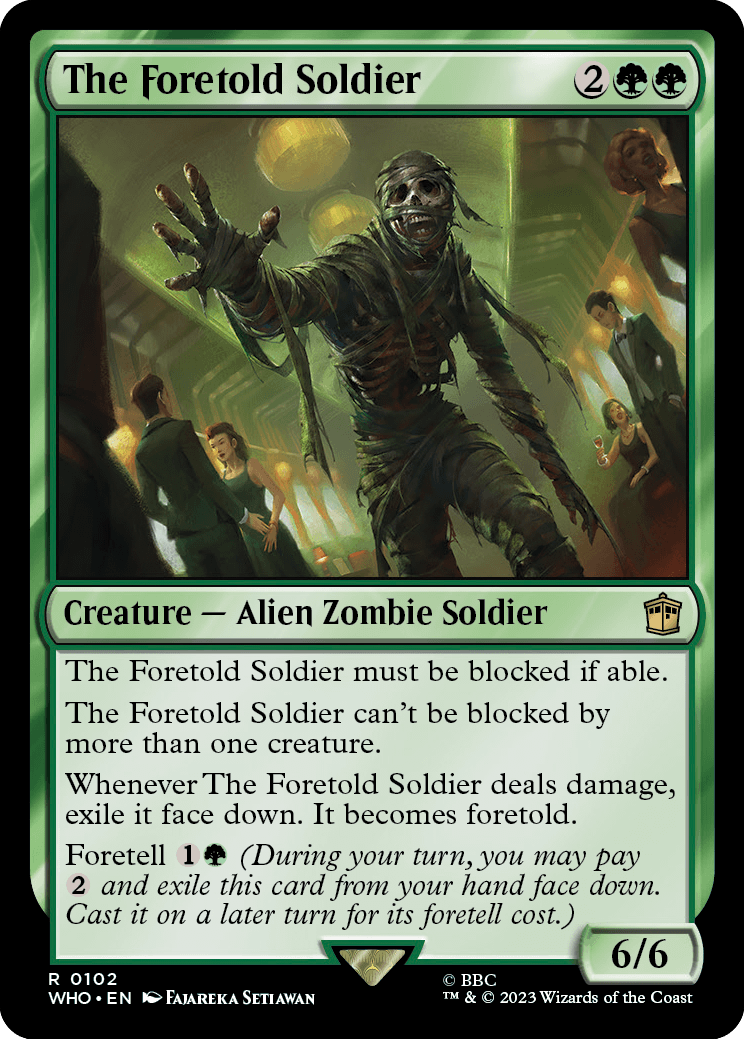
The Foretold Soldier
{2}{G}{G}
Creature — Alien Zombie Soldier
6/6
The Foretold Soldier must be blocked if able.
The Foretold Soldier can't be blocked by more than one creature.
Whenever The Foretold Soldier deals damage, exile it face down. It becomes foretold.
Foretell {1}{G} (During your turn, you may pay {2} and exile this card from your hand face down. Cast it on a later turn for its foretell cost.)
- Because exiling a card with foretell from your hand is a special action, you can do so any time you have priority during your turn, including in response to spells and abilities. Once you announce you're taking the action, no other player can respond by trying to remove the card from your hand.
- Casting a foretold card from exile follows the timing rules for that card. If you foretell an instant card, you can cast it as soon as the next player's turn. In most cases, if you foretell a card that isn't an instant (like The Foretold Soldier), you'll have to wait until your next turn to cast it.
- Regardless of who controlled The Foretold Soldier and exiled it with its triggered ability, only its owner may cast it from exile this way.
- If a card is a copy of The Foretold Soldier on the battlefield, it can be exiled by the triggered ability and will become foretold. However, it may only be cast this way if it has a foretell cost in exile.
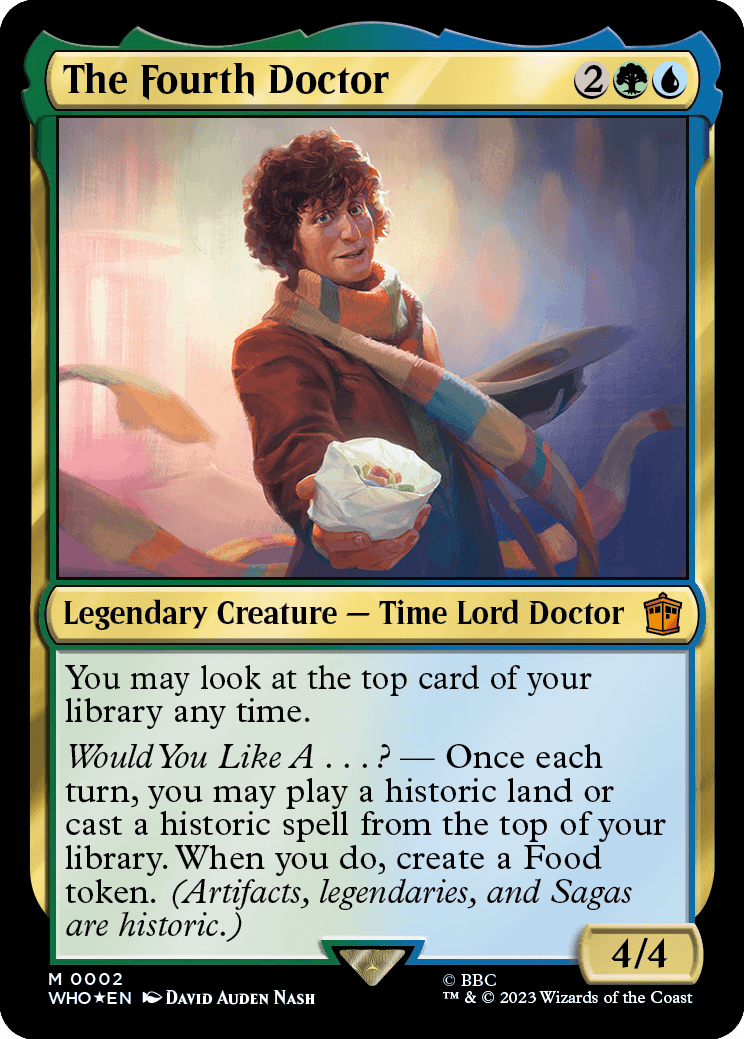
The Fourth Doctor
{2}{G}{U}
Legendary Creature — Time Lord Doctor
4/4
You may look at the top card of your library any time.
Would You Like A . . . ? — Once each turn, you may play a historic land or cast a historic spell from the top of your library. When you do, create a Food token. (Artifacts, legendaries, and Sagas are historic.)
- Essentially, The Fourth Doctor lets you play with the top card of your library revealed only to you. Knowing what that card is becomes part of the information you have access to, just like you can look at the cards in your hand. You may look at the top card of your library whenever you want, even if you don't have priority. This action doesn't use the stack.
- If the top card of your library changes during the process of casting a spell or activating an ability, you can't look at the new top card until the process of casting the spell or activating the ability ends (all targets are chosen, all costs are paid, and so on).
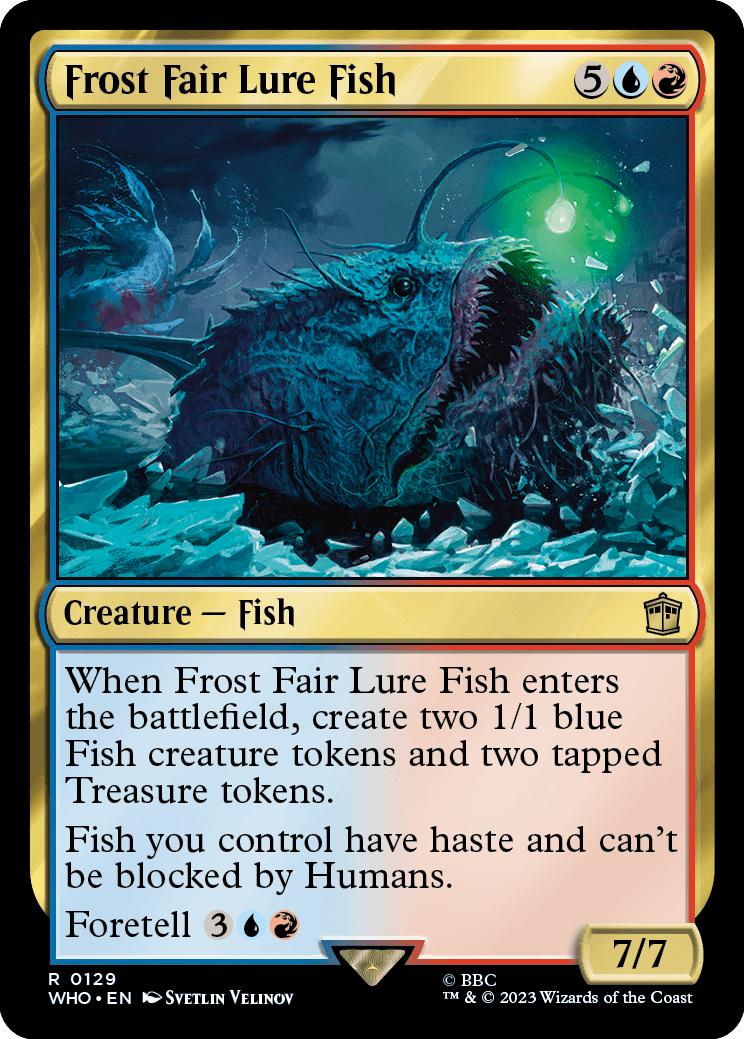
Frost Fair Lure Fish
{5}{U}{R}
Creature — Fish
7/7
When Frost Fair Lure Fish enters the battlefield, create two 1/1 blue Fish creature tokens and two tapped Treasure tokens.
Fish you control have haste and can't be blocked by Humans.
Foretell {3}{U}{R}
- Because exiling a card with foretell from your hand is a special action, you can do so any time you have priority during your turn, including in response to spells and abilities. Once you announce you're taking the action, no other player can respond by trying to remove the card from your hand.
- Casting a foretold card from exile follows the timing rules for that card. If you foretell an instant card, you can cast it as soon as the next player's turn. In most cases, if you foretell a card that isn't an instant (like Frost Fair Lure Fish), you'll have to wait until your next turn to cast it.
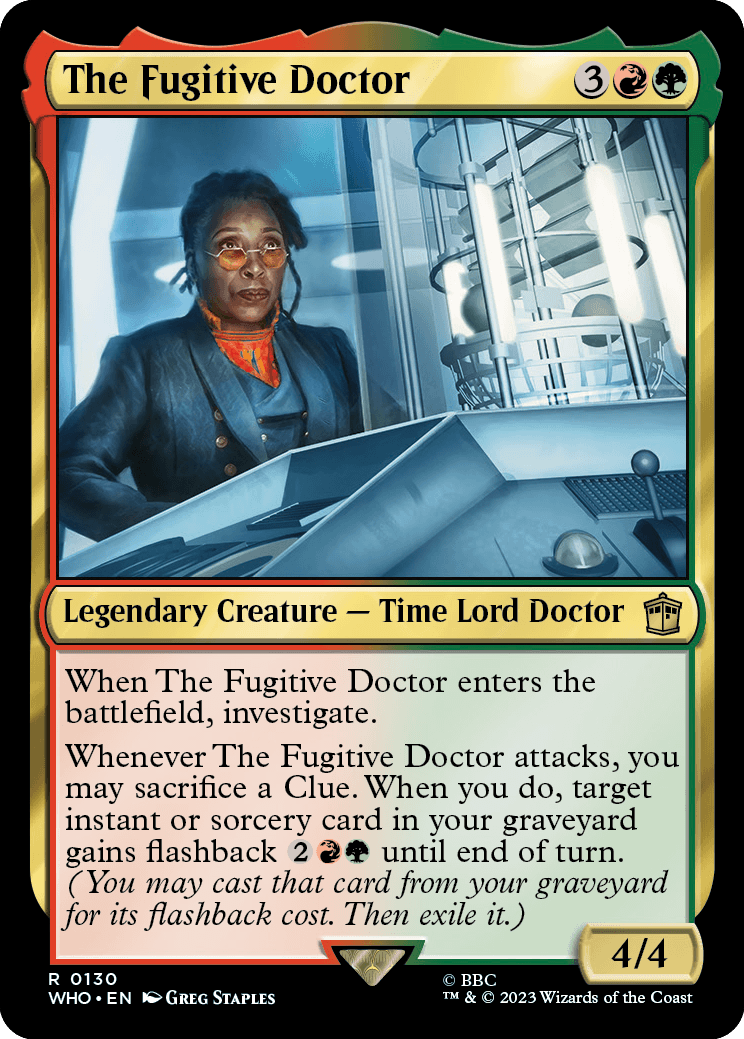
The Fugitive Doctor
{3}{R}{G}
Legendary Creature — Time Lord Doctor
4/4
When The Fugitive Doctor enters the battlefield, investigate.
Whenever The Fugitive Doctor attacks, you may sacrifice a Clue. When you do, target instant or sorcery card in your graveyard gains flashback {2}{R}{G} until end of turn. (You may cast that card from your graveyard for its flashback cost. Then exile it.)
- "Investigate" means "Create a Clue token." A Clue token is a colorless Clue artifact token with "{2}, Sacrifice this artifact: Draw a card."
- "Flashback [cost]" means "You may cast this card from your graveyard by paying [cost] rather than paying its mana cost" and "If the flashback cost was paid, exile this card instead of putting it anywhere else any time it would leave the stack."
- You must still follow any timing restrictions and permissions, including those based on the card's type. For instance, you can cast a sorcery using flashback only when you could normally cast a sorcery.
- To determine the total cost of a spell, start with the mana cost or alternative cost (such as a flashback cost) you're paying, add any cost increases, then apply any cost reductions. The mana value of the spell is determined only by its mana cost, no matter what the total cost to cast the spell was.
- A spell cast using flashback will always be exiled afterward, whether it resolves, is countered, or leaves the stack in some other way.
- If you cast an instant or sorcery with {X} in its mana cost this way, you must choose 0 as the value of X. (You still have to pay {2}{R}{G}.)
- If a card has multiple instances of flashback, you may choose any of its flashback costs to pay.
- If a split card gains flashback, you pay only the cost of the half you're casting.
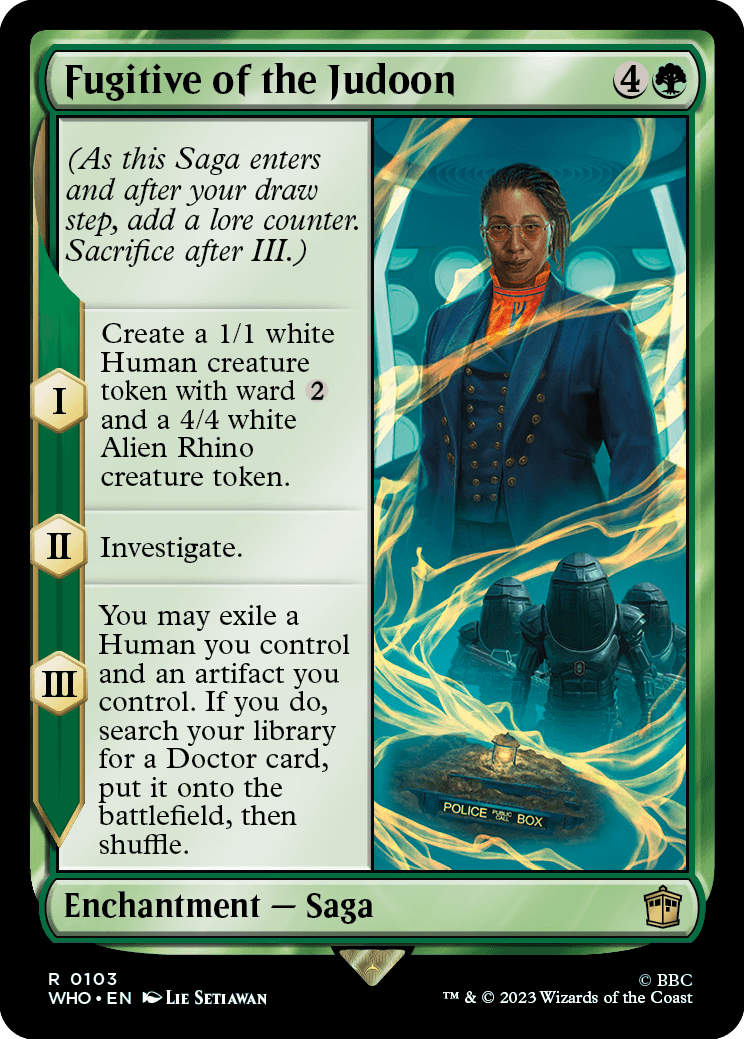
Fugitive of the Judoon
{4}{G}
Enchantment — Saga
(As this Saga enters and after your draw step, add a lore counter. Sacrifice after III.)
I — Create a 1/1 white Human creature token with ward {2} and a 4/4 white Alien Rhino creature token.
II — Investigate.
III — You may exile a Human you control and an artifact you control. If you do, search your library for a Doctor card, put it onto the battlefield, then shuffle.
- The last ability can find any card with the Doctor creature type, not just a card with "Doctor" in the name.
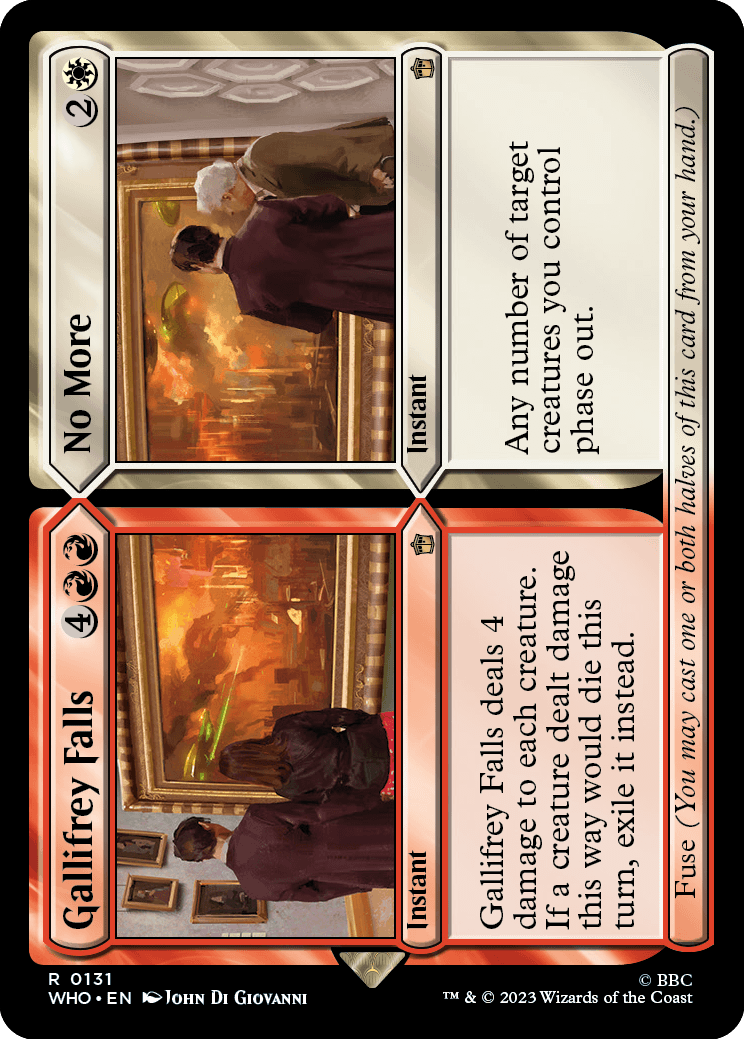
Gallifrey Falls // No More
{4}{R}{R}
Instant
Gallifrey Falls deals 4 damage to each creature. If a creature dealt damage this way would die this turn, exile it instead.
//
No More
{2}{W}
Instant
Any number of target creatures you control phase out.
Fuse (You may cast one or both halves of this card from your hand.)
- If you cast both halves of this spell fused, the targeted creatures will be dealt 4 damage first and then be phased out, even if they had less than 4 toughness. Any abilities that trigger based on those creatures being dealt damage will trigger.
- If you're casting a split card with fuse from any zone other than your hand, you can't cast both halves. You'll only be able to cast one half or the other.
- To cast a fused split spell, pay both of its mana costs. While the spell is on the stack, its mana value is the total amount of mana in both costs.
- When resolving a fused split spell with multiple targets, treat it as you would any spell with multiple targets. If all targets are illegal when the spell tries to resolve, the spell doesn't resolve and none of its effects happen. If at least one target is still legal at that time, the spell resolves, but an illegal target can't perform any actions or have any actions performed on it.
- When a fused split spell resolves, follow the instructions of the left half first, then the instructions on the right half.
- On the stack, a split spell that hasn't been fused has only that half's characteristics and mana value. The other half is treated as though it didn't exist.
- Some split cards with fuse have two monocolor halves of different colors. If such a card is cast as a fused split spell, the resulting spell is multicolored. If only one half is cast, the spell is the color of that half. While not on the stack, such a card is multicolored.
- Some split cards with fuse have two halves that are both multicolored. That card is multicolored no matter which half is cast, or if both halves are cast. It's also multicolored while not on the stack.
- If a player is instructed to choose a card name, the player may choose the name of either half of a split card, but not both. A split card has the chosen name if one of its two names matches the chosen name.
- If you cast a split card with fuse from your hand without paying its mana cost, you can choose to use its fuse ability and cast both halves without paying their mana costs.
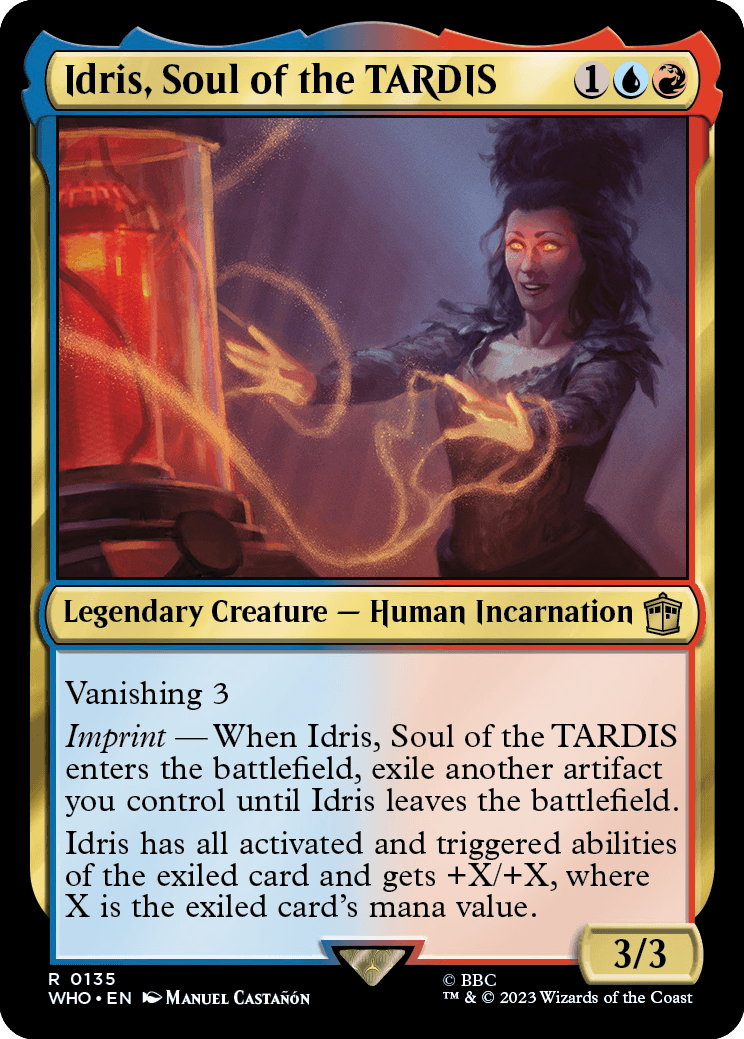
Idris, Soul of the TARDIS
{1}{U}{R}
Legendary Creature — Human Incarnation
3/3
Vanishing 3
Imprint — When Idris, Soul of the TARDIS enters the battlefield, exile another artifact you control until Idris leaves the battlefield.
Idris has all activated and triggered abilities of the exiled card and gets +X/+X, where X is the exiled card's mana value.
- Activated abilities contain a colon. They're generally written "[Cost]: [Effect]." Some keyword abilities, like equip, are activated abilities and they have colons in their reminder text.
- Triggered abilities use the word "when," "whenever," or "at." They're often written as "[Trigger condition], [effect]." Some keyword abilities, such as prowess, are triggered abilities and will have "when," "whenever," or "at" in their reminder text.
- If the exiled card has an {X} in its mana cost, the value of X is 0 when determining that card's mana value.
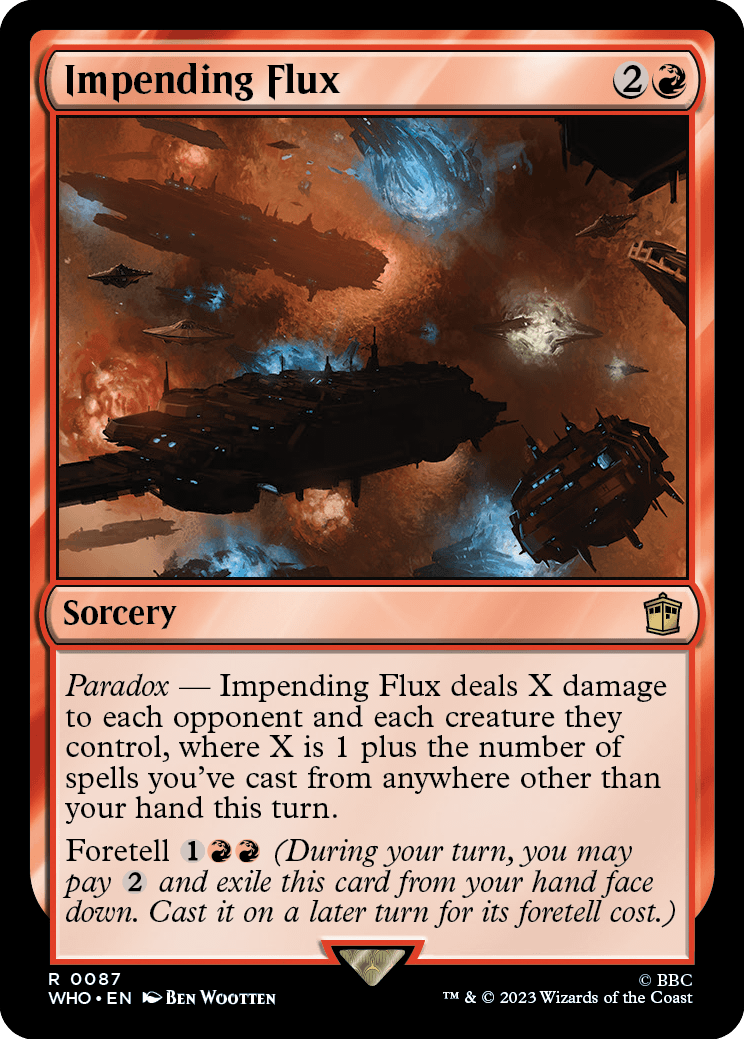
Impending Flux
{2}{R}
Sorcery
Paradox — Impending Flux deals X damage to each opponent and each creature they control, where X is 1 plus the number of spells you've cast from anywhere other than your hand this turn.
Foretell {1}{R}{R} (During your turn, you may pay {2} and exile this card from your hand face down. Cast it on a later turn for its foretell cost.)
- If you cast Impending Flux from exile, it counts itself when determining the value of X.
- Because exiling a card with foretell from your hand is a special action, you can do so any time you have priority during your turn, including in response to spells and abilities. Once you announce you're taking the action, no other player can respond by trying to remove the card from your hand.
- Casting a foretold card from exile follows the timing rules for that card. If you foretell an instant card, you can cast it as soon as the next player's turn. In most cases, if you foretell a card that isn't an instant (like Impending Flux), you'll have to wait until your next turn to cast it.
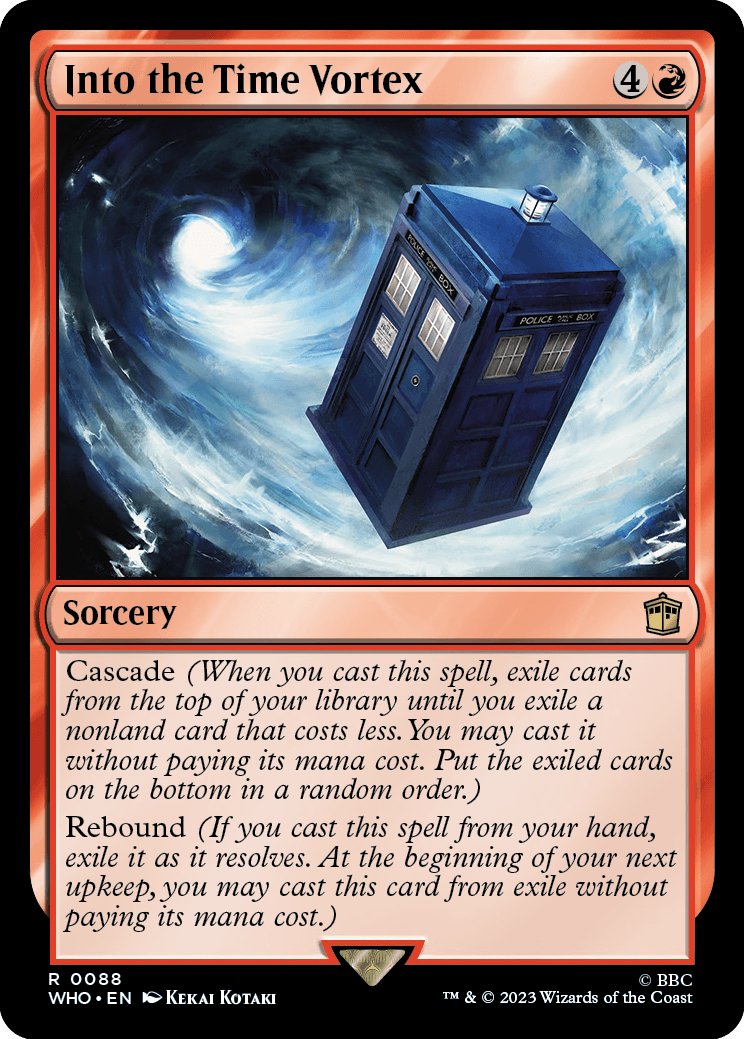
Into the Time Vortex
{4}{R}
Sorcery
Cascade (When you cast this spell, exile cards from the top of your library until you exile a nonland card that costs less. You may cast it without paying its mana cost. Put the exiled cards on the bottom in a random order.)
Rebound (If you cast this spell from your hand, exile it as it resolves. At the beginning of your next upkeep, you may cast this card from exile without paying its mana cost.)
- A spell's mana value is determined only by its mana cost. Ignore any alternative costs, additional costs, cost increases, or cost reductions.
- Cascade triggers when you cast the spell, meaning that it resolves before that spell. If you end up casting the exiled card, it will go on the stack above the spell with cascade.
- When the cascade ability resolves, you must exile cards. The only optional part of the ability is whether or not you cast the last card exiled.
- If a spell with cascade is countered, the cascade ability will still resolve normally.
- You exile the cards face up. All players will be able to see them.
- If you cast a card "without paying its mana cost," you can't choose to cast it for any alternative costs. You can, however, pay additional costs. If the card has any mandatory additional costs, you must pay those to cast the card.
- If the card has {X} in its mana cost, you must choose 0 as the value of X when casting it without paying its mana cost.
- Due to a 2021 rules change to cascade, not only do you stop exiling cards if you exile a nonland card with lesser mana value than the spell with cascade, but the resulting spell you cast must also have lesser mana value. Previously, in cases where a card's mana value differed from the resulting spell, such as with some modal double-faced cards or cards with an Adventure, you could cast a spell with a higher mana value than the exiled card.
- The mana value of a split card is determined by the combined mana cost of its two halves. If cascade allows you to cast a split card, you may cast either half but not both halves (unless the card has fuse).

Jenny Flint
{1}{U}{R}
Legendary Creature — Human Detective
2/2
Partner with Madame Vastra
First strike
Training (Whenever this creature attacks with another creature with greater power, put a +1/+1 counter on this creature.)
Whenever you sacrifice a Clue or Food, put a +1/+1 counter on another target creature you control.
- A creature's training ability triggers only when both that creature and a creature with greater power are declared as attackers. Increasing a creature's power after attackers are declared won't cause a training ability to trigger.
- Once a creature's training ability has triggered, destroying the other attacking creature or reducing its power won't stop the creature with training from getting a +1/+1 counter.
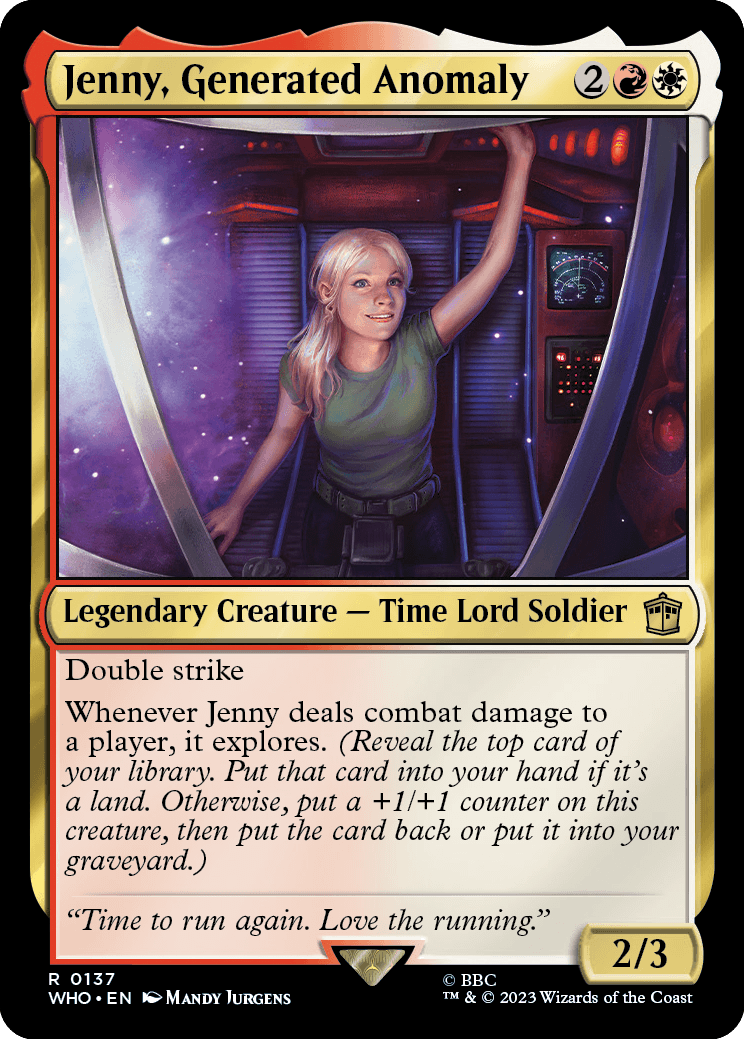
Jenny, Generated Anomaly
{2}{R}{W}
Legendary Creature — Time Lord Soldier
2/3
Double strike
Whenever Jenny deals combat damage to a player, it explores. (Reveal the top card of your library. Put that card into your hand if it's a land. Otherwise, put a +1/+1 counter on this creature, then put the card back or put it into your graveyard.)
- Once an ability that causes a creature to explore begins to resolve, no player may take any other actions until it's done. Notably, opponents can't try to remove the exploring creature after you reveal a nonland card but before it receives a counter.
- If no card is revealed, most likely because that player's library is empty, the exploring creature receives a +1/+1 counter.
- If a resolving spell or ability instructs a specific creature to explore but that creature has left the battlefield, the creature still explores. If you reveal a nonland card this way, you won't put a +1/+1 counter on anything, but you may put the revealed card into your graveyard. Effects that trigger "whenever a creature you control explores" trigger if appropriate.
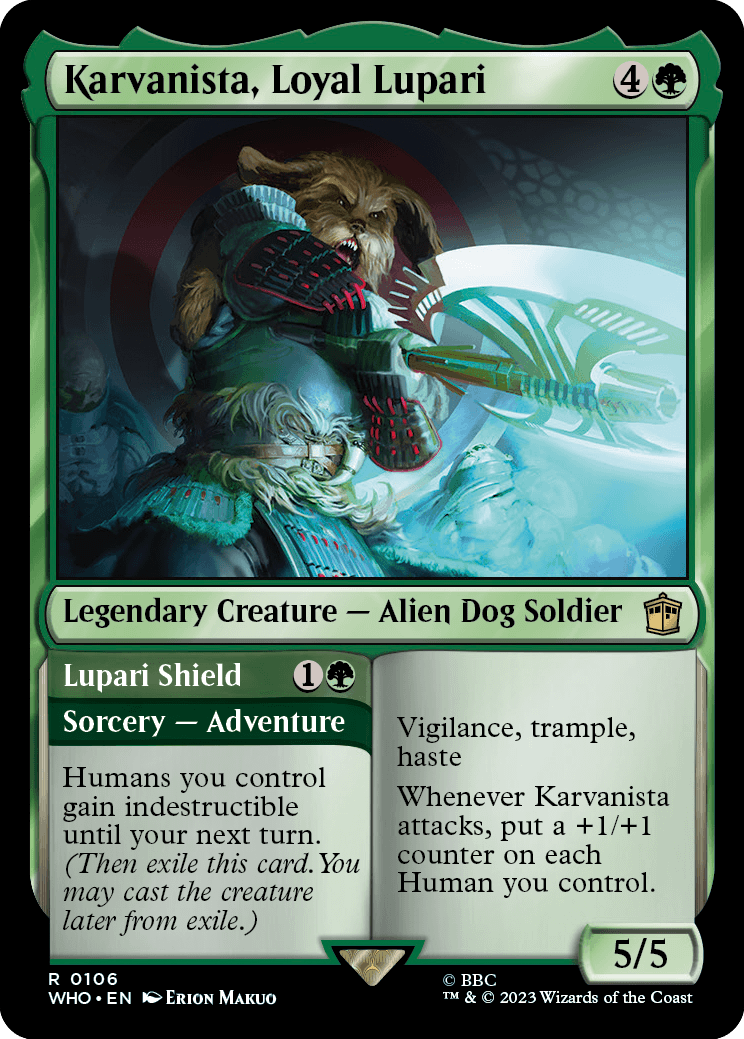
Karvanista, Loyal Lupari
{4}{G}
Legendary Creature — Alien Dog Soldier
5/5
Vigilance, trample, haste
Whenever Karvanista attacks, put a +1/+1 counter on each Human you control.
//ADV//
Lupari Shield
{1}{G}
Sorcery — Adventure
Humans you control gain indestructible until your next turn. (Then exile this card. You may cast the creature later from exile.)
- This adventurer card is a permanent card in every zone except the stack, as well as while on the stack if not cast as an Adventure. Ignore its alternative characteristics in those cases. For example, while it's in your graveyard, Karvanista, Loyal Lupari is a creature card whose mana value is 5.
- When casting a spell as an Adventure, use the alternative characteristics and ignore all of the card's normal characteristics. The spell's color, mana cost, mana value, and so on are determined by only those alternative characteristics. If the spell leaves the stack, it immediately resumes using its normal characteristics.
- If you cast an adventurer card as an Adventure, use only its alternative characteristics to determine whether it's legal to cast that spell.
- If a spell is cast as an Adventure, its controller exiles it instead of putting it into its owner's graveyard as it resolves. For as long as it remains exiled, that player may cast it as a permanent spell. If an Adventure spell leaves the stack in any way other than resolving (most likely by being countered or by failing to resolve because its targets have all become illegal), that card won't be exiled and the spell's controller won't be able to cast it as a permanent later.
- If an adventurer card ends up in exile for any other reason than by exiling itself while resolving, it won't give you permission to cast it as a permanent spell.
- You must still follow any relevant timing rules for the permanent spell you cast from exile. Normally, you'll be able to cast it only during your main phase while the stack is empty.
- If an effect copies an Adventure spell, that copy is exiled as it resolves. It ceases to exist as a state-based action; it's not possible to cast the copy from exile.
- An effect may refer to a card, spell, or permanent that "has an Adventure." This refers to a card, spell, or permanent that has an adventurer card's set of alternative characteristics, even if they're not being used and even if that card was never cast as an Adventure.
- If an object becomes a copy of an object that has an Adventure, the copy also has an Adventure. If it changes zones, it will either cease to exist (if it's a token) or cease to be a copy (if it's a nontoken permanent), and so you won't be able to cast it as an Adventure.
- If an effect instructs you to choose a card name, you may choose the alternative Adventure name. Consider only the alternative characteristics to determine whether that is an appropriate name to choose.
- Casting a card as an Adventure isn't casting it for an alternative cost. Effects that allow you to cast a spell for an alternative cost or without paying its mana cost may allow you to apply those to the Adventure.
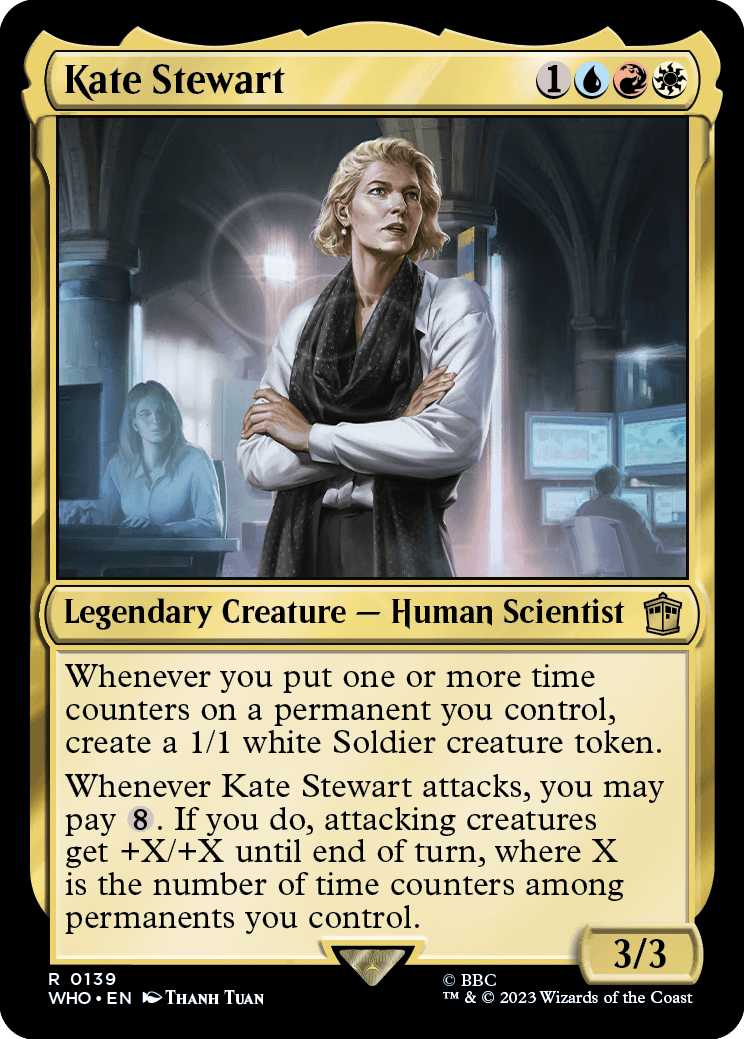
Kate Stewart
{1}{U}{R}{W}
Legendary Creature — Human Scientist
3/3
Whenever you put one or more time counters on a permanent you control, create a 1/1 white Soldier creature token.
Whenever Kate Stewart attacks, you may pay {8}. If you do, attacking creatures get +X/+X until end of turn, where X is the number of time counters among permanents you control.
- Kate Stewart's first ability triggers only when you put time counters on permanents. It does not trigger when you put time counters on cards in exile.
- Similarly, its last ability counts only time counters on permanents, not on cards you own in exile.
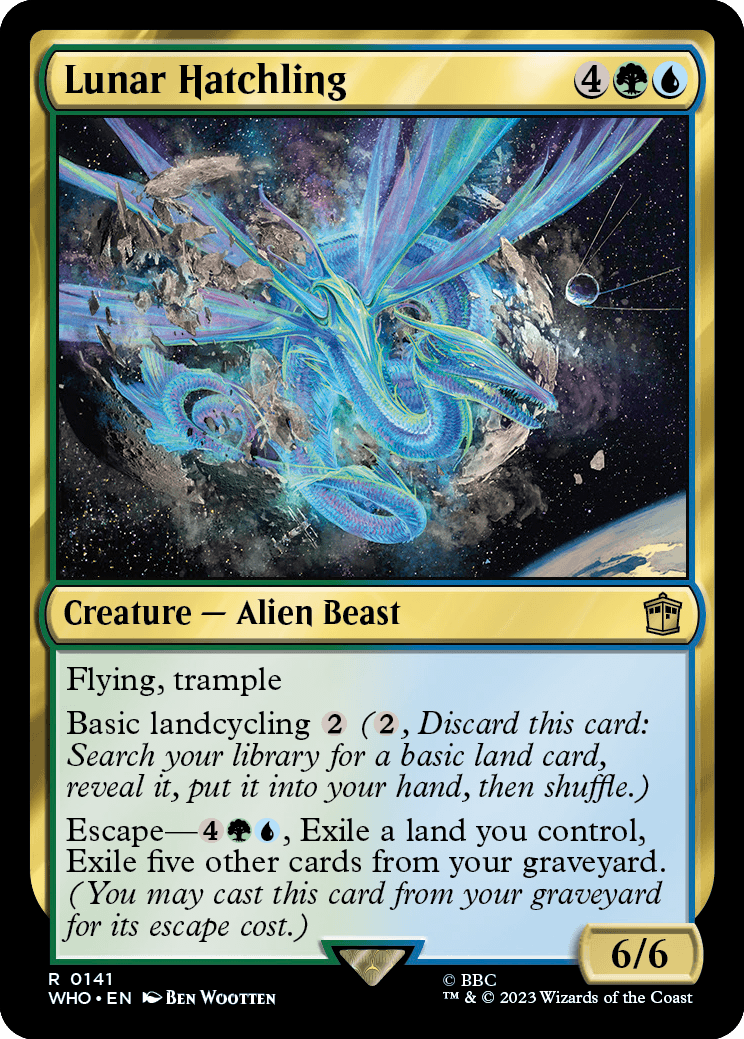
Lunar Hatchling
{4}{G}{U}
Creature — Alien Beast
6/6
Flying, trample
Basic landcycling {2} ({2}, Discard this card: Search your library for a basic land card, reveal it, put it into your hand, then shuffle.)
Escape—{4}{G}{U}, Exile a land you control, Exile five other cards from your graveyard. (You may cast this card from your graveyard for its escape cost.)
- Escape's permission doesn't change when you may cast the spell from your graveyard.
- To determine the total cost of a spell, start with the mana cost or alternative cost you're paying (such as an escape cost), add any cost increases, then apply any cost reductions. The mana value of the spell remains unchanged, no matter what the total cost to cast it was and no matter whether an alternative cost was paid.
- After an escaped permanent spell resolves, it enters the battlefield and will return to its owner's graveyard if it dies later.
- If a card has multiple abilities giving you permission to cast it, such as two escape abilities or an escape ability and a flashback ability, you choose which one to apply. The others have no effect.
- If you cast a spell with its escape permission, you can't choose to apply any other alternative costs or to cast it without paying its mana cost. If it has any additional costs, you must pay those.
- Once you begin casting a spell with escape, it immediately moves to the stack. Players can't take any other actions until you're done casting the spell.
- Unlike the normal cycling ability, basic landcycling doesn't allow you to draw a card. Instead, it lets you search your library for a basic land card. You don't choose the type of basic land card you'll find until you're performing the search. After you choose a basic land card in your library, you reveal it, put it into your hand, then shuffle your library.
- Basic landcycling is a form of cycling. Any ability that triggers on a card being cycled also triggers on a card being basic landcycled. Any ability that stops a cycling ability from being activated also stops a basic landcycling ability from being activated.

Madame Vastra
{2}{G}{U}
Legendary Creature — Lizard Detective
3/3
Partner with Jenny Flint (When this creature enters the battlefield, target player may put Jenny Flint into their hand from their library, then shuffle.)
Madame Vastra must be blocked if able.
Whenever a creature dealt damage by Madame Vastra this turn dies, create a Clue token and a Food token.
- If Madame Vastra is blocking or being blocked by another creature and both of those creatures are dealt lethal combat damage at the same time, they each die at the same time and the last ability will trigger.
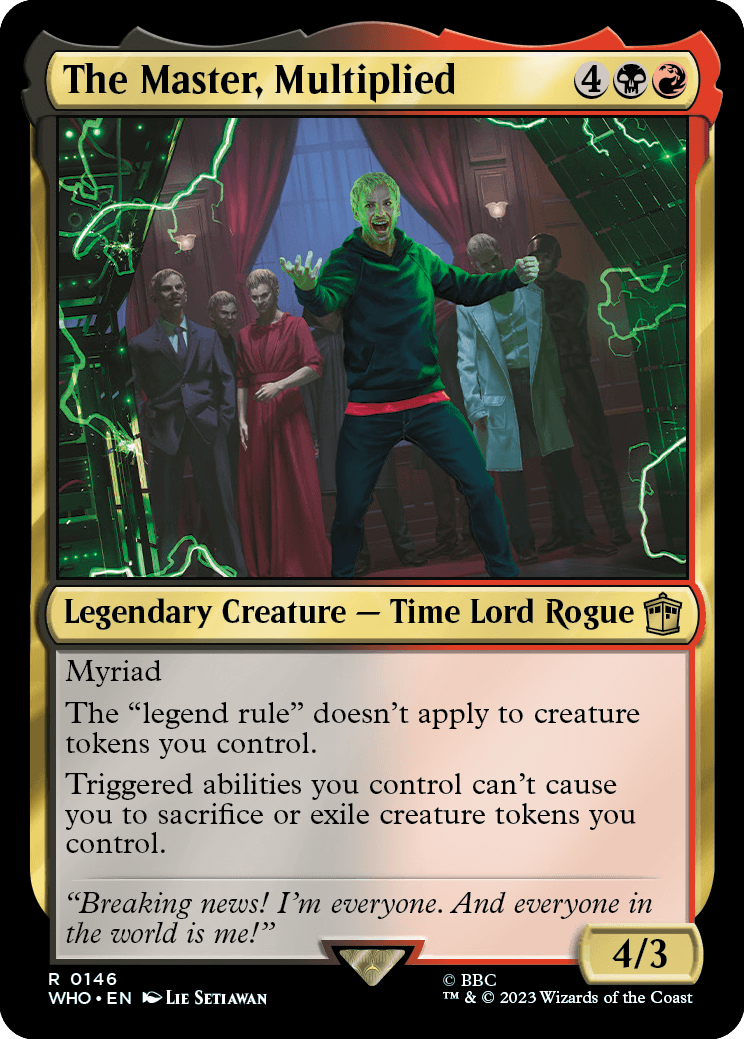
The Master, Multiplied
{4}{B}{R}
Legendary Creature — Time Lord Rogue
4/3
Myriad
The "legend rule" doesn't apply to creature tokens you control.
Triggered abilities you control can't cause you to sacrifice or exile creature tokens you control.
- Notably, the part of myriad that makes you exile the creature tokens at end of combat is a triggered ability. This means that the ability will trigger, but you won't exile the tokens when it resolves. Since the tokens also have myriad, attacking with each of them will cause that myriad ability to trigger, causing the Master to, well . . . multiply.
- The term "defending player" in the myriad rules (or any other ability of an attacking creature) refers to the player the creature with myriad was attacking at the time it became an attacking creature this combat, or the controller of the planeswalker or the protector of the battle the creature was attacking at the time it became an attacking creature this combat.
- If the defending player is your only opponent, no tokens are put onto the battlefield.
- You choose whether each token is attacking the player or a planeswalker they control as the token is created.
- Although the tokens enter the battlefield attacking, they were never declared as attackers. Abilities that trigger whenever a creature attacks won't trigger, including the myriad ability of the tokens. If there any costs to have a creature attack, those costs won't apply to the tokens.
- The token creatures all enter the battlefield at the same time.
- Each token copies exactly what was printed on the original creature and nothing else. It doesn't copy whether that creature is tapped or untapped, whether it has any counters on it or Auras and Equipment attached to it, or any non-copy effects that have changed its power, toughness, types, color, and so on.
- Any enters-the-battlefield abilities of the copied creature will trigger when the token enters the battlefield. Any "as [this permanent] enters the battlefield" or "[this permanent] enters the battlefield with" abilities of the copied creature will also work.
- If myriad creates more than one token for any given player (due to an effect such as the one Doubling Season creates), you may choose separately for each token whether it's attacking the player or a planeswalker they control.
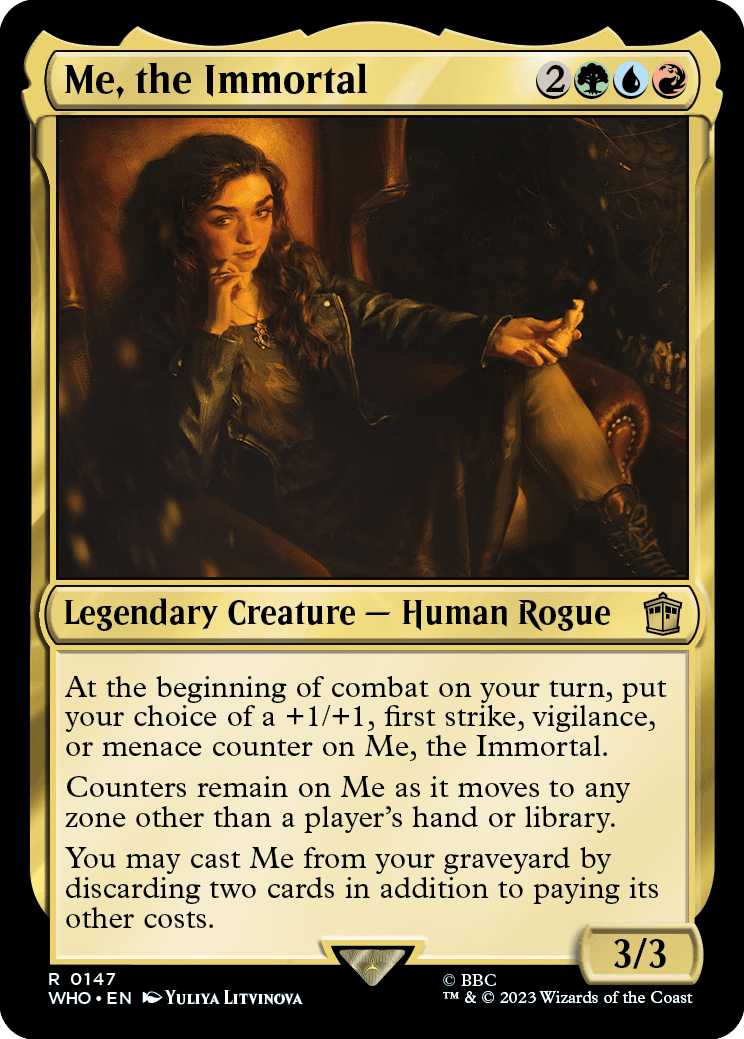
Me, the Immortal
{2}{G}{U}{R}
Legendary Creature — Human Rogue
3/3
At the beginning of combat on your turn, put your choice of a +1/+1, first strike, vigilance, or menace counter on Me, the Immortal.
Counters remain on Me as it moves to any zone other than a player's hand or library.
You may cast Me from your graveyard by discarding two cards in addition to paying its other costs.
- Ashildr retains . . . I mean Me, the Immortal retains all counters, not just those granted by the first ability.
- The counters that remain on Me as it changes zones aren't "put" on that card. Effects like Doubling Season's won't affect those counters.
- Counters that adjust power and/or toughness affect Me's power and/or toughness in zones other than the battlefield. For example, a Me in the command zone with a +1/+1 counter on it will be 4/4.
- Effects that last "for as long as that creature has a [kind of] counter on it," such as Aven Mimeomancer's, stop applying to Me, the immortal once it leaves the battlefield. Even though it retains the counters, it becomes a new object with no relation to its last existence in its previous zone.
- Me's second ability only works if it has that ability in the zone it's moving from. For example, with Yixlid Jailer ("Cards in graveyards lose all abilities") on the battlefield, a Me with a counter on it in a graveyard loses that counter when it's put onto the battlefield. Conversely, that Me moving from the graveyard to the battlefield would retain that counter if Humility ("All creatures lose all abilities and are 1/1") were on the battlefield; if Me then left the battlefield with Humility still on the battlefield, it would lose the counter.
- If a card becomes a copy of Me, counters will remain on that card as the copy leaves the battlefield (unless it goes to your hand or library). Once it does so, it stops being a copy of Me, so those counters will cease to exist when that card next changes zones.
- You must follow all normal timing rules when casting Me from your graveyard using Me's last ability.
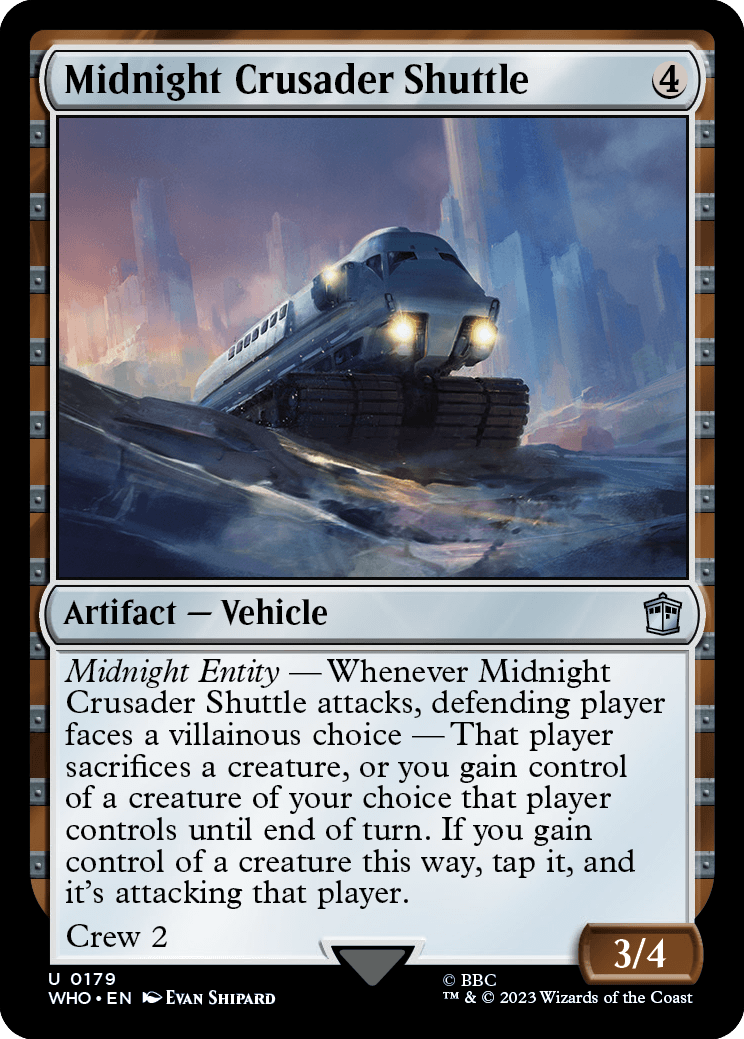
Midnight Crusader Shuttle
{4}
Artifact — Vehicle
3/4
Midnight Entity — Whenever Midnight Crusader Shuttle attacks, defending player faces a villainous choice — That player sacrifices a creature, or you gain control of a creature of your choice that player controls until end of turn. If you gain control of a creature this way, tap it, and it's attacking that player.
Crew 2
- When a creature becomes attacking this way, it wasn't declared as an attacker, so triggered abilities that trigger when a creature attacks won't trigger. Similar, all restrictions or costs to attack are ignored. For example, if the chosen creature has defender, it could still end up being an attacking creature this way.
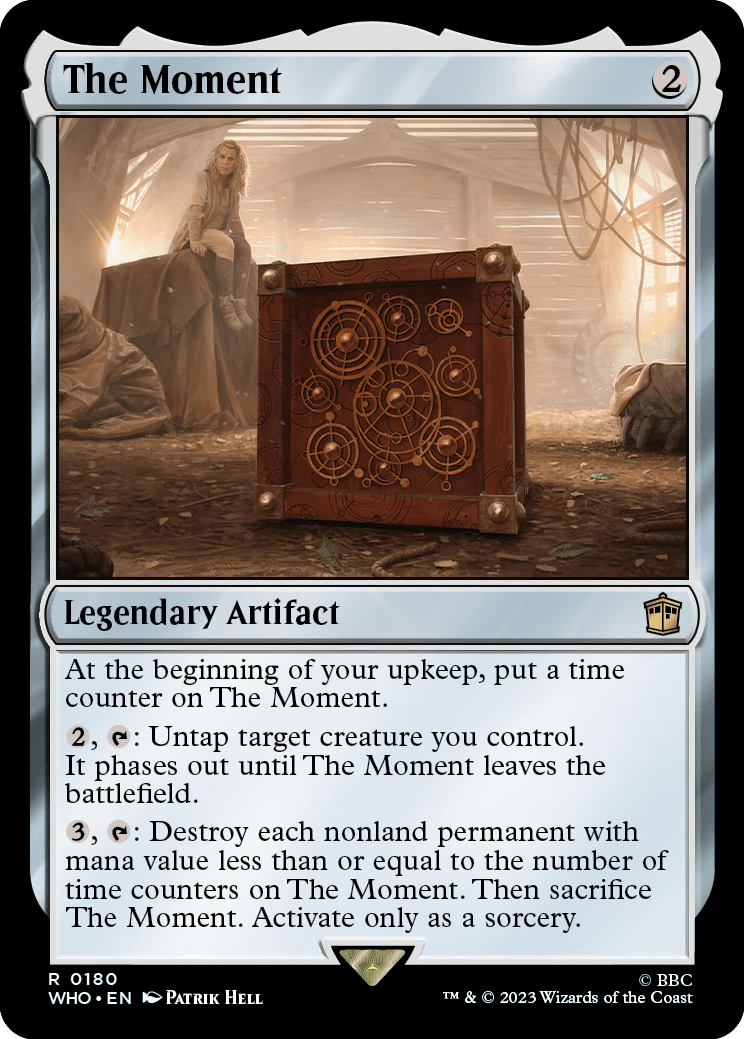
The Moment
{2}
Legendary Artifact
At the beginning of your upkeep, put a time counter on The Moment.
{2}, {T}: Untap target creature you control. It phases out until The Moment leaves the battlefield.
{3}, {T}: Destroy each nonland permanent with mana value less than or equal to the number of time counters on The Moment. Then sacrifice The Moment. Activate only as a sorcery.
- If The Moment leaves the battlefield before its first activated ability resolves, the target creature will be untapped, but won't phase out.
- The Moment's last ability will destroy itself before you can sacrifice it if there are two or more time counters on it as its last ability resolves. Effects that trigger when you sacrifice a permanent will not trigger when it is destroyed this way.
- While a permanent is phased out, it's treated as though it doesn't exist. It can't be the target of spells or abilities, its static abilities have no effect on the game, its triggered abilities can't trigger, it can't attack or block, and so on.
- An attacking or blocking creature that phases out is removed from combat.
- Phasing out doesn't cause any "leaves the battlefield" abilities to trigger. Similarly, phasing in won't cause any "enters the battlefield" abilities to trigger.
- Any one-shot effects that are waiting "until [this] leaves the battlefield," won't happen when a permanent phases out.
- Any continuous effects with a "for as long as" duration ignore phased-out objects. Any such effects will expire if their conditions are no longer met after ignoring the phased-out objects.
- Each Aura and Equipment attached to a permanent that's phasing out also phases out. They will phase in with that permanent and still be attached to it. Similarly, permanents that phase out with counters phase in with those counters.
- Choices made for permanents as they entered the battlefield are remembered when they phase in.
- A creature phased out by The Moment doesn't phase in during its controller's untap step as normal. Rather, it phases in immediately after The Moment leaves the battlefield.
- Abilities that trigger when a creature becomes tapped won't trigger when the creature phases in tapped.
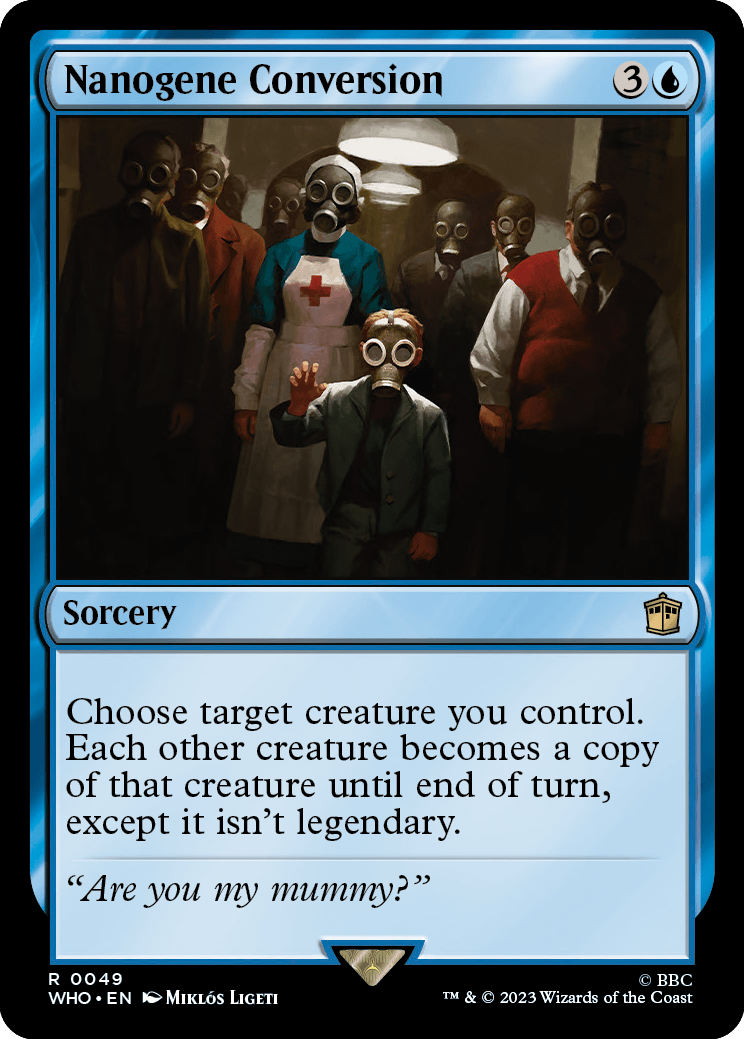
Nanogene Conversion
{3}{U}
Sorcery
Choose target creature you control. Each other creature becomes a copy of that creature until end of turn, except it isn't legendary.
- Each other creature copies the printed values of the targeted creature, except that they aren't legendary. They won't copy other effects that have changed the targeted creature's power, toughness, types, color, or so on. They also won't copy counters on the targeted creature (they'll each just retain the counters they already have).
- If the targeted creature is itself copying a creature, each other creature will become whatever it's copying, as modified by that copy effect.
- This effect can cause each other creature to stop being a creature. For example, if you target an animated Vehicle, only the printed wording will be copied—the crew effect that is making it a creature until end of turn won't be copied. Each other creature will become an unanimated copy of that Vehicle.
- Non-copy effects that have already applied to the other creatures will continue to apply to them. For example, if Giant Growth had given one of them +3/+3 earlier in the turn, then Nanogene Conversion made it a copy of Bear Cub, it will be a 5/5 Bear Cub.
- If the targeted creature is a token, each other creature copies the original characteristics of that token as stated by the effect that created the token. Those creatures don't become tokens.
- As the turn ends, the other creatures revert to what they were before. If two Nanogene Conversions are cast on the same turn, they'll both wear off at the same time.
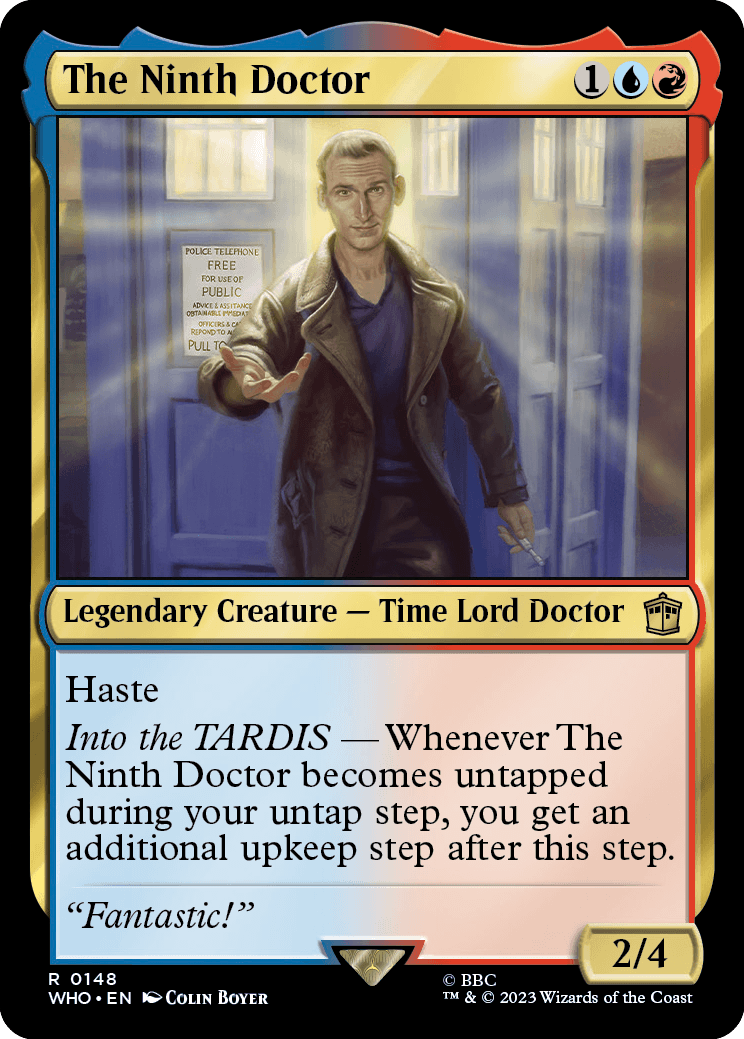
The Ninth Doctor
{1}{U}{R}
Legendary Creature — Time Lord Doctor
2/4
Haste
Into the TARDIS — Whenever The Ninth Doctor becomes untapped during your untap step, you get an additional upkeep step after this step.
- The Ninth Doctor's ability triggers during the untap step and goes onto the stack at the beginning of the next step (usually the upkeep). The additional upkeep is taken after that step, not after the untap step.
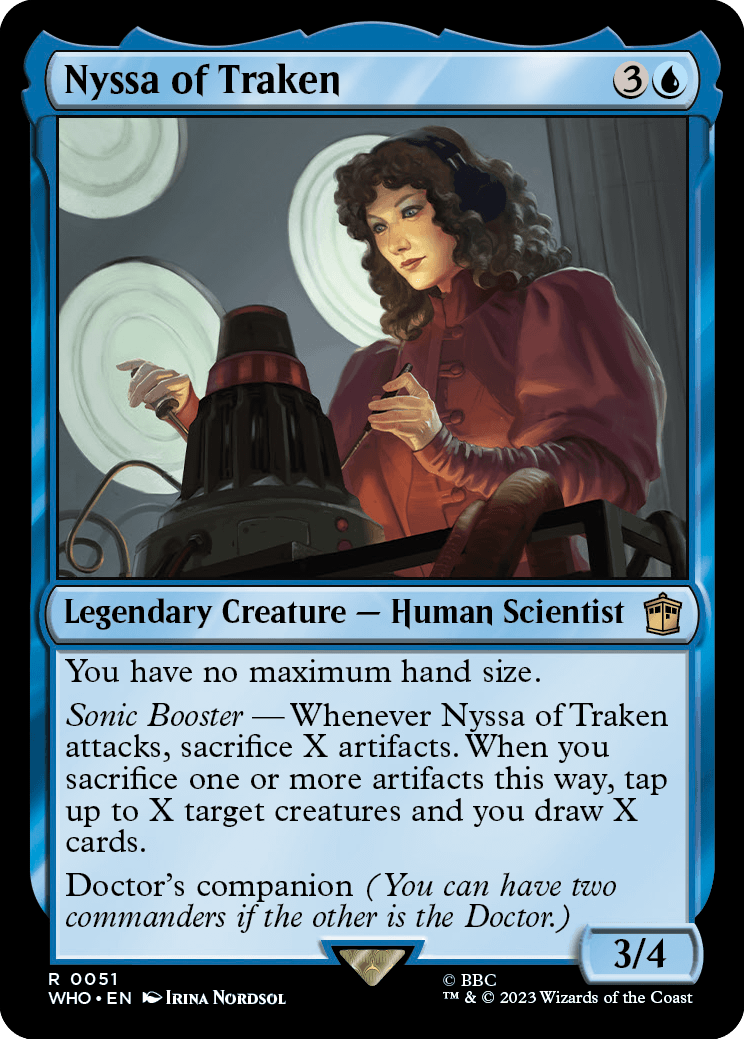
Nyssa of Traken
{3}{U}
Legendary Creature — Human Scientist
3/4
You have no maximum hand size.
Sonic Booster — Whenever Nyssa of Traken attacks, sacrifice X artifacts. When you sacrifice one or more artifacts this way, tap up to X target creatures and you draw X cards.
Doctor's companion (You can have two commanders if the other is the Doctor.)
- You can choose fewer than X targets for Nyssa's reflexive triggered ability. The number of targets doesn't change the number of cards drawn.
- If you chose at least one target and all targets are illegal as the ability tries to resolve, the ability is removed from the stack and does nothing. You will not draw any cards in this case.
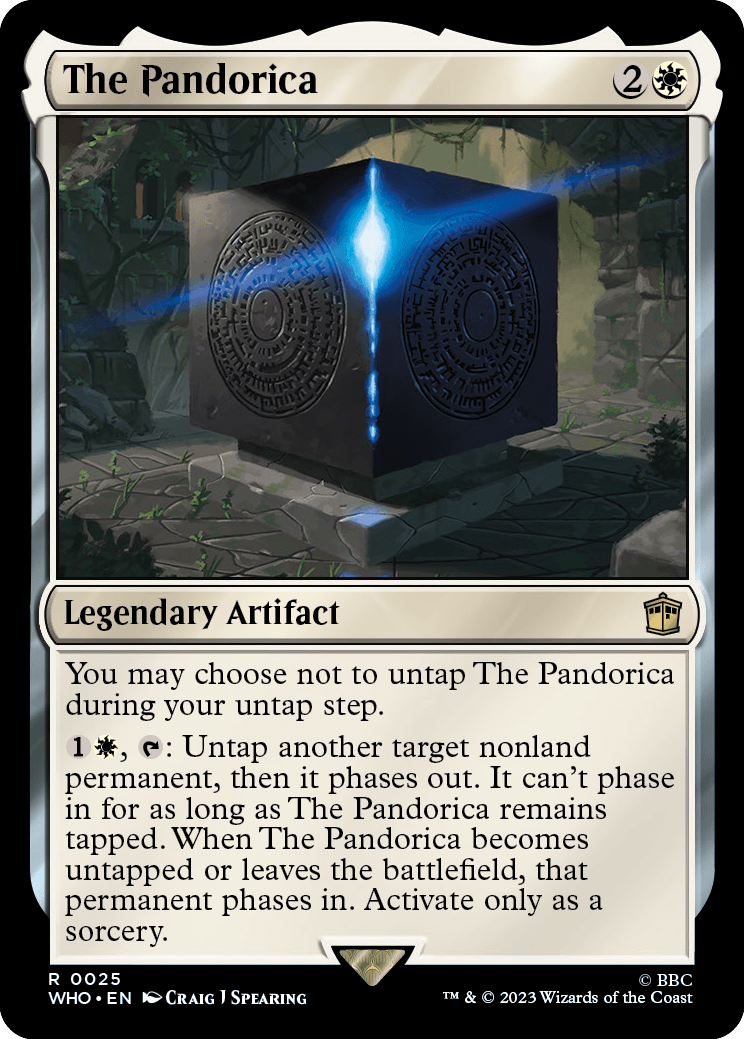
The Pandorica
{2}{W}
Legendary Artifact
You may choose not to untap The Pandorica during your untap step.
{1}{W}, {T}: Untap another target nonland permanent, then it phases out. It can't phase in for as long as The Pandorica remains tapped. When The Pandorica becomes untapped or leaves the battlefield, that permanent phases in. Activate only as a sorcery.
- While a permanent is phased out, it's treated as though it doesn't exist. It can't be the target of spells or abilities, its static abilities have no effect on the game, its triggered abilities can't trigger, it can't attack or block, and so on.
- Phasing out doesn't cause any "leaves the battlefield" abilities to trigger. Similarly, phasing in won't cause any "enters the battlefield" abilities to trigger.
- Any one-shot effects that are waiting "until [this] leaves the battlefield," won't happen when a permanent phases out.
- Any continuous effects with a "for as long as" duration ignore phased-out objects. Any such effects will expire if their conditions are no longer met after ignoring the phased-out objects.
- Each Aura and Equipment attached to a permanent that's phasing out also phases out. They will phase in with that permanent and still be attached to it. Similarly, permanents that phase out with counters phase in with those counters.
- Choices made for permanents as they entered the battlefield are remembered when they phase in.
- Abilities that trigger when a creature becomes tapped won't trigger when a creature phases in tapped.
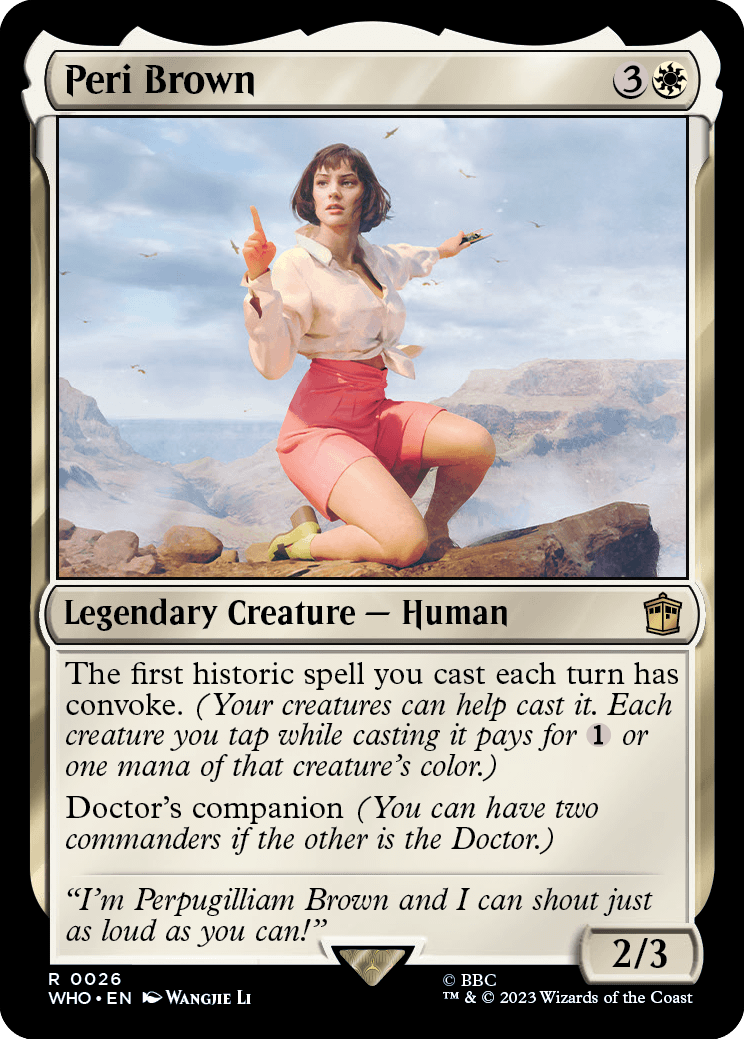
Peri Brown
{3}{W}
Legendary Creature — Human
2/3
The first historic spell you cast each turn has convoke. (Your creatures can help cast it. Each creature you tap while casting it pays for {1} or one mana of that creature's color.)
Doctor's companion (You can have two commanders if the other is the Doctor.)
- You can tap any untapped creature you control to convoke a spell, even one you haven't controlled continuously since the beginning of your most recent turn.
- When calculating a spell's total cost, include any alternative costs, additional costs, or anything else that increases or reduces the cost to cast the spell. Convoke applies after the total cost is calculated. Convoke doesn't change a spell's mana cost or mana value.
- If a creature you control has a mana ability with {T} in the cost, activating that ability while casting a spell with convoke will result in the creature being tapped before you pay the spell's costs. You won't be able to tap it again for convoke. Similarly, if you sacrifice a creature to activate a mana ability while casting a spell with convoke, that creature won't be on the battlefield when you pay the spell's costs, so you won't be able to tap it for convoke.
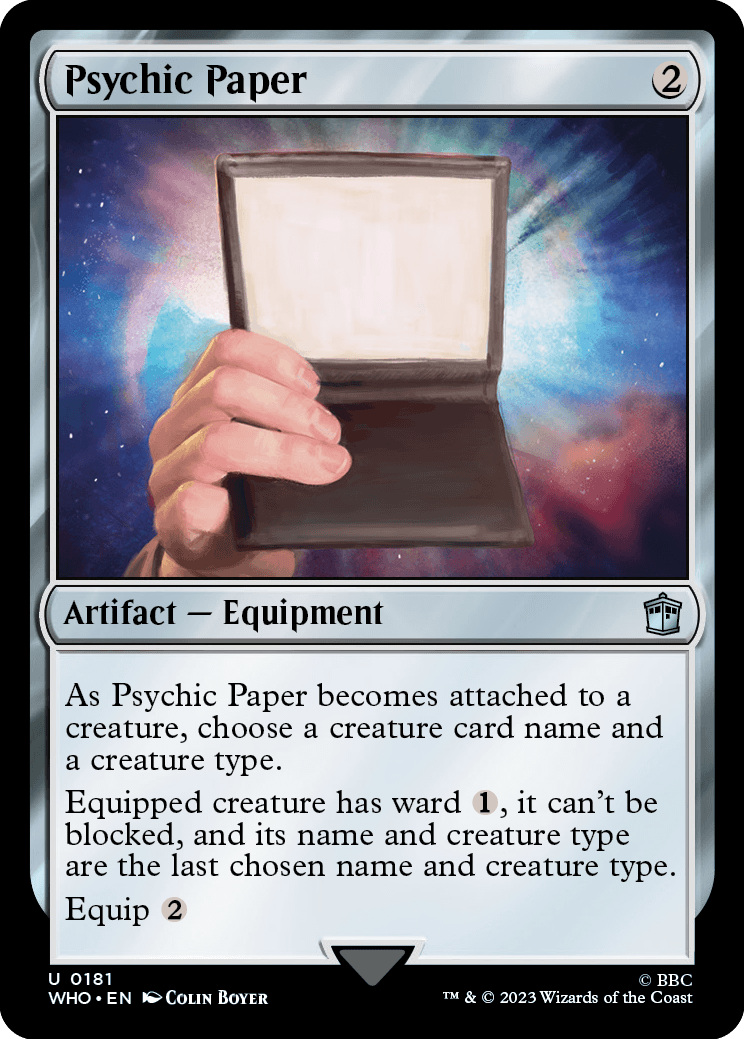
Psychic Paper
{2}
Artifact — Equipment
As Psychic Paper becomes attached to a creature, choose a creature card name and a creature type.
Equipped creature has ward {1}, it can't be blocked, and its name and creature type are the last chosen name and creature type.
Equip {2}
- You must choose an existing creature type, such as Time Lord, Vampire, or Warrior. Card types (such as artifact) and supertypes (such as legendary) can't be chosen.
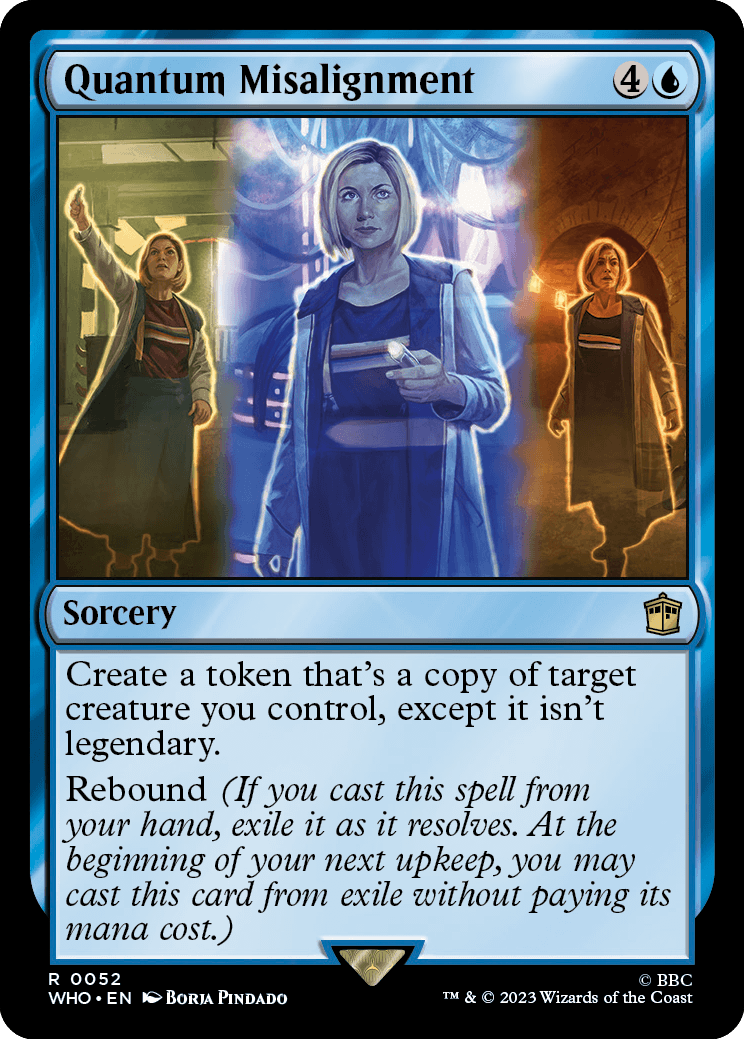
Quantum Misalignment
{4}{U}
Sorcery
Create a token that's a copy of target creature you control, except it isn't legendary.
Rebound (If you cast this spell from your hand, exile it as it resolves. At the beginning of your next upkeep, you may cast this card from exile without paying its mana cost.)
- The token copies exactly what was printed on the original creature and nothing else (unless that creature is copying something else or is a token; see below). It doesn't copy whether that creature is tapped or untapped, whether it has any counters on it or Auras and Equipment attached to it, or any non-copy effects that have changed its power, toughness, types, color, or so on.
- If the copied creature has {X} in its mana cost, X is considered to be 0.
- If the copied creature is a token, the token that's created copies the original characteristics of that token as stated by the effect that created the token.
- If the copied creature is copying something else (for example, if the copied creature is an Evil Twin), then the token enters the battlefield as whatever that creature copied.
- Any enters-the-battlefield abilities of the copied creature will trigger when the token enters the battlefield. Any "as [this creature] enters the battlefield" or "[this creature] enters the battlefield with" abilities of the chosen creature will also work.
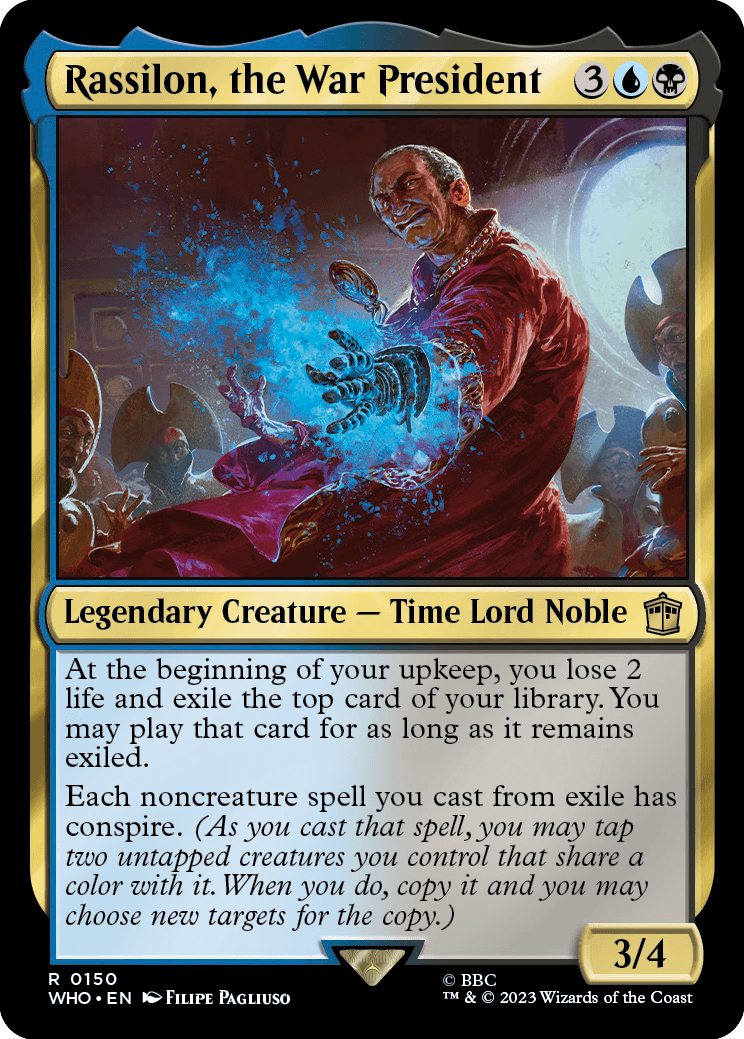
Rassilon, the War President
{3}{U}{B}
Legendary Creature — Time Lord Noble
3/4
At the beginning of your upkeep, you lose 2 life and exile the top card of your library. You may play that card for as long as it remains exiled.
Each noncreature spell you cast from exile has conspire. (As you cast that spell, you may tap two untapped creatures you control that share a color with it. When you do, copy it and you may choose new targets for the copy.)
- You must pay all costs and follow all normal timing rules for playing a card exiled this way. For example, you may play a land this way only during your main phase while the stack is empty.
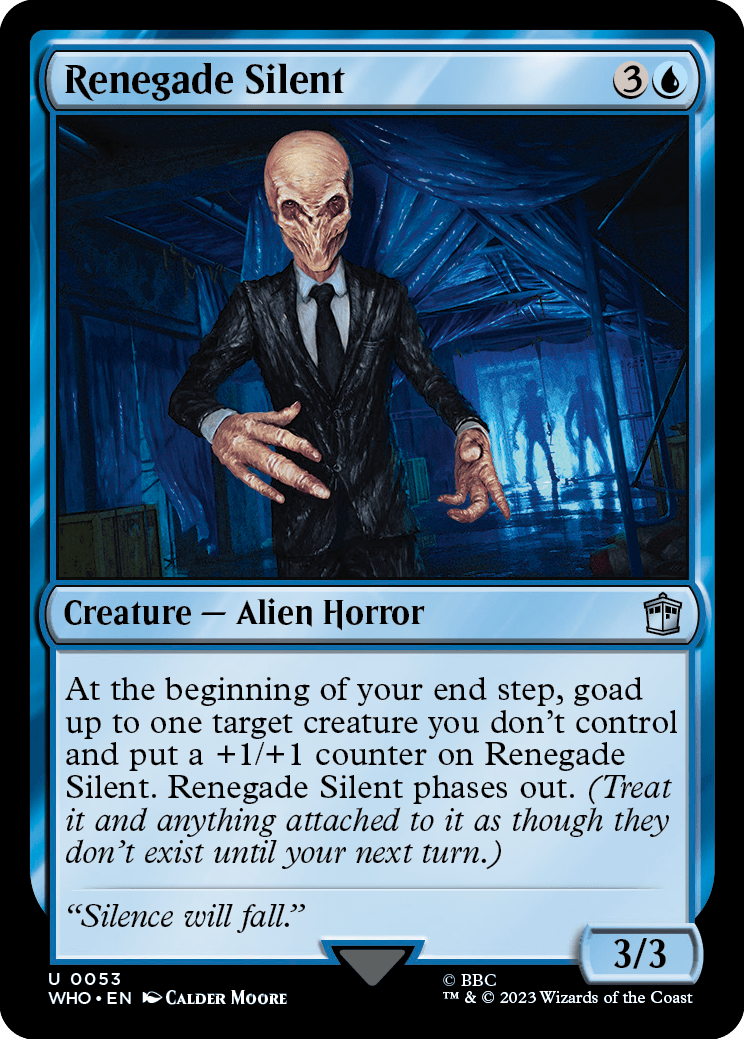
Renegade Silent
{3}{U}
Creature — Alien Horror
3/3
At the beginning of your end step, goad up to one target creature you don't control and put a +1/+1 counter on Renegade Silent. Renegade Silent phases out. (Treat it and anything attached to it as though they don't exist until your next turn.)
- Phased-out permanents are treated as though they don't exist. They can't be the targets of spells or abilities, their static abilities have no effect on the game, their triggered abilities can't trigger, they can't attack or block, and so on.
- As Renegade Silent phases out, Auras and Equipment attached to it also phase out at the same time. Those Auras and Equipment will phase in at the same time Renegade Silent does, and they'll phase in still attached to Renegade Silent. Similarly, it will phase in with any counters it had on it.
- Permanents phase back in during their controller's untap step, immediately before that player untaps their permanents. Creatures that phase in this way are able to attack and pay a cost of {T} during that turn.
- Phasing out doesn't cause any "leaves the battlefield" abilities to trigger. Similarly, phasing in won't cause any "enters the battlefield" abilities to trigger.
- Any continuous effects with a "for as long as" duration, such as that of Mind Flayer, ignore phased-out objects. If ignoring those objects causes the effect's conditions to no longer be met, the duration will expire.
- Choices made for permanents as they entered the battlefield are remembered when they phase in.
- If an opponent gains control of your Renegade Silent until end of turn, it will phase out while they still have control of it. The control-changing effect ends while it is phased out, and it phases in under your control as that opponent's next untap step begins. If they leave the game before their next untap step, Renegade Silent phases in as the next untap step begins after their turn would have begun.
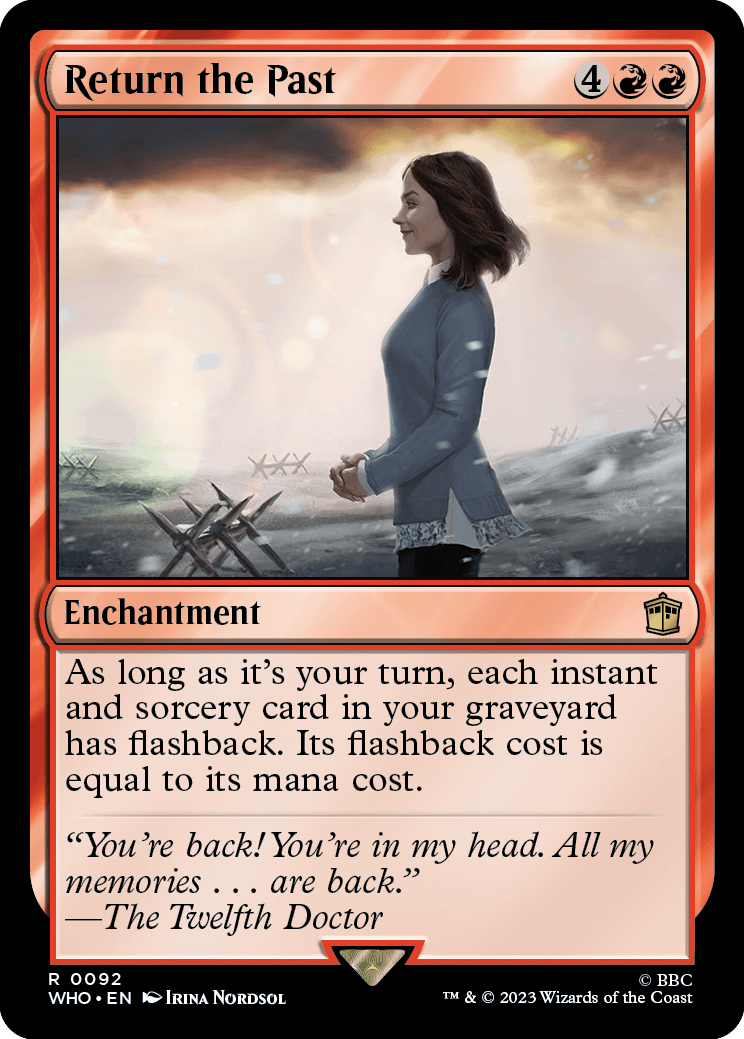
Return the Past
{4}{R}{R}
Enchantment
As long as it's your turn, each instant and sorcery card in your graveyard has flashback. Its flashback cost is equal to its mana cost.
- "Flashback [cost]" means "You may cast this card from your graveyard by paying [cost] rather than paying its mana cost" and "If the flashback cost was paid, exile this card instead of putting it anywhere else any time it would leave the stack."
- You must still follow any timing restrictions and permissions, including those based on the card's type. For instance, you can cast a sorcery using flashback only when you could normally cast a sorcery.
- To determine the total cost of a spell, start with the mana cost or alternative cost (such as a flashback cost) you're paying, add any cost increases, then apply any cost reductions. The mana value of the spell is determined only by its mana cost, no matter what the total cost to cast the spell was.
- A spell cast using flashback will always be exiled afterward, whether it resolves, is countered, or leaves the stack in some other way.
- You can cast a spell using flashback even if it was somehow put into your graveyard without having been cast.
- If a card is put into your graveyard during your turn, you can cast it with flashback if it's legal to do so before any other player can take any actions.
- If you cast an instant or sorcery with {X} in its mana cost this way, you still choose the value of X as part of casting the spell and pay that cost.
- If you cast a spell with flashback, you can't pay any alternative costs such as overload costs. You can pay additional costs such as kicker costs. If the spell has any mandatory additional costs, you must pay those to cast the spell with flashback.
- If a card has multiple instances of flashback, you may choose any of its flashback costs to pay.
- If a split card gains flashback, you pay only the cost of the half you're casting.
- If a card with no mana cost gains flashback, it has no flashback cost. It can't be cast this way.
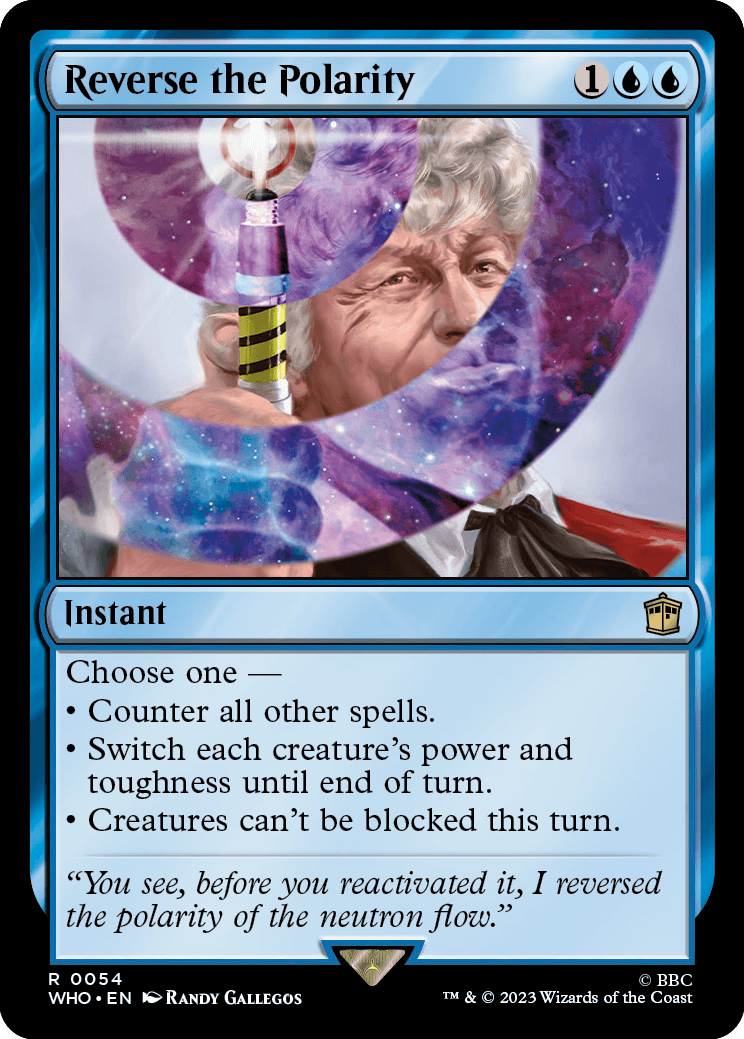
Reverse the Polarity
{1}{U}{U}
Instant
Choose one —
• Counter all other spells.
• Switch each creature's power and toughness until end of turn.
• Creatures can't be blocked this turn.
- Effects that switch a creature's power and toughness apply after all other effects, regardless of when those effects began to apply. For instance, if you switch a 2/4 creature's power and toughness and then give it +2/+0 later in the turn, it's a 4/4 creature, not a 6/2 creature.
- Because damage remains marked on a creature until the cleanup step or an effect removes that damage, nonlethal damage dealt to a creature may become lethal if you switch its power and toughness during that turn.
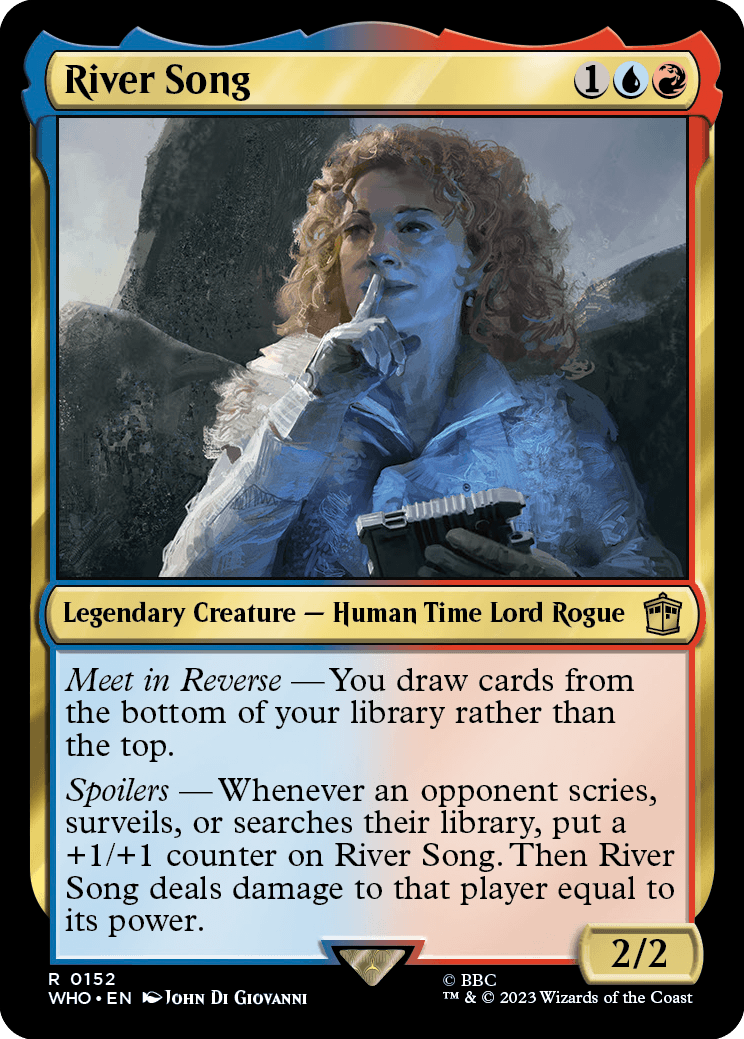
River Song
{1}{U}{R}
Legendary Creature — Human Time Lord Rogue
2/2
Meet in Reverse — You draw cards from the bottom of your library rather than the top.
Spoilers — Whenever an opponent scries, surveils, or searches their library, put a +1/+1 counter on River Song. Then River Song deals damage to that player equal to its power.
- Drawing cards from the bottom of your library is exactly the same as drawing from the top, except that you take the bottom card of your library and put it into your hand.
- River Song's first ability applies to all cards you draw while it is on the battlefield, not just the card you draw for your turn.
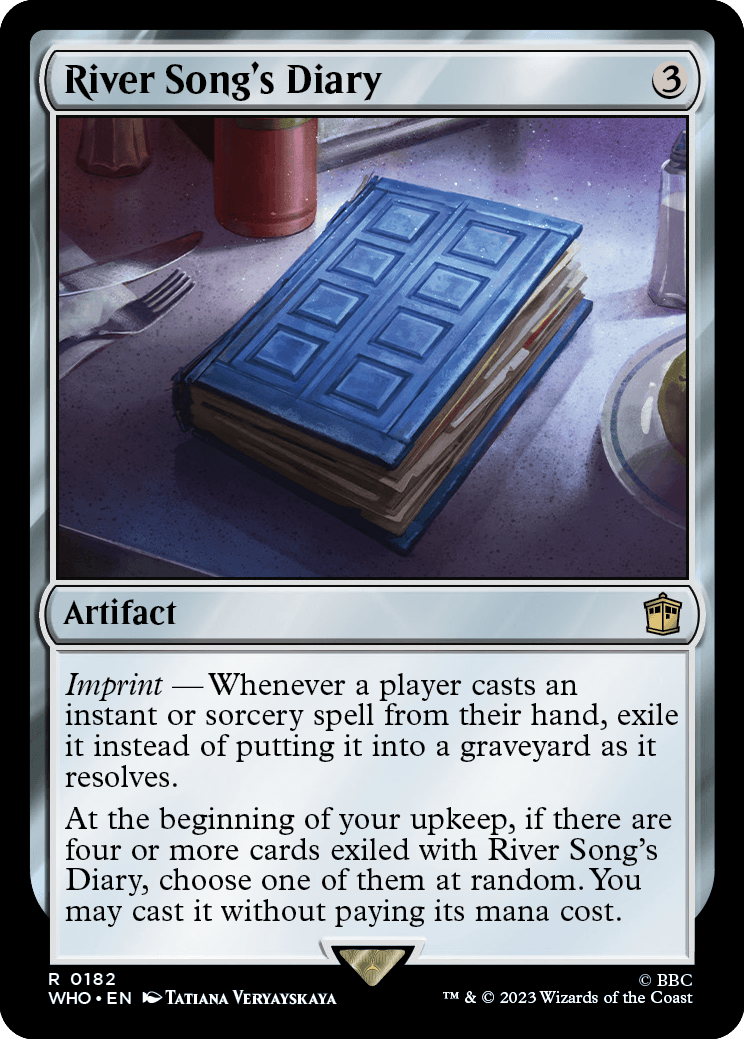
River Song's Diary
{3}
Artifact
Imprint — Whenever a player casts an instant or sorcery spell from their hand, exile it instead of putting it into a graveyard as it resolves.
At the beginning of your upkeep, if there are four or more cards exiled with River Song's Diary, choose one of them at random. You may cast it without paying its mana cost.
- You cast the spell as part of the resolution of the last ability. You can't wait and cast the spell at a later time.
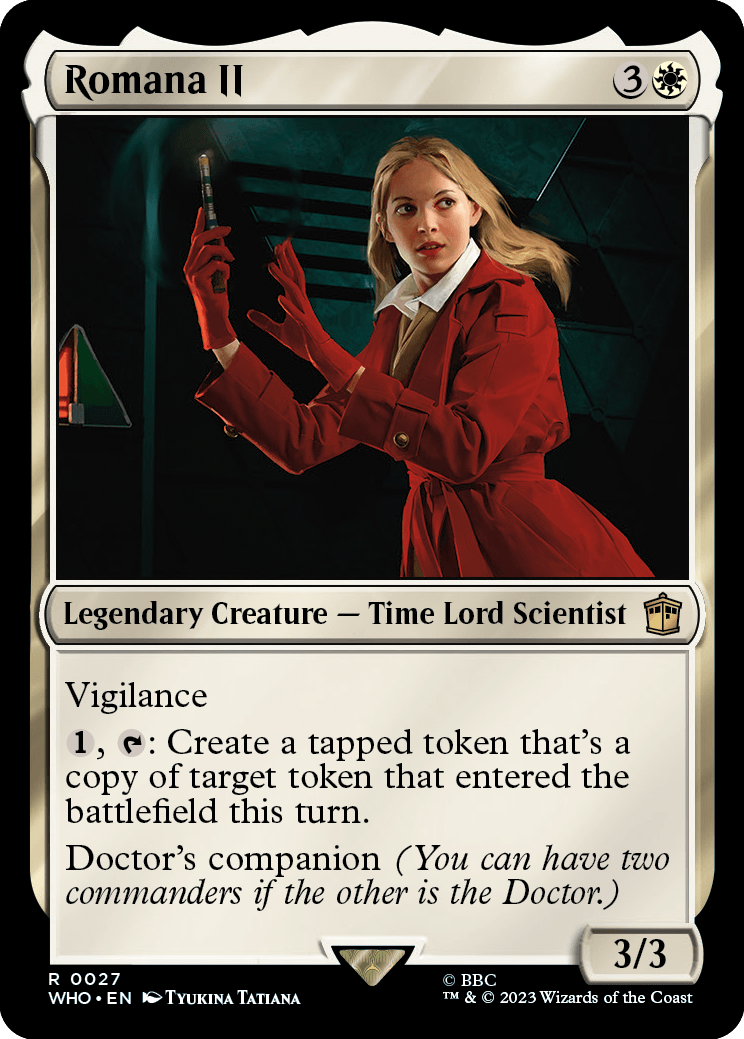
Romana II
{3}{W}
Legendary Creature — Time Lord Scientist
3/3
Vigilance
{1}, {T}: Create a tapped token that's a copy of target token that entered the battlefield this turn.
Doctor's companion (You can have two commanders if the other is the Doctor.)
- The token you create copies the original characteristics of the token as stated by the effect that created that token (unless that token is copying something else; see below). It doesn't copy whether that token is tapped or untapped, whether it has any counters on it or Auras and Equipment attached to it, or any non-copy effects that have changed its power, toughness, types, color, or so on.
- If the copied token has {X} in its mana cost, X is considered to be 0.
- If the copied token is copying something else (for example, if the copied token is one previously created by this ability), then the token enters the battlefield as whatever that token copied.
- Any enters-the-battlefield abilities of the copied token will trigger when the token enters the battlefield. Any "as [this permanent] enters the battlefield" or "[this permanent] enters the battlefield with" abilities of the chosen token will also work.
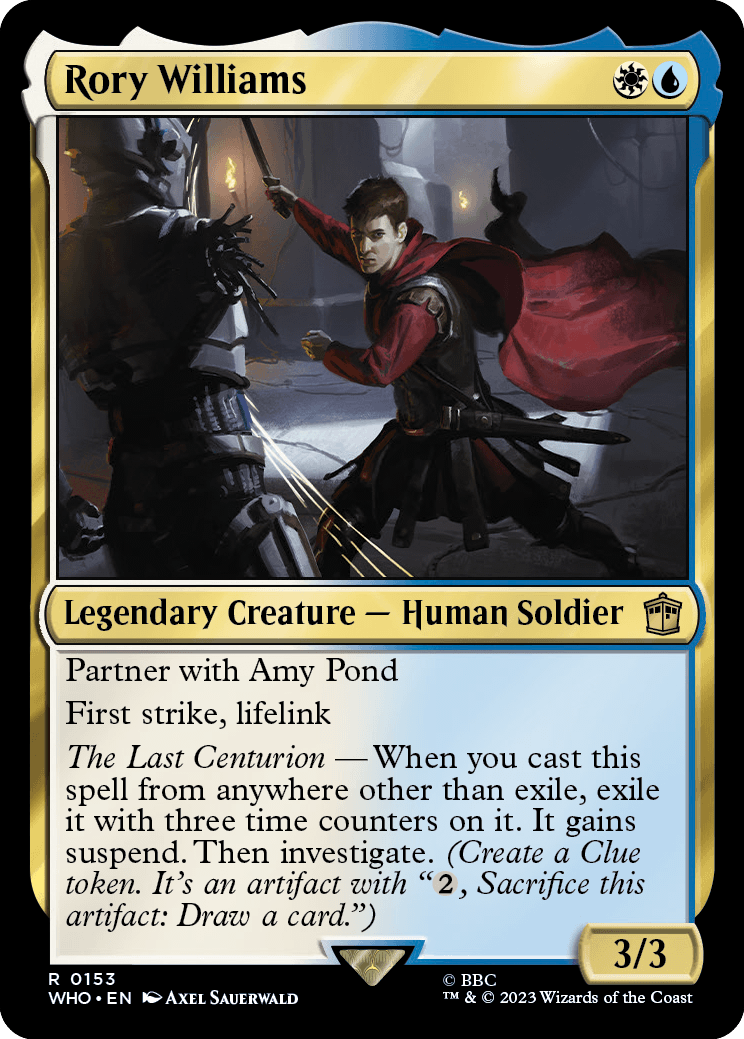
Rory Williams
{W}{U}
Legendary Creature — Human Soldier
3/3
Partner with Amy Pond
First strike, lifelink
The Last Centurion — When you cast this spell from anywhere other than exile, exile it with three time counters on it. It gains suspend. Then investigate. (Create a Clue token. It's an artifact with "{2}, Sacrifice this artifact: Draw a card.")
- For example, if you cast Rory Williams from your hand, the triggered ability will exile it and it will gain suspend. When you cast it from exile, it resolves normally.
- If you somehow counter the ability that triggers when you cast Rory Williams, it will resolve normally and will not be exiled.
- Rory will resolve normally if cast from exile for any reason, not only if it was cast with its suspend ability.
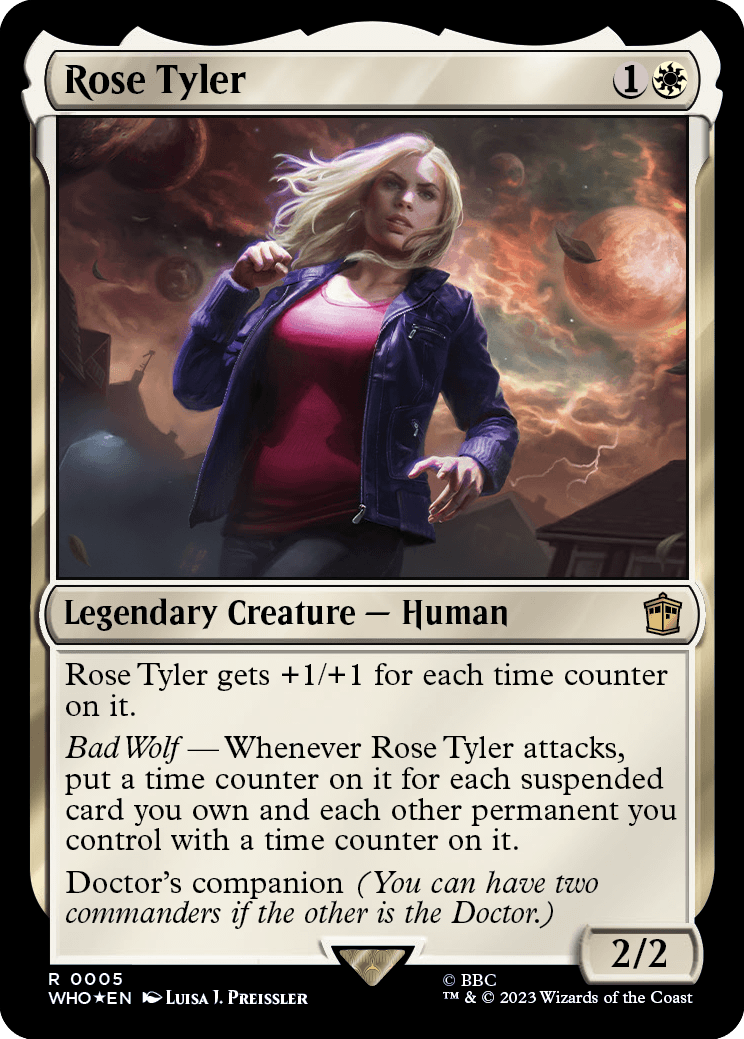
Rose Tyler
{1}{W}
Legendary Creature — Human
2/2
Rose Tyler gets +1/+1 for each time counter on it.
Bad Wolf — Whenever Rose Tyler attacks, put a time counter on it for each suspended card you own and each other permanent you control with a time counter on it.
Doctor's companion (You can have two commanders if the other is the Doctor.)
- A suspended card is a card in exile with suspend that has at least one time counter on it. That includes any cards which were put there by an effect that says they "gain suspend" or similar.
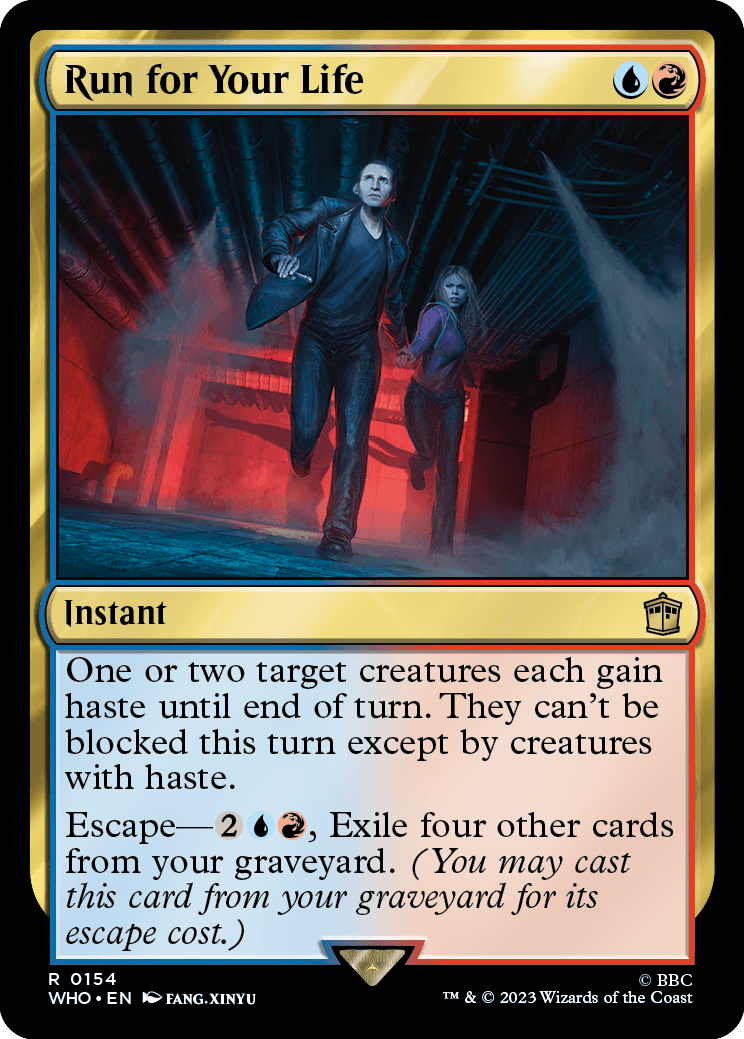
Run for Your Life
{U}{R}
Instant
One or two target creatures each gain haste until end of turn. They can't be blocked this turn except by creatures with haste.
Escape—{2}{U}{R}, Exile four other cards from your graveyard. (You may cast this card from your graveyard for its escape cost.)
- To determine the total cost of a spell, start with the mana cost or alternative cost you're paying (such as an escape cost), add any cost increases, then apply any cost reductions. The mana value of the spell remains unchanged, no matter what the total cost to cast it was and no matter whether an alternative cost was paid.
- If a card has multiple abilities giving you permission to cast it, such as two escape abilities or an escape ability and a flashback ability, you choose which one to apply. The others have no effect.
- If you cast a spell with its escape permission, you can't choose to apply any other alternative costs or to cast it without paying its mana cost. If it has any additional costs, you must pay those.
- Once you begin casting a spell with escape, it immediately moves to the stack. Players can't take any other actions until you're done casting the spell.
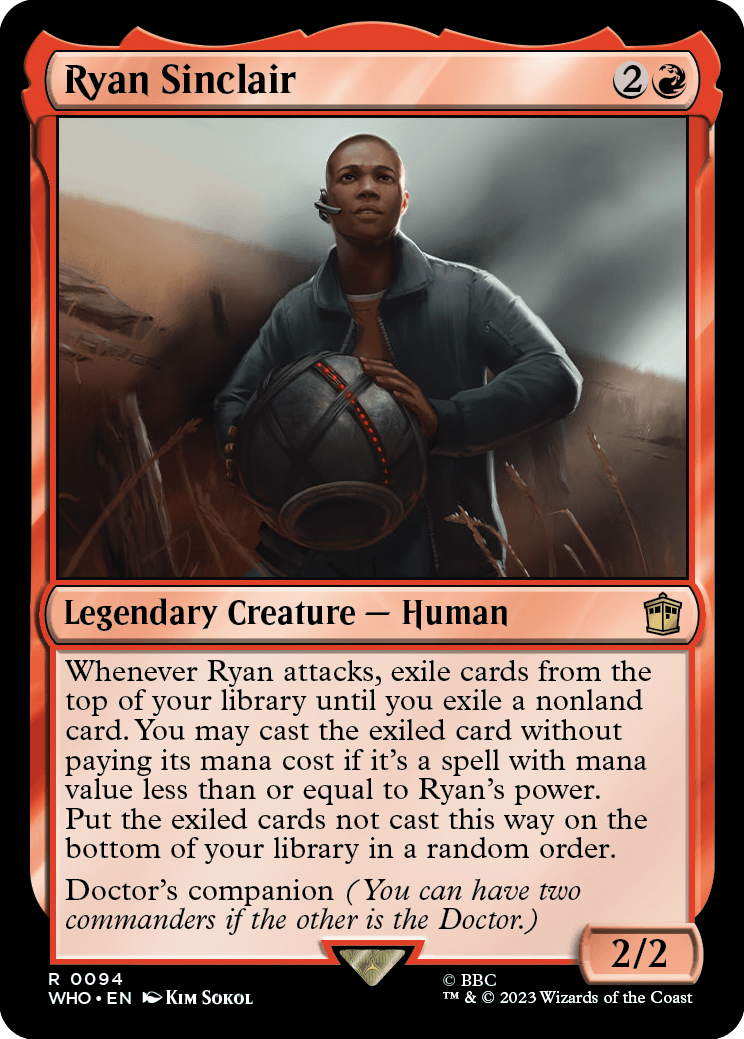
Ryan Sinclair
{2}{R}
Legendary Creature — Human
2/2
Whenever Ryan attacks, exile cards from the top of your library until you exile a nonland card. You may cast the exiled card without paying its mana cost if it's a spell with mana value less than or equal to Ryan's power. Put the exiled cards not cast this way on the bottom of your library in a random order.
Doctor's companion (You can have two commanders if the other is the Doctor.)
- You cast the spell as part of the resolution of Ryan's triggered ability. You can't wait and cast the spell at a later time.
- You may pay optional additional costs to cast that spell, such as kicker costs. If it has any mandatory additional costs, you must pay those.
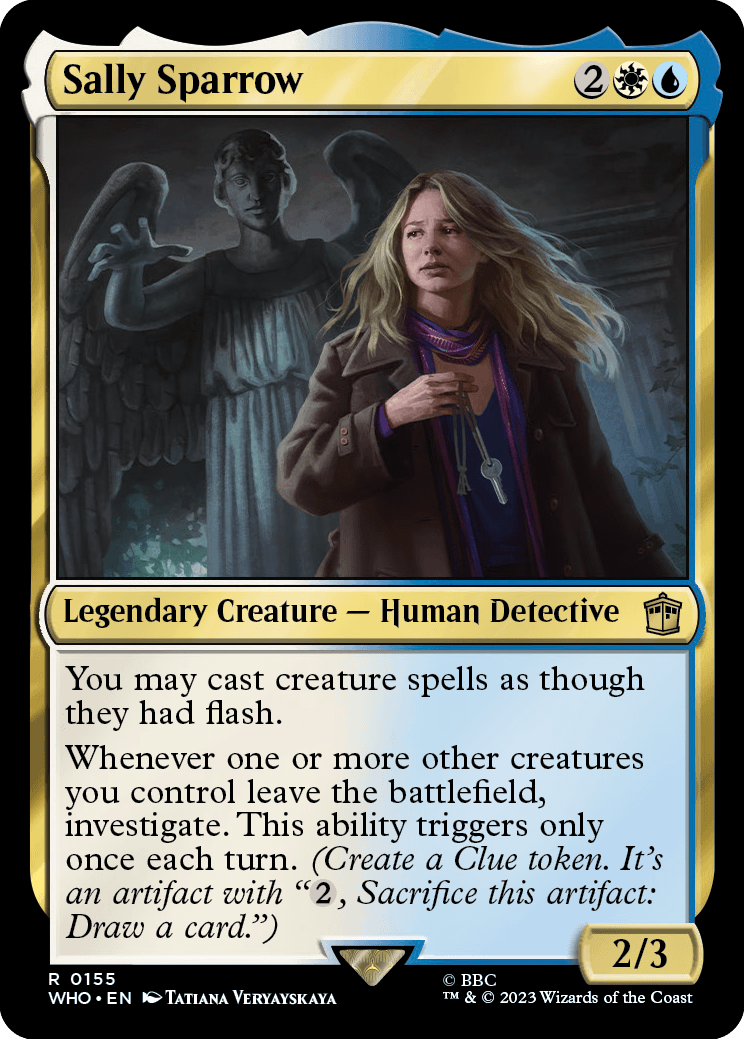
Sally Sparrow
{2}{W}{U}
Legendary Creature — Human Detective
2/3
You may cast creature spells as though they had flash.
Whenever one or more other creatures you control leave the battlefield, investigate. This ability triggers only once each turn. (Create a Clue token. It's an artifact with "{2}, Sacrifice this artifact: Draw a card.")
- If Sally Sparrow leaves the battlefield at the same time as the other creatures, its last ability will trigger.
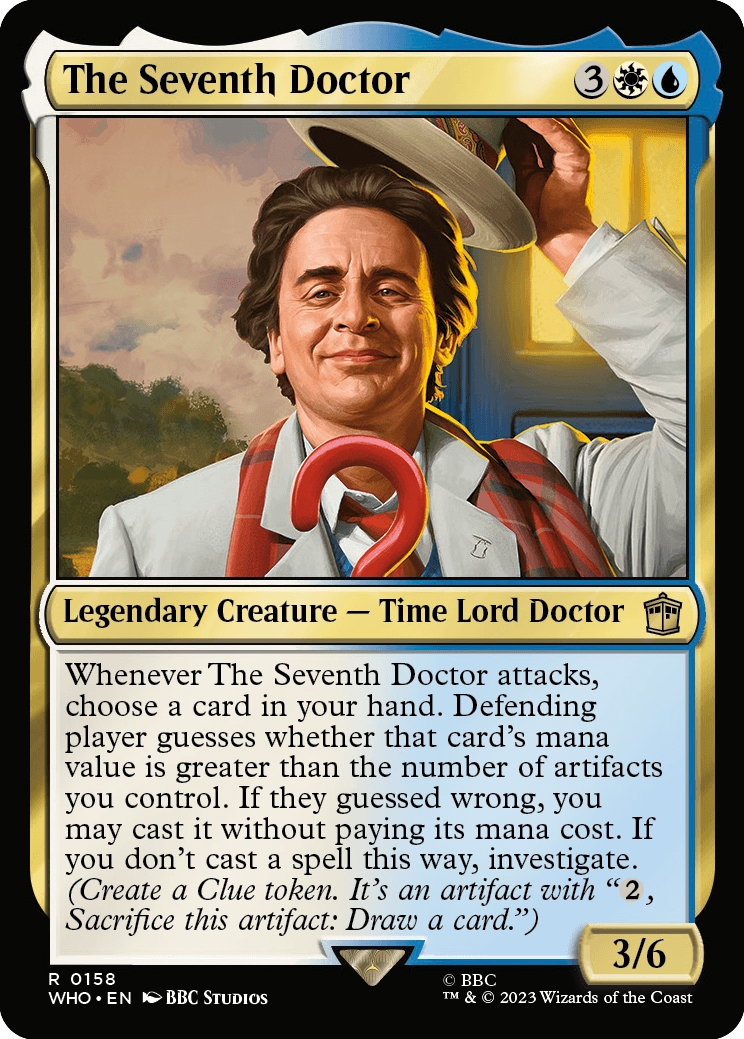
The Seventh Doctor
{3}{W}{U}
Legendary Creature — Time Lord Doctor
3/6
Whenever The Seventh Doctor attacks, choose a card in your hand. Defending player guesses whether that card's mana value is greater than the number of artifacts you control. If they guessed wrong, you may cast it without paying its mana cost. If you don't cast a spell this way, investigate. (Create a Clue token. It's an artifact with "{2}, Sacrifice this artifact: Draw a card.")
- To choose a card in your hand for The Seventh Doctor's ability, take a card in your hand and separate it from the others, face down. Then the defending player guesses whether the mana value of that card is greater than the number of artifacts you control. You do not have to reveal whether they guess right or wrong unless you are casting the card.
- If the card you chose has an {X} in its mana cost, the value of X is 0.
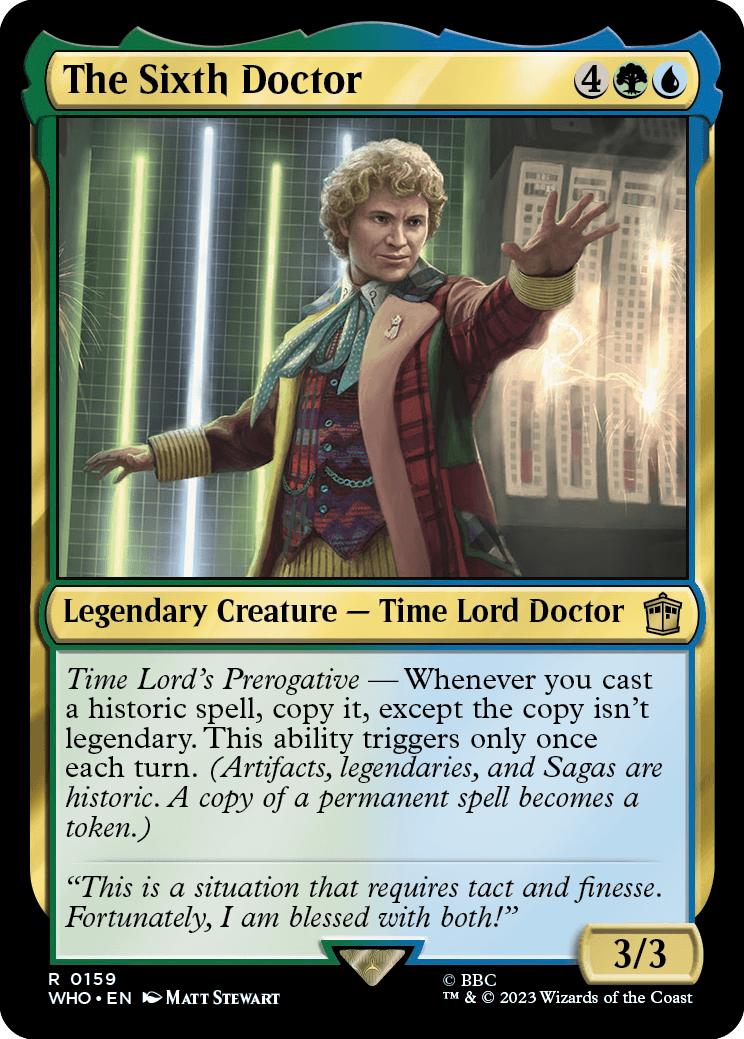
The Sixth Doctor
{4}{G}{U}
Legendary Creature — Time Lord Doctor
3/3
Time Lord's Prerogative — Whenever you cast a historic spell, copy it, except the copy isn't legendary. This ability triggers only once each turn. (Artifacts, legendaries, and Sagas are historic. A copy of a permanent spell becomes a token.)
- Usually, a historic spell won't have any targets. However, if it does have one or more targets, those targets will remain the same for the copy. You won't get to choose new targets.
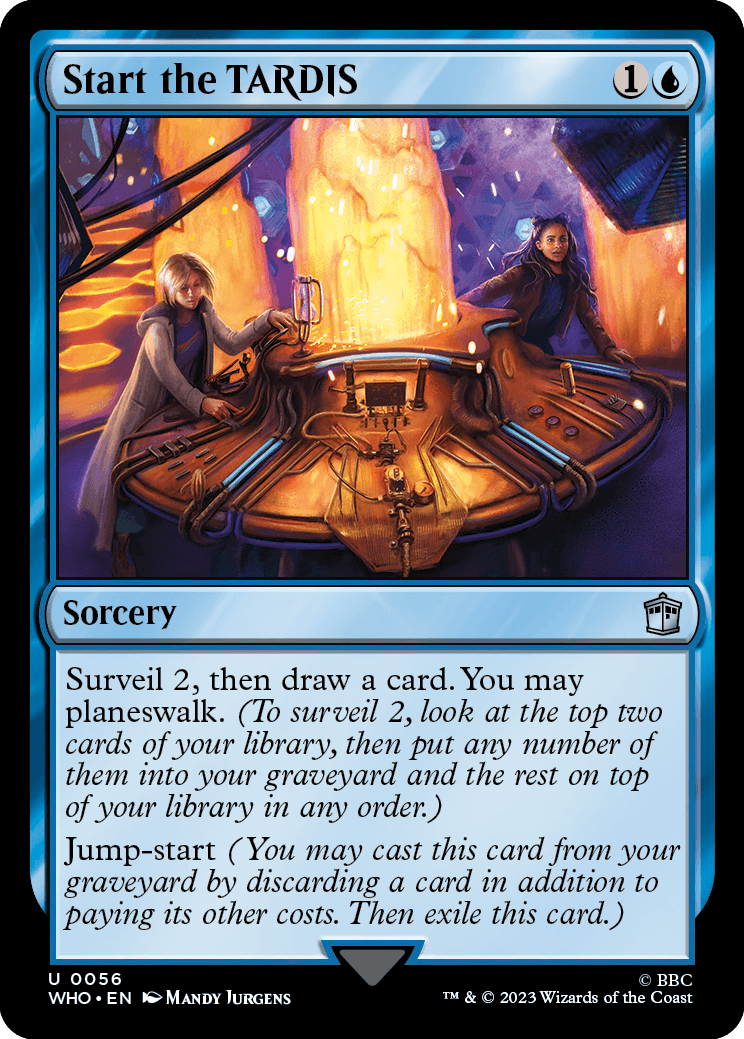
Start the TARDIS
{1}{U}
Sorcery
Surveil 2, then draw a card. You may planeswalk. (To surveil 2, look at the top two cards of your library, then put any number of them into your graveyard and the rest on top of your library in any order.)
Jump-start (You may cast this card from your graveyard by discarding a card in addition to paying its other costs. Then exile this card.)
- When casting a spell with jump-start, you must still follow any timing restrictions and permissions, including those based on the card's type. For instance, you can cast a sorcery using jump-start only when you could normally cast a sorcery.
- A spell cast using jump-start will always be exiled afterward, whether it resolves, it's countered, or it leaves the stack in some other way.
- If an effect allows you to pay an alternative cost rather than a spell's mana cost, you may pay that alternative cost when you jump-start a spell. You'll still discard a card as an additional cost to cast it.
- If a card with jump-start is put into your graveyard during your turn, you'll be able to cast it right away if it's legal to do so, before an opponent can take any actions.
- You may planeswalk only in games using the Planechase variant. If you are instructed to planeswalk in any other game, nothing happens.
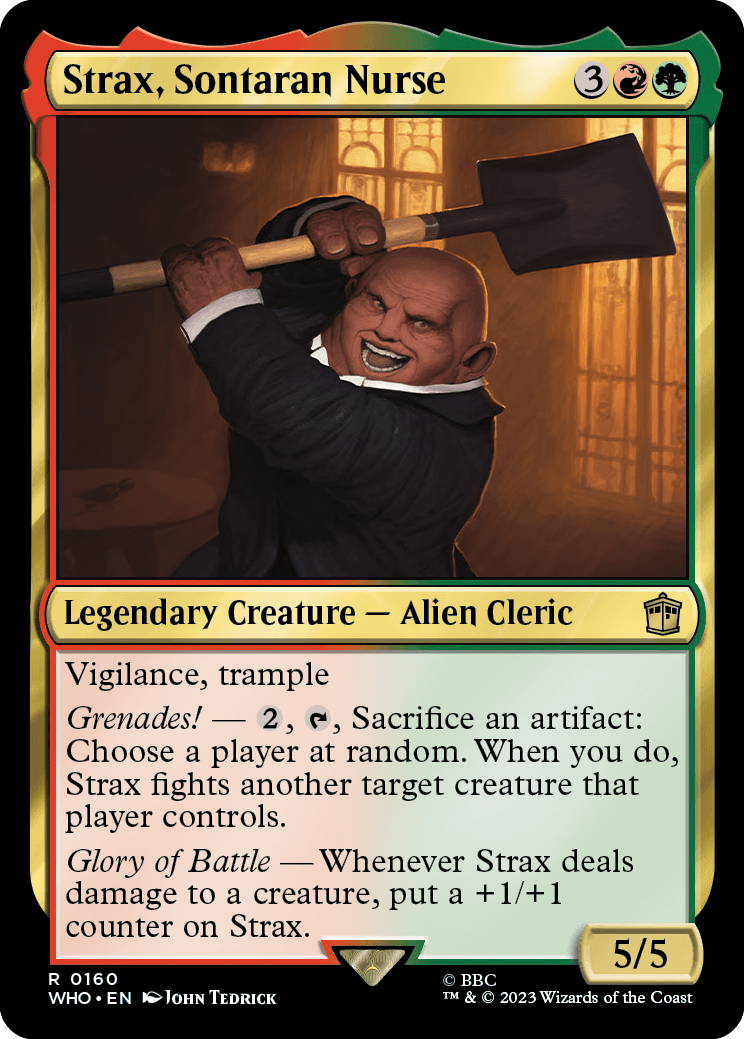
Strax, Sontaran Nurse
{3}{R}{G}
Legendary Creature — Alien Cleric
5/5
Vigilance, trample
Grenades! — {2}, {T}, Sacrifice an artifact: Choose a player at random. When you do, Strax fights another target creature that player controls.
Glory of Battle — Whenever Strax deals damage to a creature, put a +1/+1 counter on Strax.
- The player is chosen at random, but Strax's controller gets to choose which of their creatures it fights.
- If Strax is dealt damage equal to its toughness while fighting, it will die before the +1/+1 counter from its last ability can save it.

Surge of Brilliance
{1}{U}
Instant
Paradox — Draw a card for each spell you've cast this turn from anywhere other than your hand.
Foretell {1}{U} (During your turn, you may pay {2} and exile this card from your hand face down. Cast it on a later turn for its foretell cost.)
- If you cast Surge of Brilliance from exile, it counts itself when counting the number of spells cast from anywhere other than your hand.
- Because exiling a card with foretell from your hand is a special action, you can do so any time you have priority during your turn, including in response to spells and abilities. Once you announce you're taking the action, no other player can respond by trying to remove the card from your hand.
- Casting a foretold card from exile follows the timing rules for that card. If you foretell an instant card, you can cast it as soon as the next player's turn.
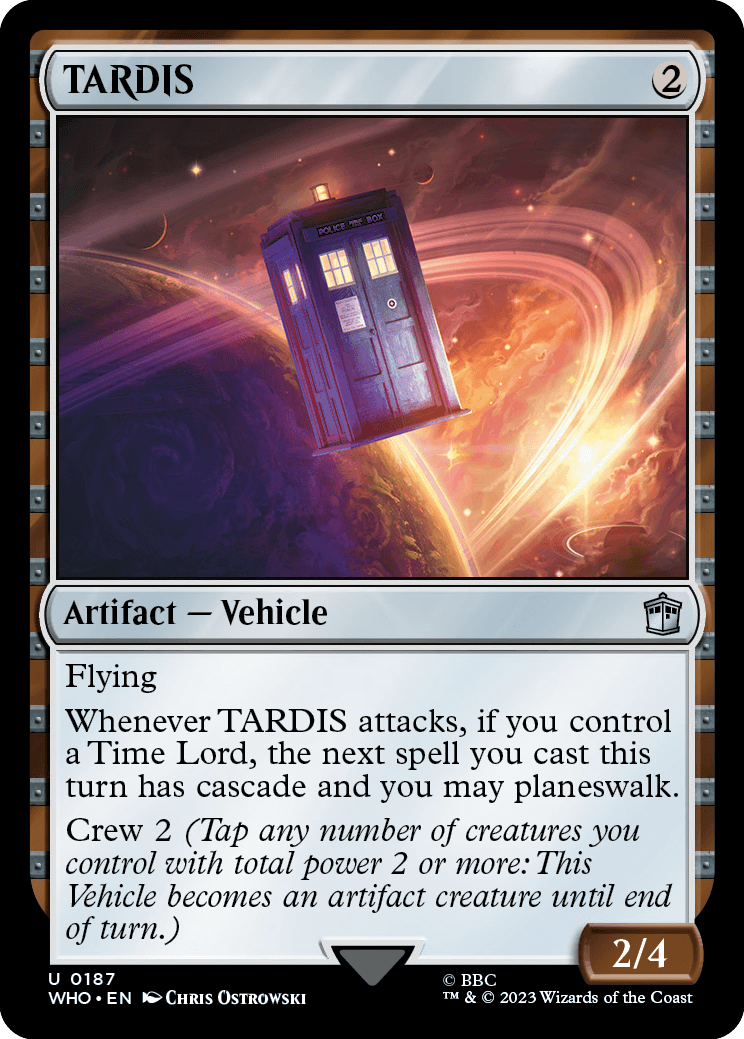
TARDIS
{2}
Artifact — Vehicle
2/4
Flying
Whenever TARDIS attacks, if you control a Time Lord, the next spell you cast this turn has cascade and you may planeswalk.
Crew 2 (Tap any number of creatures you control with total power 2 or more: This Vehicle becomes an artifact creature until end of turn.)
- You may planeswalk at the time TARDIS's triggered ability resolves, not at the time you cast the next spell.
- You may planeswalk only in games using the Planechase variant. If you are instructed to planeswalk in any other game, nothing happens.
- A spell's mana value is determined only by its mana cost. Ignore any alternative costs, additional costs, cost increases, or cost reductions.
- Cascade triggers when you cast the spell, meaning that it resolves before that spell. If you end up casting the exiled card, it will go on the stack above the spell with cascade.
- When the cascade ability resolves, you must exile cards. The only optional part of the ability is whether or not you cast the last card exiled.
- If a spell with cascade is countered, the cascade ability will still resolve normally.
- You exile the cards face up. All players will be able to see them.
- If you cast a card "without paying its mana cost," you can't choose to cast it for any alternative costs. You can, however, pay additional costs. If the card has any mandatory additional costs, you must pay those to cast the card.
- If the card has {X} in its mana cost, you must choose 0 as the value of X when casting it without paying its mana cost.
- Due to a 2021 rules change to cascade, not only do you stop exiling cards if you exile a nonland card with lesser mana value than the spell with cascade, but the resulting spell you cast must also have lesser mana value. Previously, in cases where a card's mana value differed from the resulting spell, such as with some modal double-faced cards or cards with an Adventure, you could cast a spell with a higher mana value than the exiled card.
- The mana value of a split card is determined by the combined mana cost of its two halves. If cascade allows you to cast a split card, you may cast either half but not both halves (unless the card has fuse).

The Tenth Doctor
{3}{U}{R}
Legendary Creature — Time Lord Doctor
3/5
Allons-y! — Whenever you attack, exile cards from the top of your library until you exile a nonland card. Put three time counters on it. If it doesn't have suspend, it gains suspend.
Timey-Wimey — {7}: Time travel three times. Activate only as a sorcery. (For each suspended card you own and each permanent you control with a time counter on it, you may add or remove a time counter. Then do it two more times.)
- Any land cards exiled with The Tenth Doctor's first ability will remain in exile.
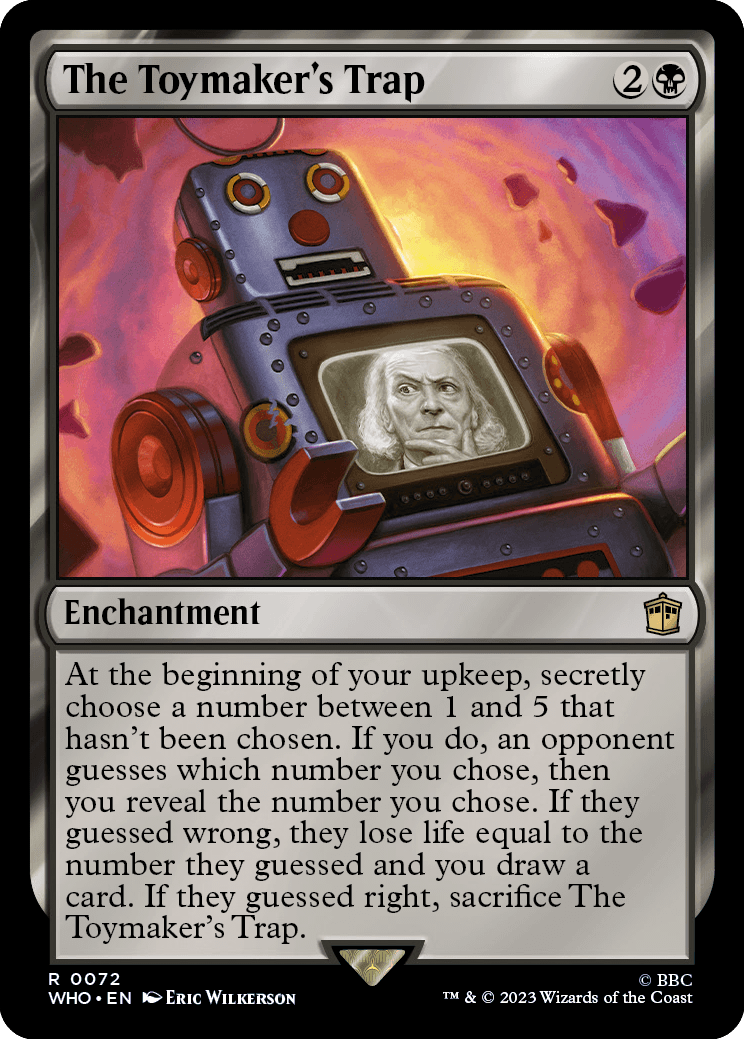
The Toymaker's Trap
{2}{B}
Enchantment
At the beginning of your upkeep, secretly choose a number between 1 and 5 that hasn't been chosen. If you do, an opponent guesses which number you chose, then you reveal the number you chose. If they guessed wrong, they lose life equal to the number they guessed and you draw a card. If they guessed right, sacrifice The Toymaker's Trap.
- To secretly choose a number, write a number from 1 to 5 down without showing it to anyone else.
- If The Toymaker's Trap leaves the battlefield and later returns to the battlefield, it has no memory of which numbers were chosen for its effect before. The same is true if you control a second copy of it.

The Thirteenth Doctor
{1}{G}{U}
Legendary Creature — Time Lord Doctor
2/2
Paradox — Whenever you cast a spell from anywhere other than your hand, put a +1/+1 counter on target creature.
Team TARDIS — At the beginning of your end step, untap each creature you control with a counter on it.
- The Thirteenth Doctor's last ability untaps creatures you control with any kind of counter on them, not just creatures you control with +1/+1 counters on them.
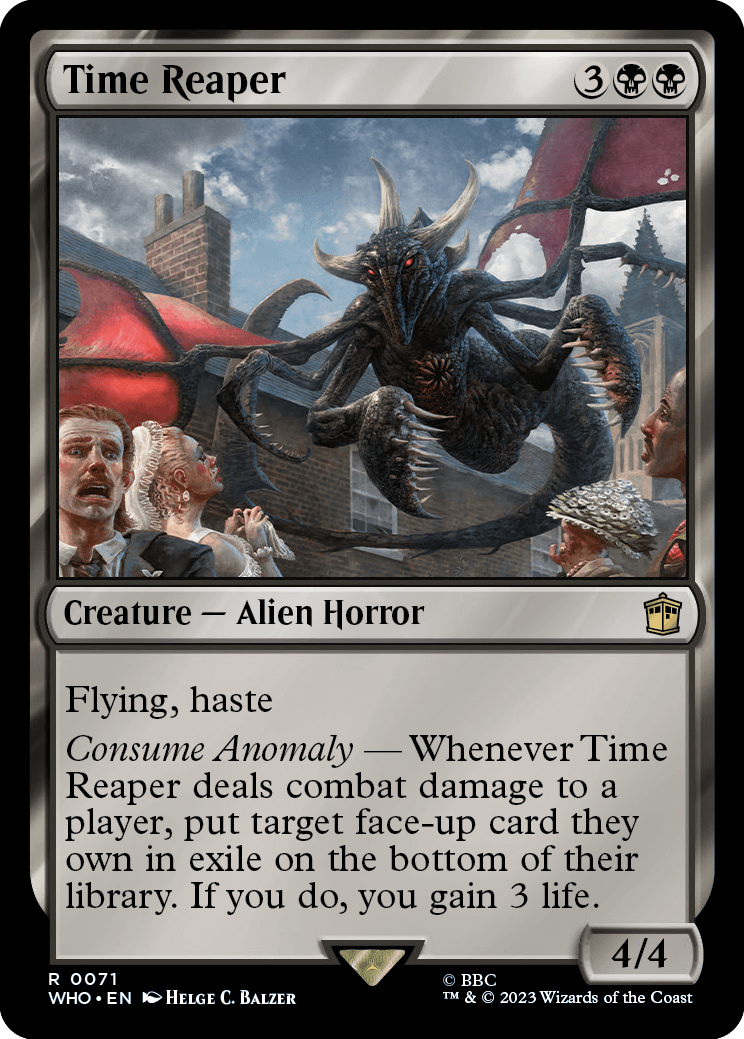
Time Reaper
{3}{B}{B}
Creature — Alien Horror
4/4
Flying, haste
Consume Anomaly — Whenever Time Reaper deals combat damage to a player, put target face-up card they own in exile on the bottom of their library. If you do, you gain 3 life.
- Most cards in exile are face up and can be targeted by Time Reaper's triggered ability. A card is face down in the exile zone only if the effect or action that put it there specifically says it puts it there face down (like the foretell ability).
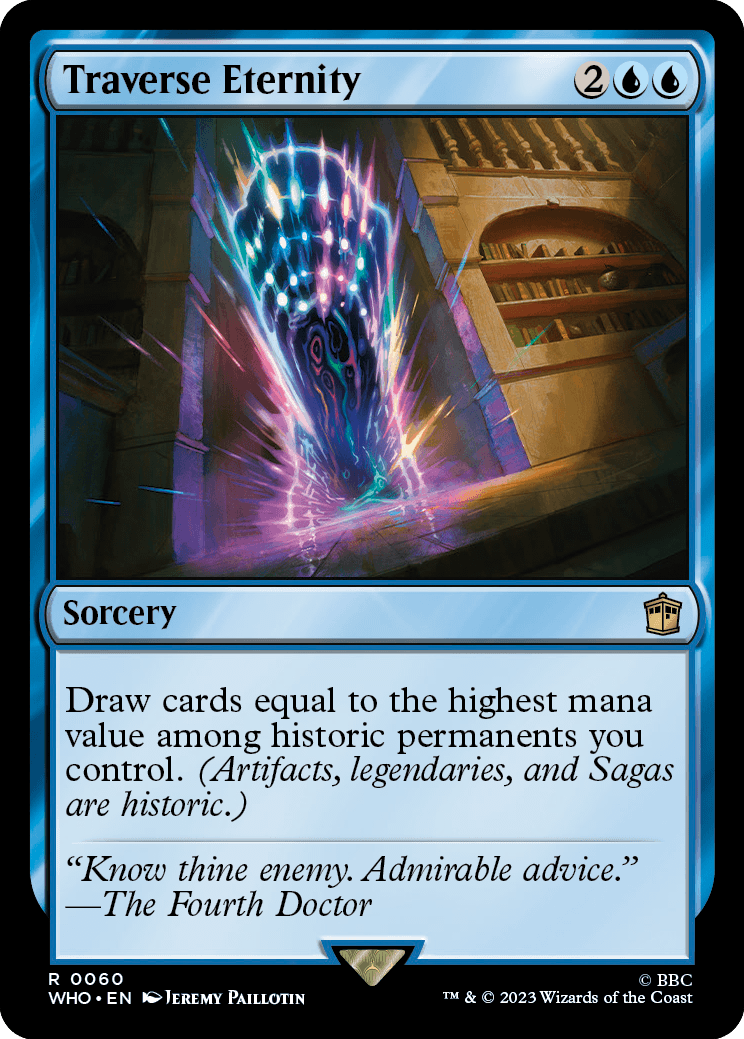
Traverse Eternity
{2}{U}{U}
Sorcery
Draw cards equal to the highest mana value among historic permanents you control. (Artifacts, legendaries, and Sagas are historic.)
- If a historic permanent has an {X} in its mana cost, the value of {X} is 0 when determining the mana value of that permanent.
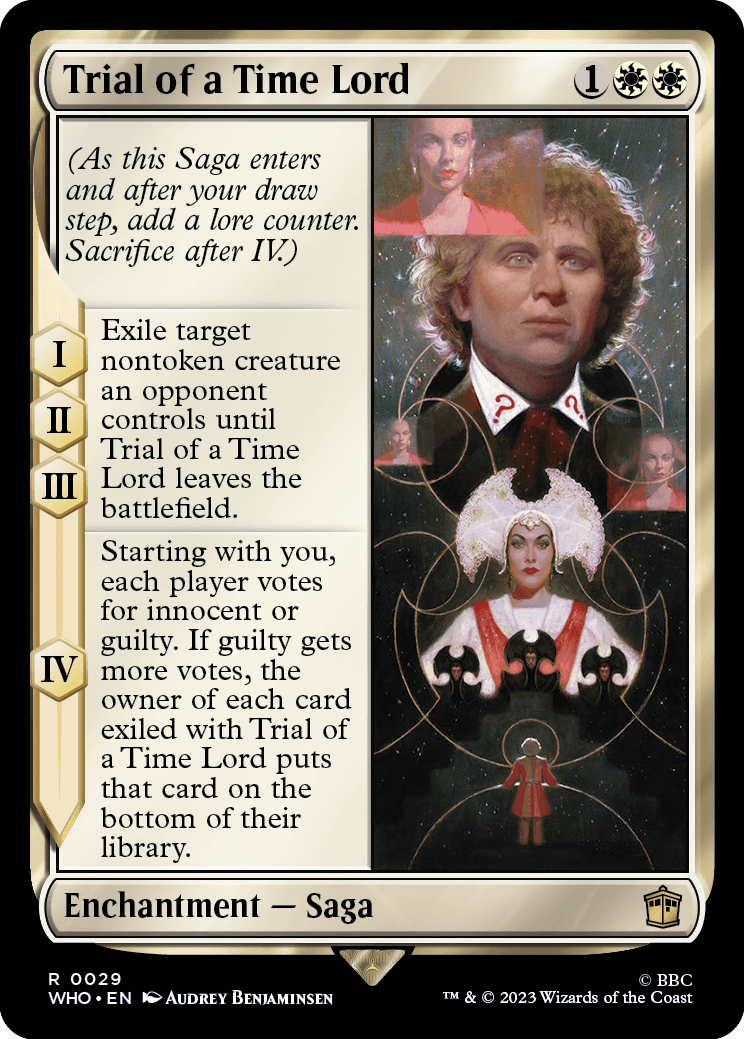
Trial of a Time Lord
{1}{W}{W}
Enchantment — Saga
(As this Saga enters and after your draw step, add a lore counter. Sacrifice after IV.)
I, II, III — Exile target nontoken creature an opponent controls until Trial of a Time Lord leaves the battlefield.
IV — Starting with you, each player votes for innocent or guilty. If guilty gets more votes, the owner of each card exiled with Trial of a Time Lord puts that card on the bottom of their library.
- The cards that didn't get put on the bottom of their owners' libraries will return to the battlefield as Trial of a Time Lord leaves the battlefield.
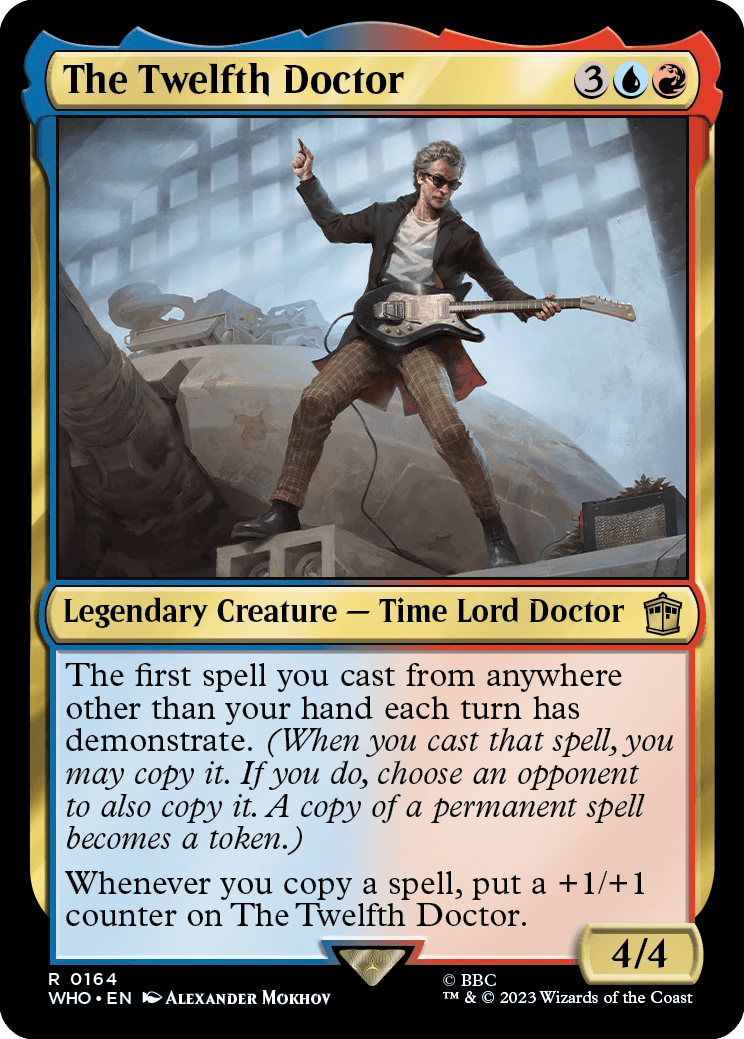
The Twelfth Doctor
{3}{U}{R}
Legendary Creature — Time Lord Doctor
4/4
The first spell you cast from anywhere other than your hand each turn has demonstrate. (When you cast that spell, you may copy it. If you do, choose an opponent to also copy it. A copy of a permanent spell becomes a token.)
Whenever you copy a spell, put a +1/+1 counter on The Twelfth Doctor.
- You choose whether to make a copy as the demonstrate ability resolves. This happens before the original spell resolves. Your copy goes on the stack above the original spell.
- If you copy a spell with demonstrate, you then immediately choose an opponent. If they copy the spell, it goes on top of the stack.
- If the spell requires targets, you choose the target of the original spell as you cast it. If you create a copy of the spell, you may choose new targets for the copy as you create that copy. Similarly, the opponent you chose to create a copy may choose new targets for that copy as it's created. In other words, your opponent will know the targets of your original spell and your copy when choosing the new targets, if any, for their copy.
- This means that if you cast a spell with demonstrate and both you and an opponent copy it, the opponent's copy will resolve first, then your copy will resolve, and finally the original spell will resolve.
- If you cast the spell and choose not to copy it, no opponent will get to copy it either.
- If the spell with demonstrate had any modes chosen for it as it was cast, the copies will have the same modes chosen for it.
- If the spell had an X value chosen for it as it was cast, the copies will have the same value of X.
- If any additional or alternative costs were paid to cast the spell with demonstrate, the copies will see those choices as well. For example, if the spell has a kicker ability and was kicked, the copies will also be kicked.
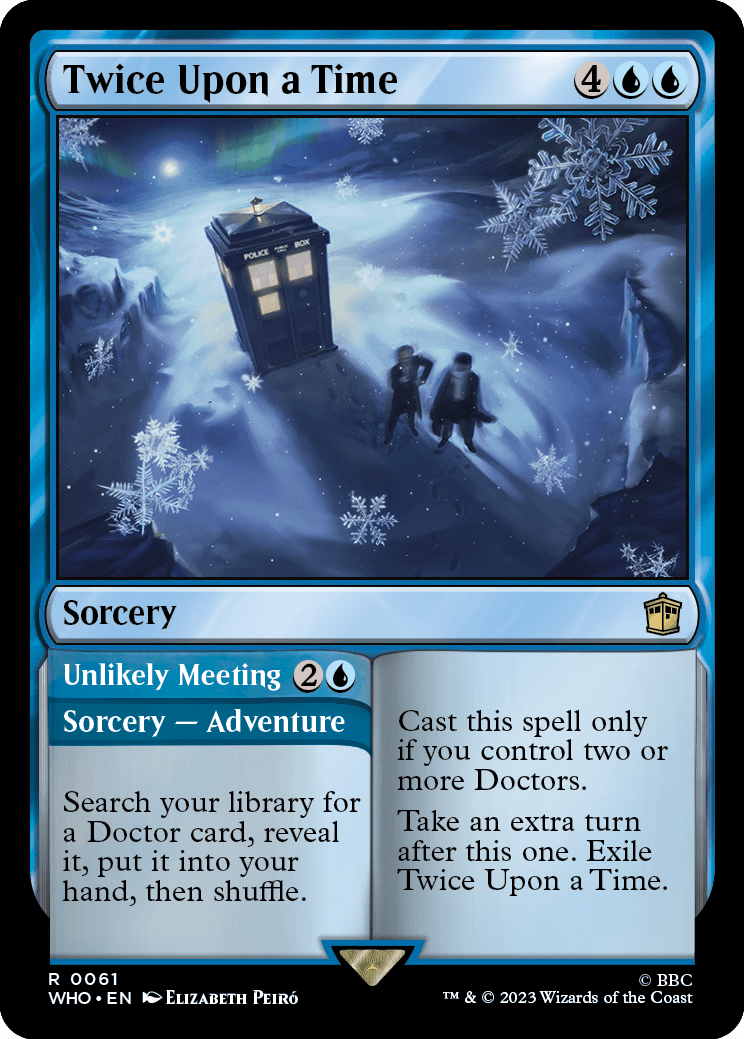
Twice Upon a Time
{4}{U}{U}
Sorcery
Cast this spell only if you control two or more Doctors.
Take an extra turn after this one. Exile Twice Upon a Time.
//ADV//
Unlikely Meeting
{2}{U}
Sorcery — Adventure
Search your library for a Doctor card, reveal it, put it into your hand, then shuffle.
- In every zone other than the stack, Twice Upon a Time uses only its non-Adventure characteristics, and you ignore its alternative characteristics in those cases. For example, while it's in your graveyard, its mana value is 6.
- When casting a spell as an Adventure, use the alternative characteristics and ignore all of the card's normal characteristics. The spell's color, mana cost, mana value, and so on are determined by only those alternative characteristics. If the spell leaves the stack, it immediately resumes using its normal characteristics.
- If you cast an adventurer card as an Adventure, use only its alternative characteristics to determine whether it's legal to cast that spell.
- If a spell is cast as an Adventure, its controller exiles it instead of putting it into its owner's graveyard as it resolves. For as long as it remains exiled, that player may cast it as a non-Adventure spell. If an Adventure spell leaves the stack in any way other than resolving (most likely by being countered or by failing to resolve because its targets have all become illegal), that card won't be exiled and the spell's controller won't be able to cast it as a permanent later.
- If an adventurer card ends up in exile for any other reason than by exiling itself while resolving, it won't give you permission to cast it as a non-Adventure spell.
- You must still follow any relevant timing rules for the non-Adventure spell you cast from exile. Normally, you'll be able to cast it only during your main phase while the stack is empty.
- If an effect copies an Adventure spell, that copy is exiled as it resolves. It ceases to exist as a state-based action; it's not possible to cast the copy from exile.
- An effect may refer to a card, spell, or permanent that "has an Adventure." This refers to a card, spell, or permanent that has an adventurer card's set of alternative characteristics, even if they're not being used and even if that card was never cast as an Adventure.
- If an effect instructs you to choose a card name, you may choose the alternative Adventure name. Consider only the alternative characteristics to determine whether that is an appropriate name to choose.
- Casting a card as an Adventure isn't casting it for an alternative cost. Effects that allow you to cast a spell for an alternative cost or without paying its mana cost may allow you to apply those to the Adventure.
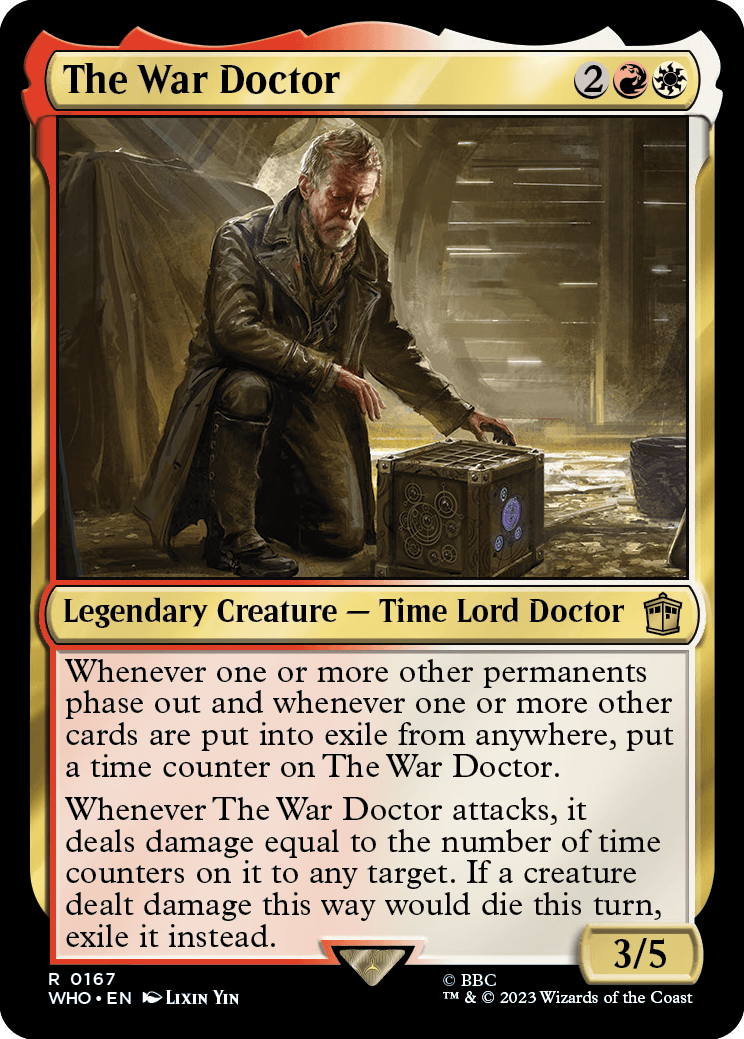
The War Doctor
{2}{R}{W}
Legendary Creature — Time Lord Doctor
3/5
Whenever one or more other permanents phase out and whenever one or more other cards are put into exile from anywhere, put a time counter on The War Doctor.
Whenever The War Doctor attacks, it deals damage equal to the number of time counters on it to any target. If a creature dealt damage this way would die this turn, exile it instead.
- You choose the target of the second ability as it attacks. The number of time counters is checked at the time the ability resolves. If The War Doctor has left the battlefield by that time, use the number of time counters it had on it the last time it was on the battlefield to determine how much damage it deals to that target.
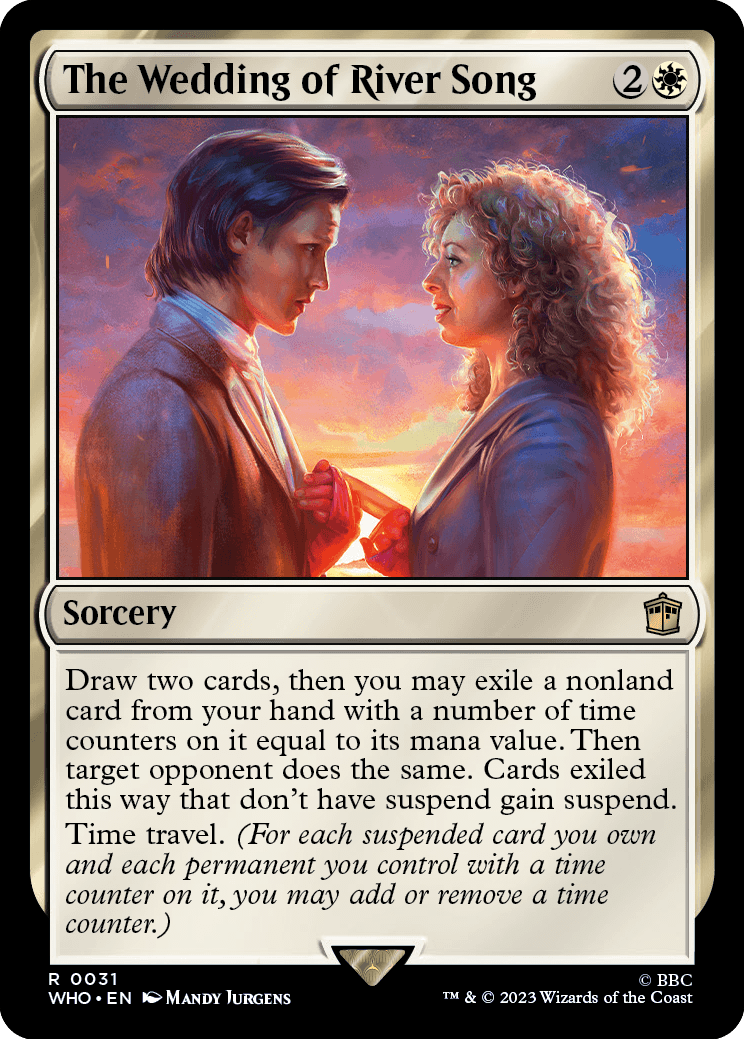
The Wedding of River Song
{2}{W}
Sorcery
Draw two cards, then you may exile a nonland card from your hand with a number of time counters on it equal to its mana value. Then target opponent does the same. Cards exiled this way that don't have suspend gain suspend.
Time travel. (For each suspended card you own and each permanent you control with a time counter on it, you may add or remove a time counter.)
- If you exile a card with a mana value of 0, it will gain suspend, but no time counters will be placed on it. It can't be cast unless a time counter is later placed on it (and then, subsequently removed), and it isn't considered to be a "suspended card."
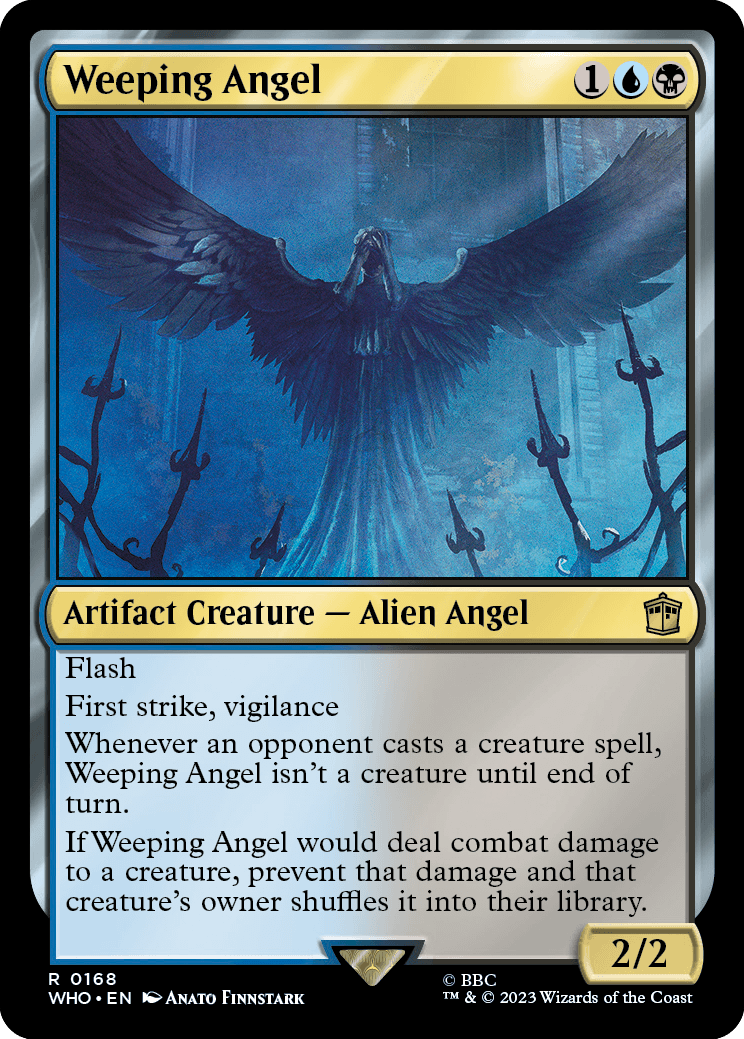
Weeping Angel
{1}{U}{B}
Artifact Creature — Alien Angel
2/2
Flash
First strike, vigilance
Whenever an opponent casts a creature spell, Weeping Angel isn't a creature until end of turn.
If Weeping Angel would deal combat damage to a creature, prevent that damage and that creature's owner shuffles it into their library.
- As the first triggered ability of Weeping Angel resolves, it continues to be an artifact but will stop being both an Alien and an Angel until it becomes a creature again. It's just a statue, how dangerous could it be?
- Damage that is prevented never occurs, so any triggered abilities that trigger due to combat damage that would have been dealt by Weeping Angel won't trigger.
- If an opponent casts a creature spell with flash while Weeping Angel is attacking or blocking, it is removed from combat because it stops being a creature. However, any creatures that it was blocking are still considered blocked.
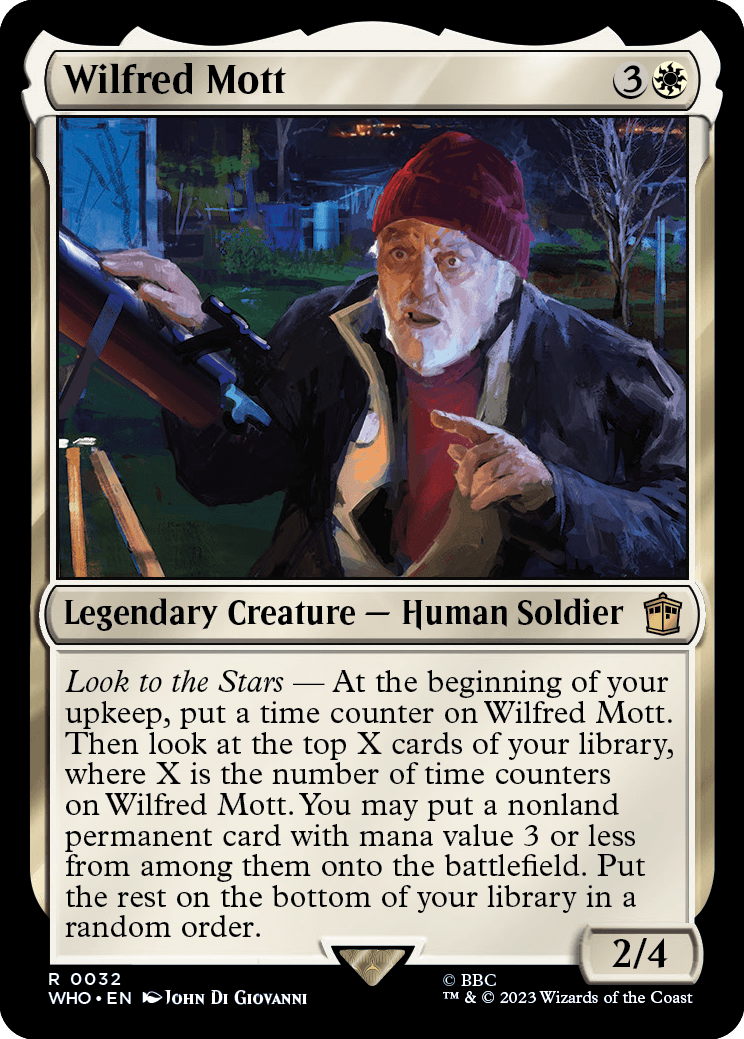
Wilfred Mott
{3}{W}
Legendary Creature — Human Soldier
2/4
Look to the Stars — At the beginning of your upkeep, put a time counter on Wilfred Mott. Then look at the top X cards of your library, where X is the number of time counters on Wilfred Mott. You may put a nonland permanent card with mana value 3 or less from among them onto the battlefield. Put the rest on the bottom of your library in a random order.
- If Wilfred Mott leaves the battlefield after its ability has triggered but before it resolves, use the number of time counters it had on it the last time it was on the battlefield to determine the value of X.
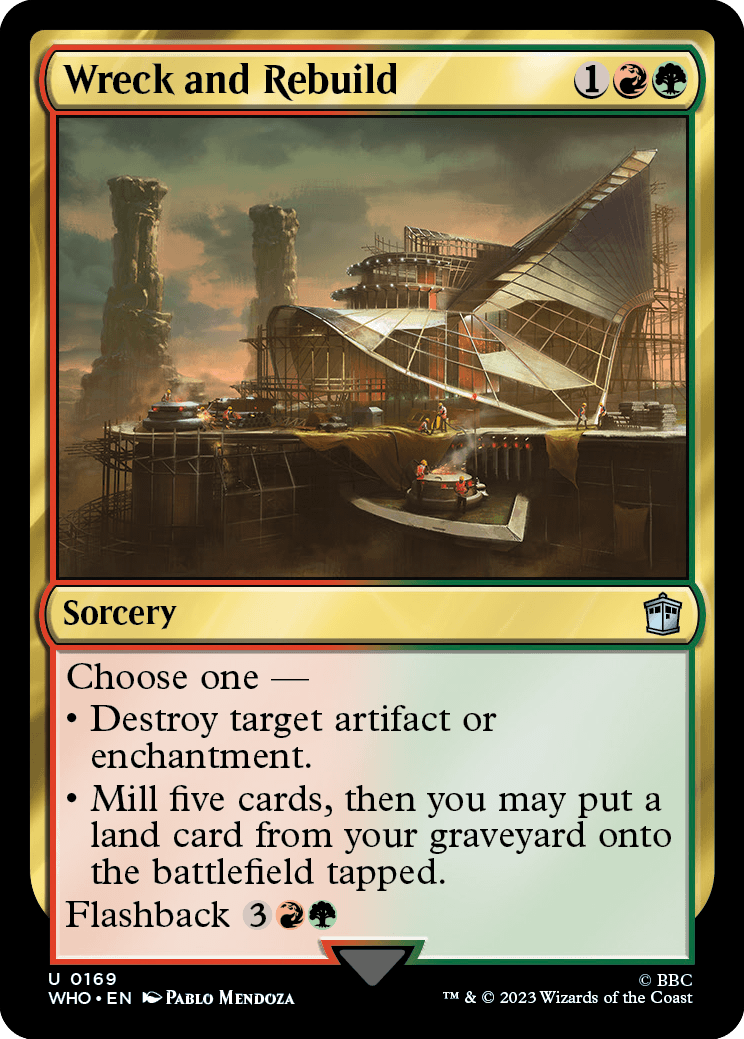
Wreck and Rebuild
{1}{R}{G}
Sorcery
Choose one —
• Destroy target artifact or enchantment.
• Mill five cards, then you may put a land card from your graveyard onto the battlefield tapped.
Flashback {3}{R}{G}
- "Flashback [cost]" means "You may cast this card from your graveyard by paying [cost] rather than paying its mana cost" and "If the flashback cost was paid, exile this card instead of putting it anywhere else any time it would leave the stack."
- You must still follow any timing restrictions and permissions, including those based on the card's type. For instance, you can cast a sorcery using flashback only when you could normally cast a sorcery.
- To determine the total cost of a spell, start with the mana cost or alternative cost (such as a flashback cost) you're paying, add any cost increases, then apply any cost reductions. The mana value of the spell is determined only by its mana cost, no matter what the total cost to cast the spell was.
- A spell cast using flashback will always be exiled afterward, whether it resolves, is countered, or leaves the stack in some other way.
- You can cast a spell using flashback even if it was somehow put into your graveyard without having been cast.
- If a card with flashback is put into your graveyard during your turn, you can cast it if it's legal to do so before any other player can take any actions.
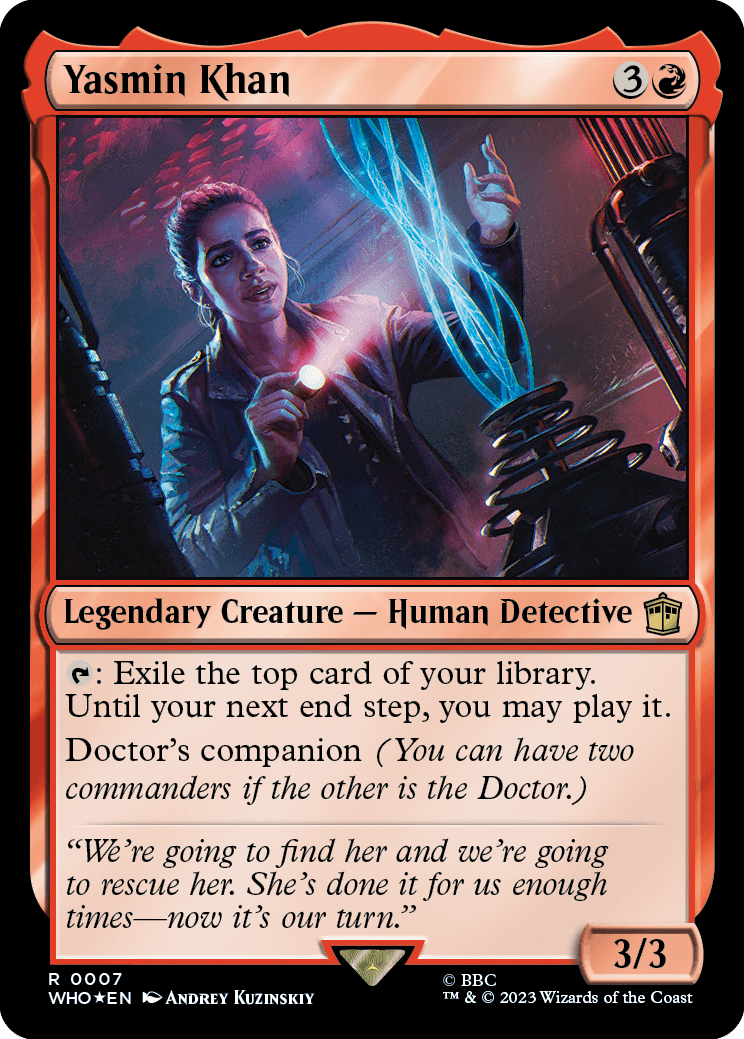
Yasmin Khan
{3}{R}
Legendary Creature — Human Detective
3/3
{T}: Exile the top card of your library. Until your next end step, you may play it.
Doctor's companion (You can have two commanders if the other is the Doctor.)
- You must pay all costs and follow all normal timing rules when playing a card using Yasmin Khan's first ability. For example, you may play a land only during your main phase while the stack is empty.
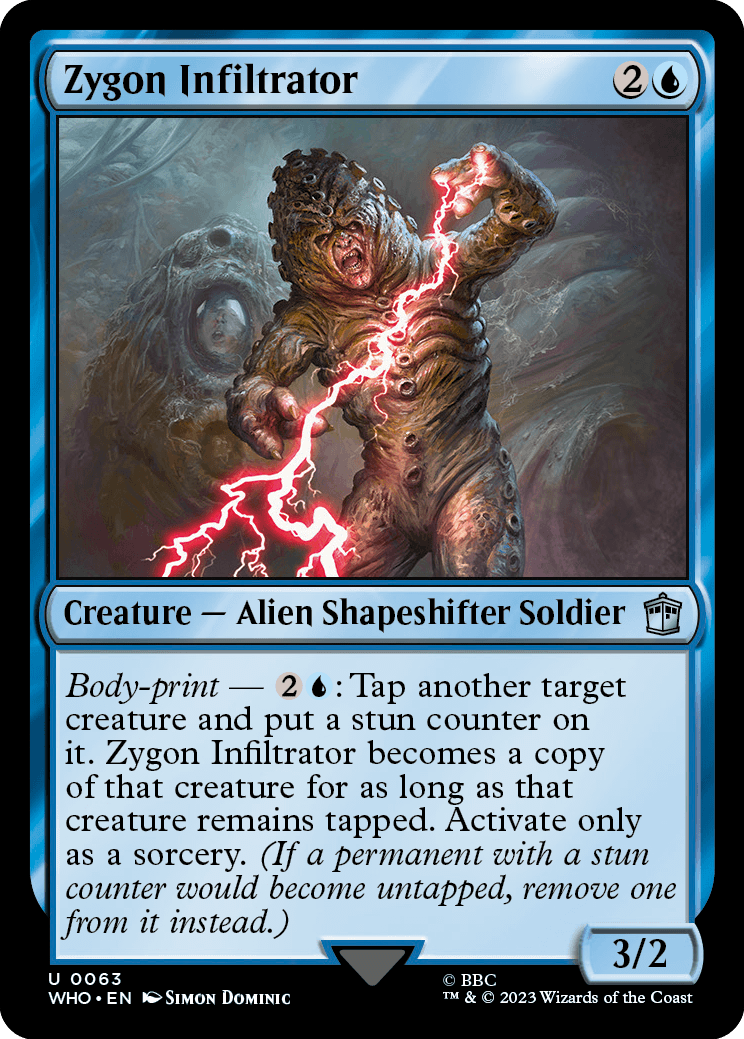
Zygon Infiltrator
{2}{U}
Creature — Alien Shapeshifter Soldier
3/2
Body-print — {2}{U}: Tap another target creature and put a stun counter on it. Zygon Infiltrator becomes a copy of that creature for as long as that creature remains tapped. Activate only as a sorcery. (If a permanent with a stun counter would become untapped, remove one from it instead.)
- Zygon Infiltrator copies the printed values of the creature plus any copy effects that have been applied to it. It won't copy any other effects that have changed that creature's power, toughness, color, and so on. Zygon Infiltrator won't copy any counters on the creature, but it will retain any counters it already had on it.
- If it becomes a copy of a token creature, it copies the original characteristics of that token as defined by the effect that created the token. It won't become a token creature.
- When Zygon Infiltrator becomes a copy of a creature, it's neither entering nor leaving the battlefield. Any enters-the-battlefield or leaves-the-battlefield abilities won't trigger.
- If another creature becomes a copy of Zygon Infiltrator, it will become a copy of whatever Zygon Infiltrator is currently copying (if anything).
PLANECHASE CARD-SPECIFIC NOTES
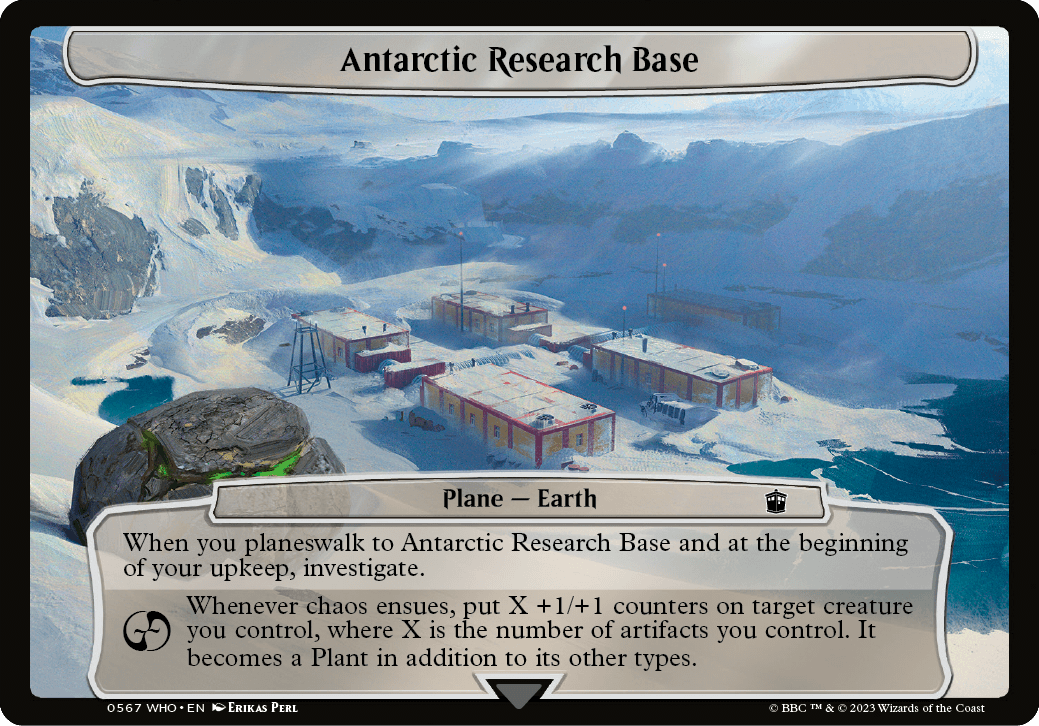
Antarctic Research Base
Plane — Earth
When you planeswalk to Antarctic Research Base and at the beginning of your upkeep, investigate.
Whenever chaos ensues, put X +1/+1 counters on target creature you control, where X is the number of artifacts you control. It becomes a Plant in addition to its other types.
- If you control no artifacts for the chaos ability, you will still choose a target creature you control, and it will still become a Plant in addition to its other types.
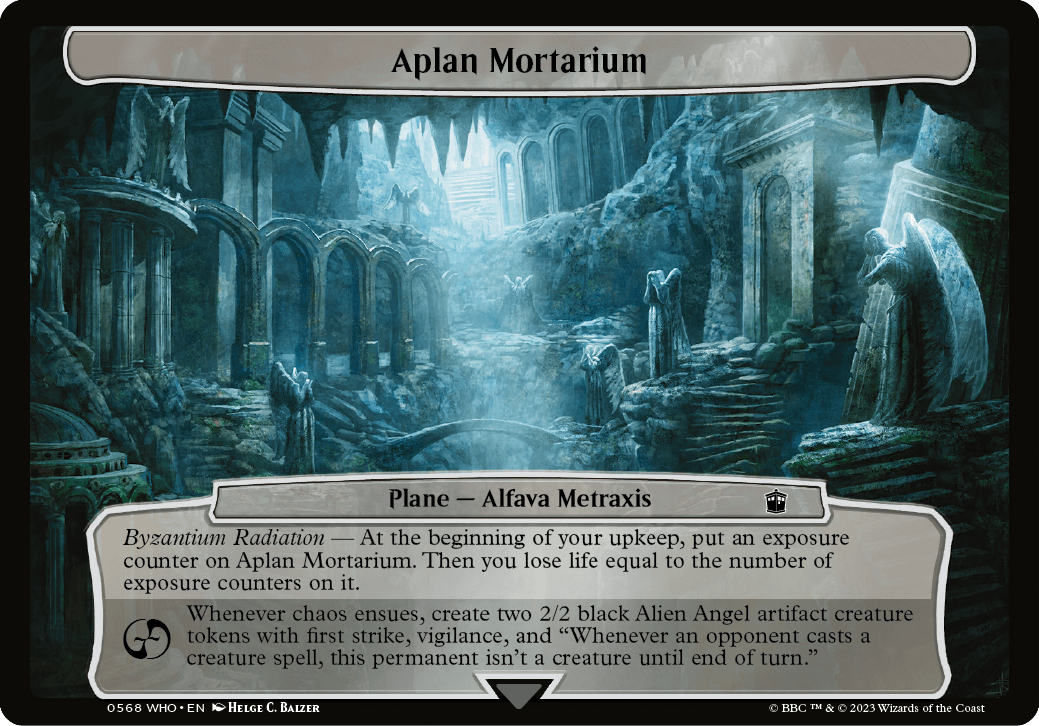
Aplan Mortarium
Plane — Alfava Metraxis
Byzantium Radiation — At the beginning of your upkeep, put an exposure counter on Aplan Mortarium. Then you lose life equal to the number of exposure counters on it.
Whenever chaos ensues, create two 2/2 black Alien Angel artifact creature tokens with first strike, vigilance, and "Whenever an opponent casts a creature spell, this permanent isn't a creature until end of turn."
- As the triggered ability of the Alien Angel token resolves, it continues to be an artifact but will stop being both an Alien and an Angel until it becomes a creature again.
- If an opponent casts a creature spell with flash while the token is attacking or blocking, the token is removed from combat because it stops being a creature. However, any creatures that it was blocking are still considered blocked.
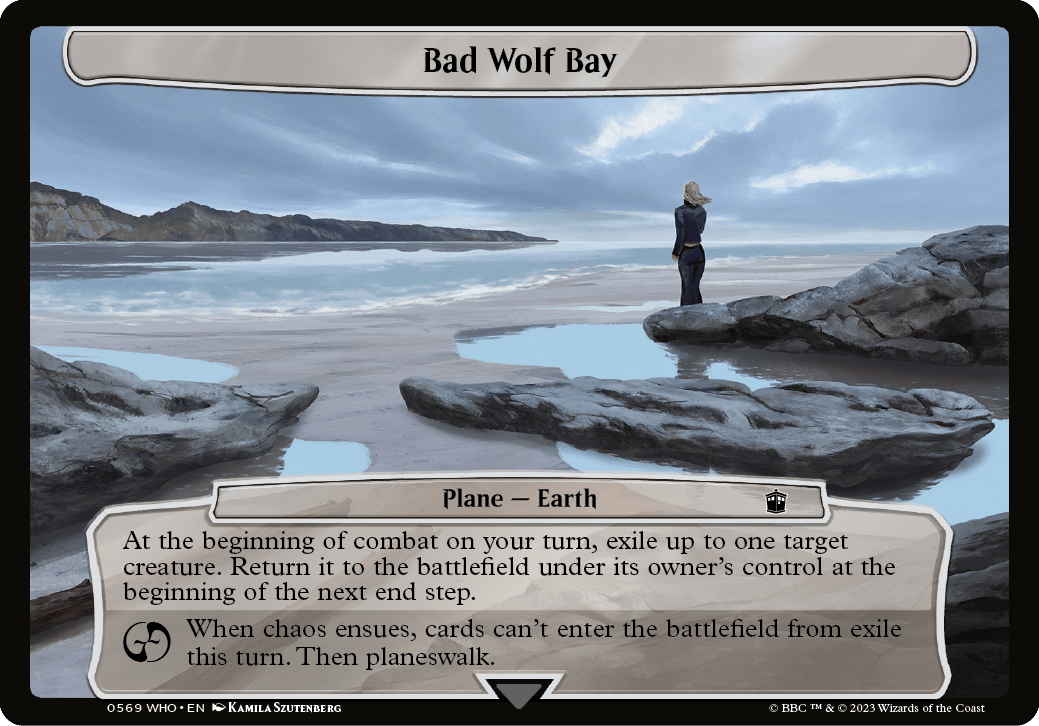
Bad Wolf Bay
Plane — Earth
At the beginning of combat on your turn, exile up to one target creature. Return it to the battlefield under its owner's control at the beginning of the next end step.
When chaos ensues, cards can't enter the battlefield from exile this turn. Then planeswalk.
- You planeswalk immediately as the chaos ability resolves.
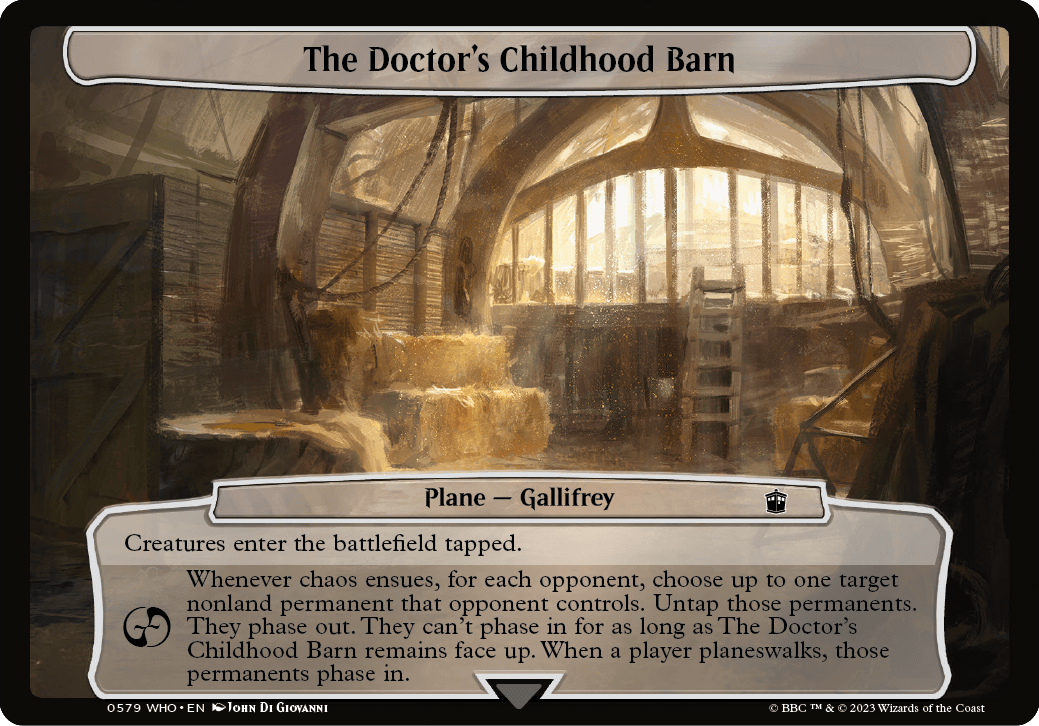
The Doctor's Childhood Barn
Plane — Gallifrey
Creatures enter the battlefield tapped.
Whenever chaos ensues, for each opponent, choose up to one target nonland permanent that opponent controls. Untap those permanents. They phase out. They can't phase in for as long as The Doctor's Childhood Barn remains face up. When a player planeswalks, those permanents phase in.
- While a permanent is phased out, it's treated as though it doesn't exist. It can't be the target of spells or abilities, its static abilities have no effect on the game, its triggered abilities can't trigger, it can't attack or block, and so on.
- Phasing out doesn't cause any "leaves the battlefield" abilities to trigger. Similarly, phasing in won't cause any "enters the battlefield" abilities to trigger.
- Any one-shot effects that are waiting "until [this] leaves the battlefield," won't happen when a permanent phases out.
- Any continuous effects with a "for as long as" duration ignore phased-out objects. Any such effects will expire if their conditions are no longer met after ignoring the phased-out objects.
- Each Aura and Equipment attached to a permanent that's phasing out also phases out. They will phase in with that permanent and still be attached to it. Similarly, permanents that phase out with counters phase in with those counters.
- Choices made for permanents as they entered the battlefield are remembered when they phase in.
- A permanent phased out by The Doctor's Childhood Barn phases in during its controller's untap step as normal only if The Doctor's Childhood Barn is no longer face up. (This situation may occur in rare instances if the delayed triggered ability that would normally cause those permanents to phase in immediately is countered.)
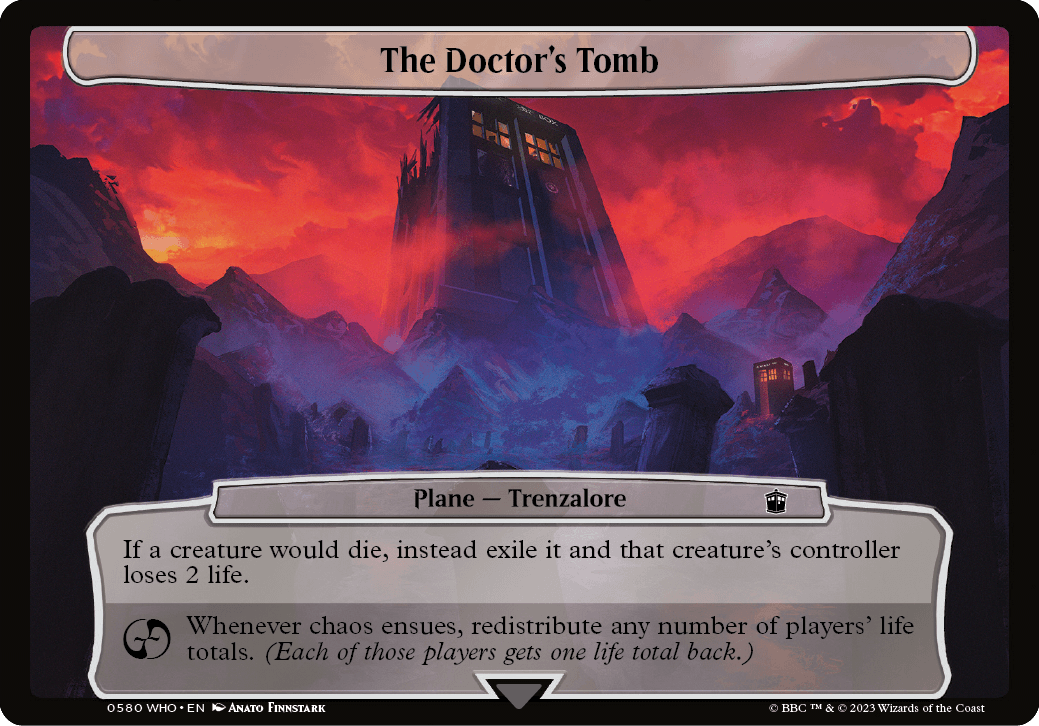
The Doctor's Tomb
Plane — Trenzalore
If a creature would die, instead exile it and that creature's controller loses 2 life.
Whenever chaos ensues, redistribute any number of players' life totals. (Each of those players gets one life total back.)
- You choose which player gets which life total when the chaos ability resolves.
- You can't split up a life total when you redistribute it. For example, suppose that in a two-player game your life total is 5 and your opponent's life total is 15 when the chaos ability starts to resolve. You can choose to (a) leave the life totals as they are or (b) make your life total 15 and your opponent's 5. You can't choose to make your life total 20 and your opponent's 0.
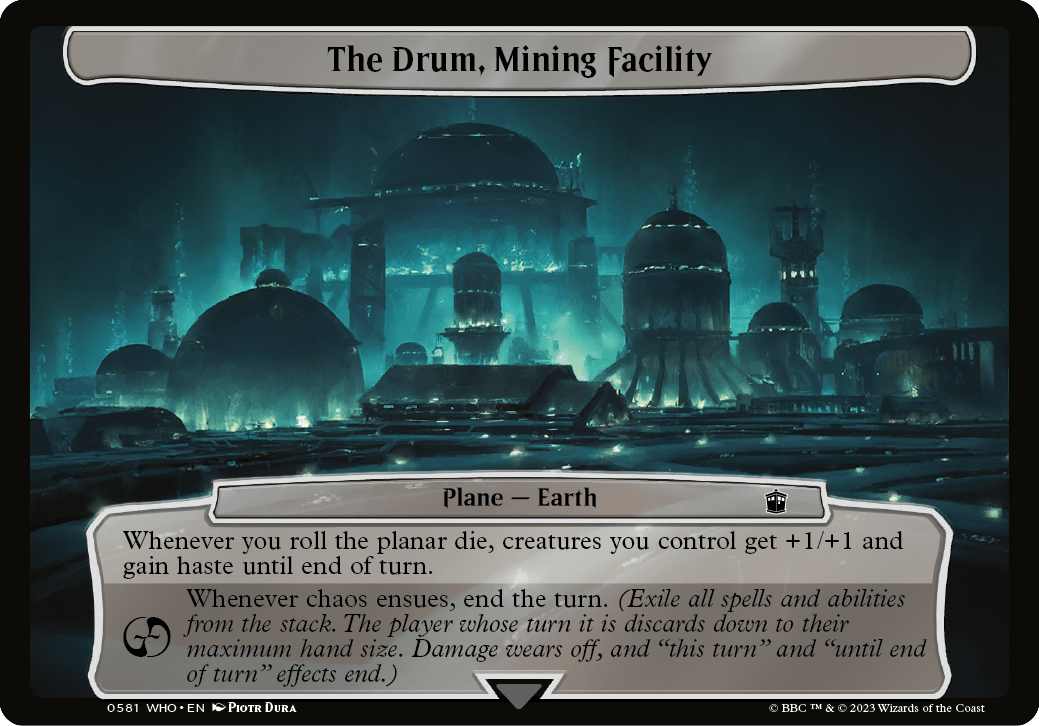
The Drum, Mining Facility
Plane — Earth
Whenever you roll the planar die, creatures you control get +1/+1 and gain haste until end of turn.
Whenever chaos ensues, end the turn. (Exile all spells and abilities from the stack. The player whose turn it is discards down to their maximum hand size. Damage wears off, and "this turn" and "until end of turn" effects end.)
- Ending the turn this way means the following things happen in order: 1) All spells and abilities on the stack are exiled. This includes spells and abilities that can't be countered. 2) If there are any attacking and blocking creatures, they're removed from combat. 3) State-based actions are checked. No player gets priority, and no triggered abilities are put onto the stack. 4) The current phase and/or step ends. The game skips straight to the cleanup step. 5) The cleanup step happens in its entirety.
- If any triggered abilities do trigger during this process, they're put onto the stack during the cleanup step. If this happens, players will have a chance to cast spells and activate abilities, then there will be another cleanup step before the turn is over.
- Though other spells and abilities that are exiled won't get a chance to resolve, they don't count as being countered.
- Any "at the beginning of the next end step" triggered abilities won't get the chance to trigger that turn because the end step is skipped. Those abilities will trigger at the beginning of the end step of the next turn.
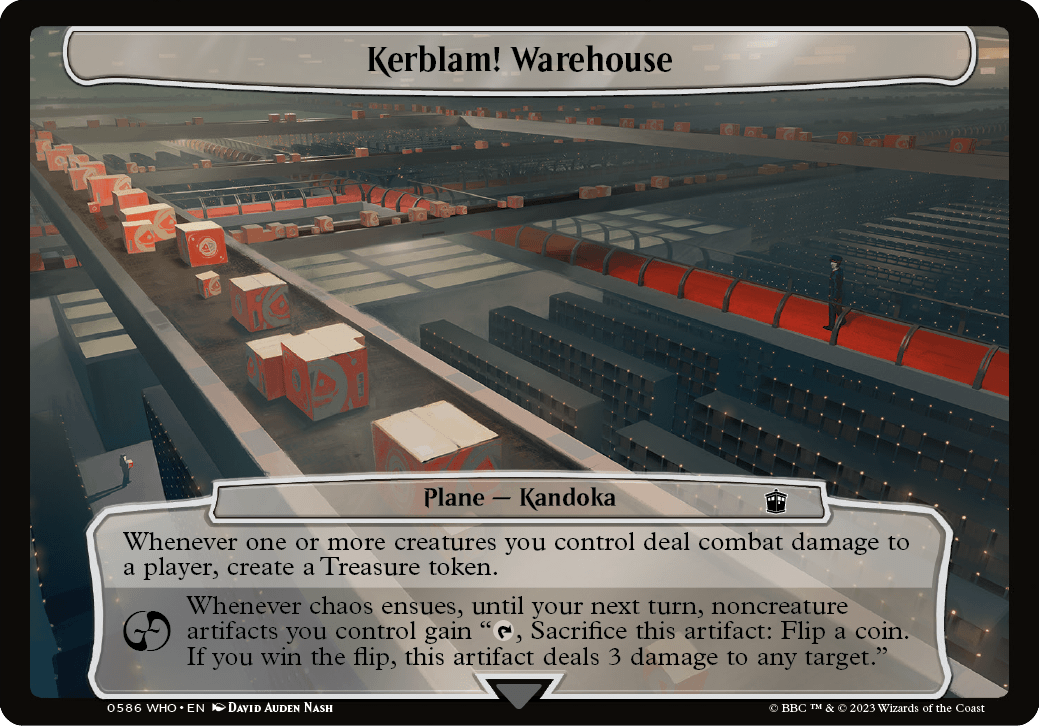
Kerblam! Warehouse
Plane — Kandoka
Whenever one or more creatures you control deal combat damage to a player, create a Treasure token.
Whenever chaos ensues, until your next turn, noncreature artifacts you control gain "{T}, Sacrifice this artifact: Flip a coin. If you win the flip, this artifact deals 3 damage to any target."
- You choose a target for the activated ability before flipping a coin. Opponents will know what or who you are targeting before you flip, and can respond with spells and abilities at that point. They can't respond once the ability has begun to resolve and they see what the result of the coin flip is.
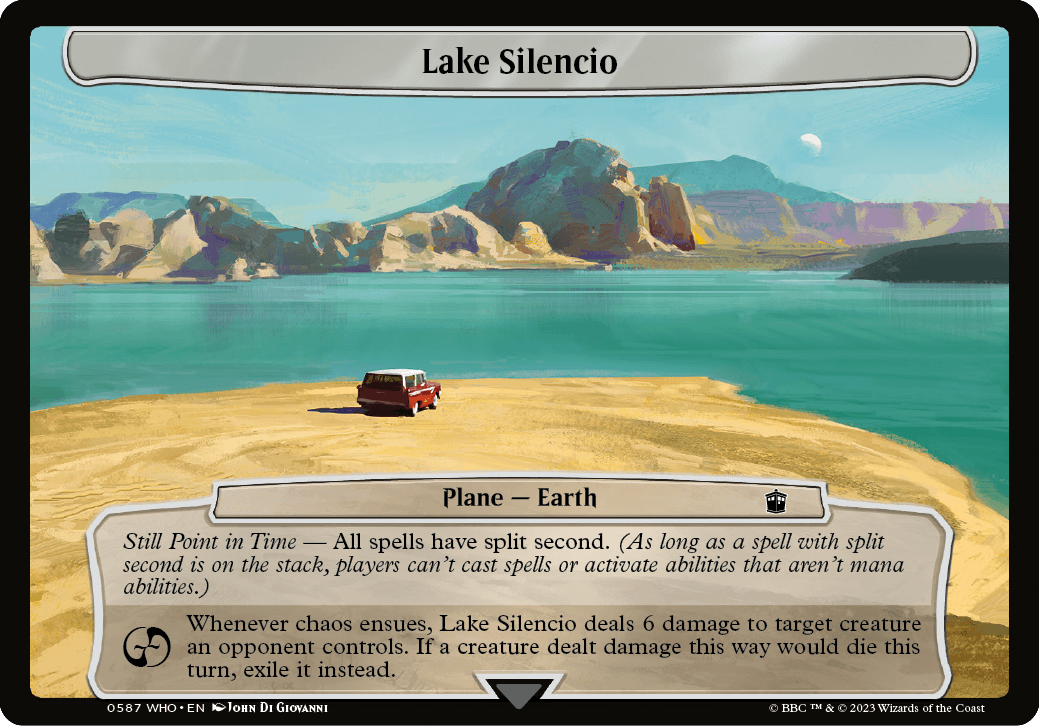
Lake Silencio
Plane — Earth
Still Point in Time — All spells have split second. (As long as a spell with split second is on the stack, players can't cast spells or activate abilities that aren't mana abilities.)
Whenever chaos ensues, Lake Silencio deals 6 damage to target creature an opponent controls. If a creature dealt damage this way would die this turn, exile it instead.
- Players still get priority while a spell with split second is on the stack; their options are just limited to mana abilities and certain special actions.
- Players may turn face-down creatures face up while a spell with split second is on the stack.
- Split second doesn't stop triggered abilities from triggering, such as that of Chalice of the Void. If one does, its controller puts it on the stack and chooses targets for it, if any. Those abilities will resolve as normal.
- Casting a spell with split second won't affect spells and abilities that are already on the stack.
- If the resolution of a triggered ability involves casting a spell, that spell can't be cast if a spell with split second is on the stack.
- After a spell with split second resolves (or otherwise leaves the stack), players may again cast spells and activate abilities before the next object on the stack resolves.
- If a triggered ability causes the planar controller to planeswalk away from Lake Silencio, its ability no longer gives spells split second and players can respond to spells and abilities as normal.
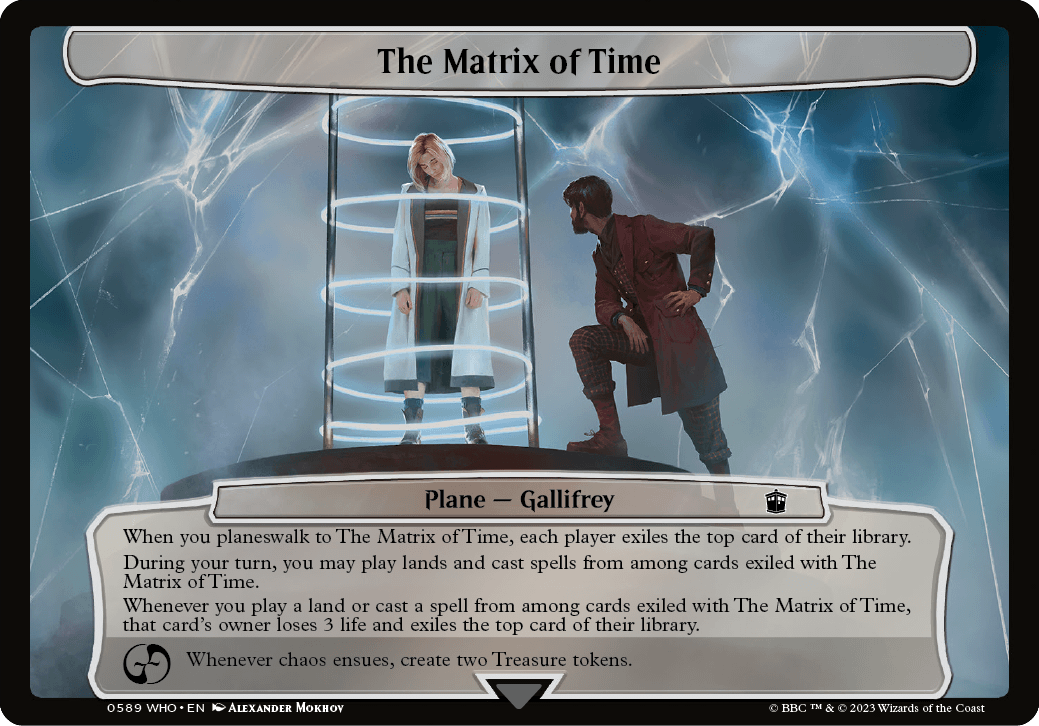
The Matrix of Time
Plane — Gallifrey
When you planeswalk to The Matrix of Time, each player exiles the top card of their library.
During your turn, you may play lands and cast spells from among cards exiled with The Matrix of Time.
Whenever you play a land or cast a spell from among cards exiled with The Matrix of Time, that card's owner loses 3 life and exiles the top card of their library.
Whenever chaos ensues, create two Treasure tokens.
- You must pay all costs and follow all normal timing rules to play cards exiled with The Matrix of Time. For example, you may play a land this way only during your main phase while the stack is empty.
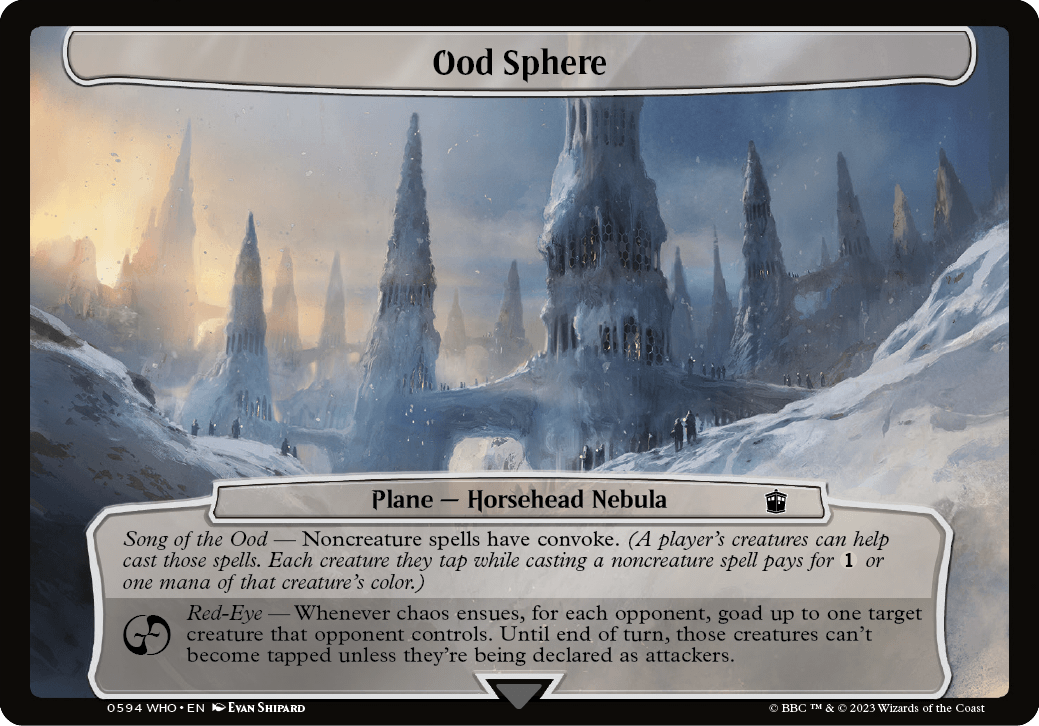
Ood Sphere
Plane — Horsehead Nebula
Song of the Ood — Noncreature spells have convoke. (A player's creatures can help cast those spells. Each creature they tap while casting a noncreature spell pays for {1} or one mana of that creature's color.)
Red-Eye — Whenever chaos ensues, for each opponent, goad up to one target creature that opponent controls. Until end of turn, those creatures can't become tapped unless they're being declared as attackers.
- The creatures goaded by the Red-Eye ability can't be tapped by effects or tapped to pay any costs of abilities.
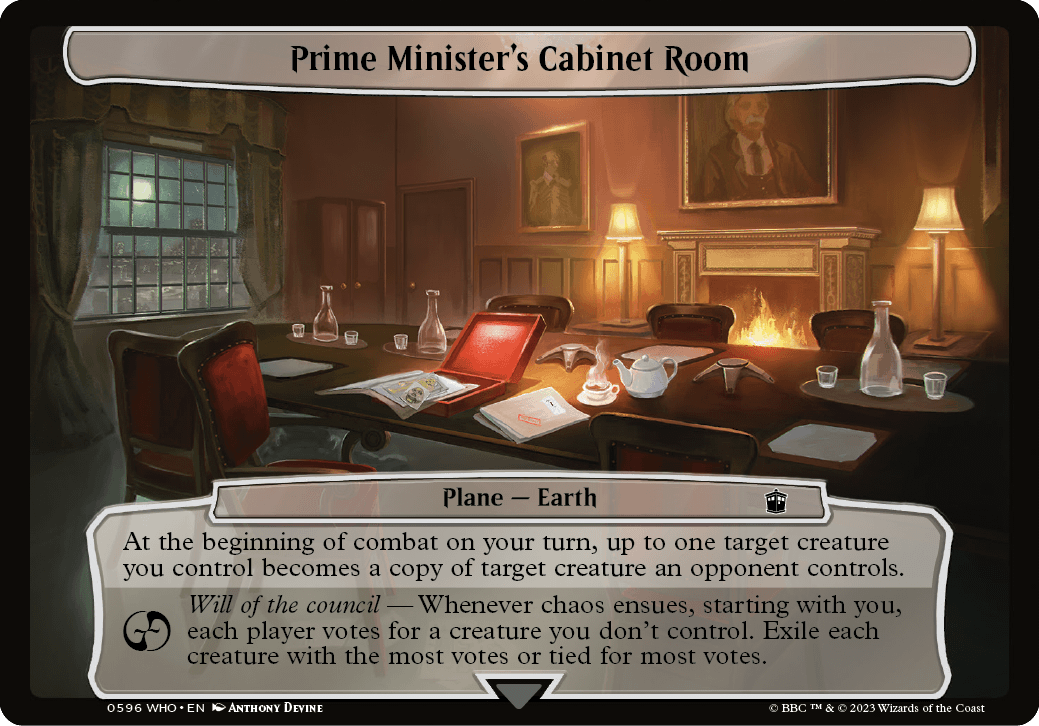
Prime Minister's Cabinet Room
Plane — Earth
At the beginning of combat on your turn, up to one target creature you control becomes a copy of target creature an opponent controls.
Will of the council — Whenever chaos ensues, starting with you, each player votes for a creature you don't control. Exile each creature with the most votes or tied for most votes.
- The target creature you control copies the printed values of the other creature plus any copy effects that have been applied to it. It won't copy any other effects that have changed that creature's power, toughness, color, and so on. It also won't copy any counters on the creature, but it will retain any counters it already had on it.
- If it becomes a copy of a token creature, it copies the original characteristics of that token as defined by the effect that created the token. It won't become a token creature.
- When a creature becomes a copy of another creature, it's neither entering nor leaving the battlefield. Any enters-the-battlefield or leaves-the-battlefield abilities won't trigger.
- If the creature an opponent controls is an illegal target as the ability resolves, nothing happens and the creature you control remains as it was.
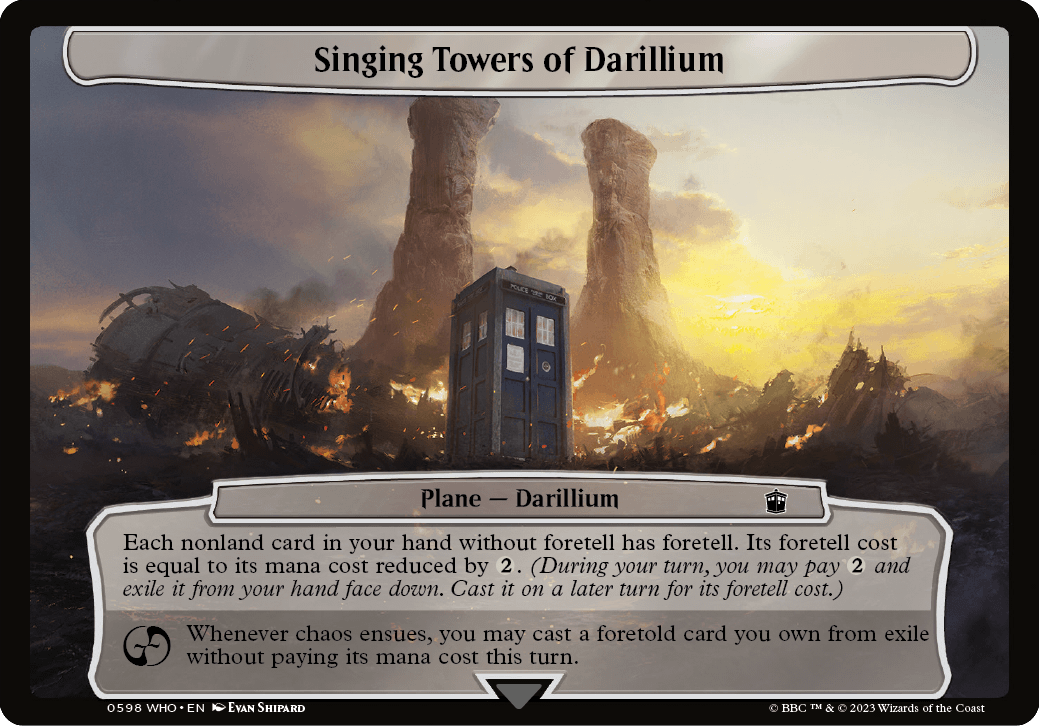
Singing Towers of Darillium
Plane — Darillium
Each nonland card in your hand without foretell has foretell. Its foretell cost is equal to its mana cost reduced by {2}. (During your turn, you may pay {2} and exile it from your hand face down. Cast it on a later turn for its foretell cost.)
Whenever chaos ensues, you may cast a foretold card you own from exile without paying its mana cost this turn.
- Cards that are foretold by virtue of Singing Towers of Darillium's ability won't continue to have the foretell ability once they leave your hand, but you can still cast them from exile on a later turn for the foretell costs they were given by Singing Towers of Darillium.
- The reduction of the foretell cost applies only to generic mana in the foretell cost. It can't reduce requirements of specific colors of mana. For example, if you foretell a card in your hand with mana cost {1}{G}{G}, its foretell cost will be {G}{G}.
- Because exiling a card with foretell from your hand is a special action, you can do so any time you have priority during your turn, including in response to spells and abilities. Once you announce you're taking the action, no other player can respond by trying to remove the card from your hand.
- Casting a foretold card from exile follows the timing rules for that card. If you foretell an instant card, you can cast it as soon as the next player's turn. In most cases, if you foretell a card that isn't an instant (or doesn't have flash), you'll have to wait until your next turn to cast it.
- If you're casting a foretold card from exile for its foretell cost, you can't choose to cast it for any other alternative costs. You can, however, pay additional costs, such as kicker costs. If the card has any mandatory additional costs, those must be paid to cast the spell.
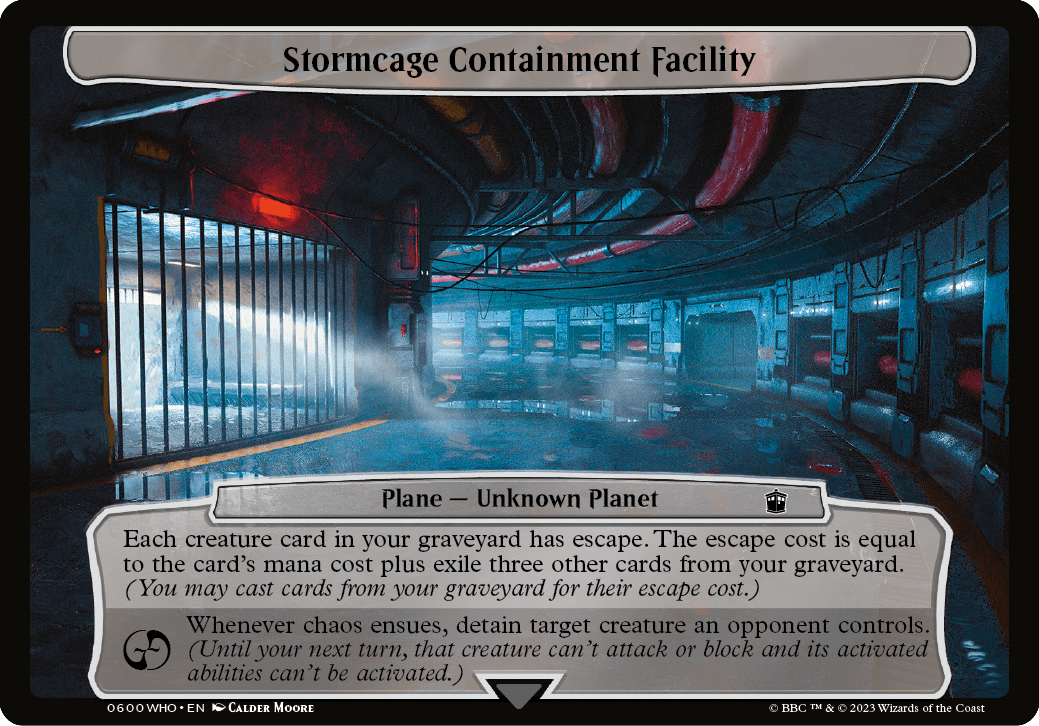
Stormcage Containment Facility
Plane — Unknown Planet
Each creature card in your graveyard has escape. The escape cost is equal to the card's mana cost plus exile three other cards from your graveyard. (You may cast cards from your graveyard for their escape cost.)
Whenever chaos ensues, detain target creature an opponent controls. (Until your next turn, that creature can't attack or block and its activated abilities can't be activated.)
- If a card has no mana cost, its escape cost is an unpayable cost, so you can't cast it for that cost.
- If you're casting a modal double-faced card with escape, you choose how you wish to cast it, then pay the appropriate cost (for the face you're casting) plus exiling three other cards. You may cast only creature spells this way.
- If a spell you're casting with escape has an additional cost of discarding cards or sacrificing permanents, you may exile cards discarded or sacrificed this way to pay that part of its escape cost.
- Escape's permission doesn't change when you may cast the spell from your graveyard.
- To determine the total cost of a spell, start with the mana cost or alternative cost you're paying (such as an escape cost), add any cost increases, then apply any cost reductions. The mana value of the spell remains unchanged, no matter what the total cost to cast it was and no matter whether an alternative cost was paid.
- After an escaped spell resolves, it returns to its owner's graveyard if it's not a permanent spell. If it is a permanent spell, it enters the battlefield and will return to its owner's graveyard if it dies later. Perhaps it will escape again.
- If a card has multiple abilities giving you permission to cast it, such as two escape abilities or an escape ability and a flashback ability, you choose which one to apply. The others have no effect.
- If you cast a spell with its escape permission, you can't choose to apply any other alternative costs or to cast it without paying its mana cost. If it has any additional costs, you must pay those.
- If a card with escape is put into your graveyard during your turn, you'll be able to cast it right away if it's legal to do so, before an opponent can take any actions.
- Once you begin casting a spell with escape, it immediately moves to the stack. Players can't take any other actions until you're done casting the spell.
- Activated abilities include a colon and are written in the form "[cost]: [effect]." No one can activate any activated abilities, including mana abilities, of a detained permanent.
- The static abilities of a detained permanent still apply. The triggered abilities of a detained permanent can still trigger.
- If a creature is already attacking or blocking when it's detained, it won't be removed from combat. It will continue to attack or block.
- If a permanent's activated ability is on the stack when that permanent is detained, the ability will be unaffected.
- When a player leaves a multiplayer game, any continuous effects with durations that last until that player's next turn or until a specific point in that turn will last until that turn would have begun. They neither expire immediately nor last indefinitely.
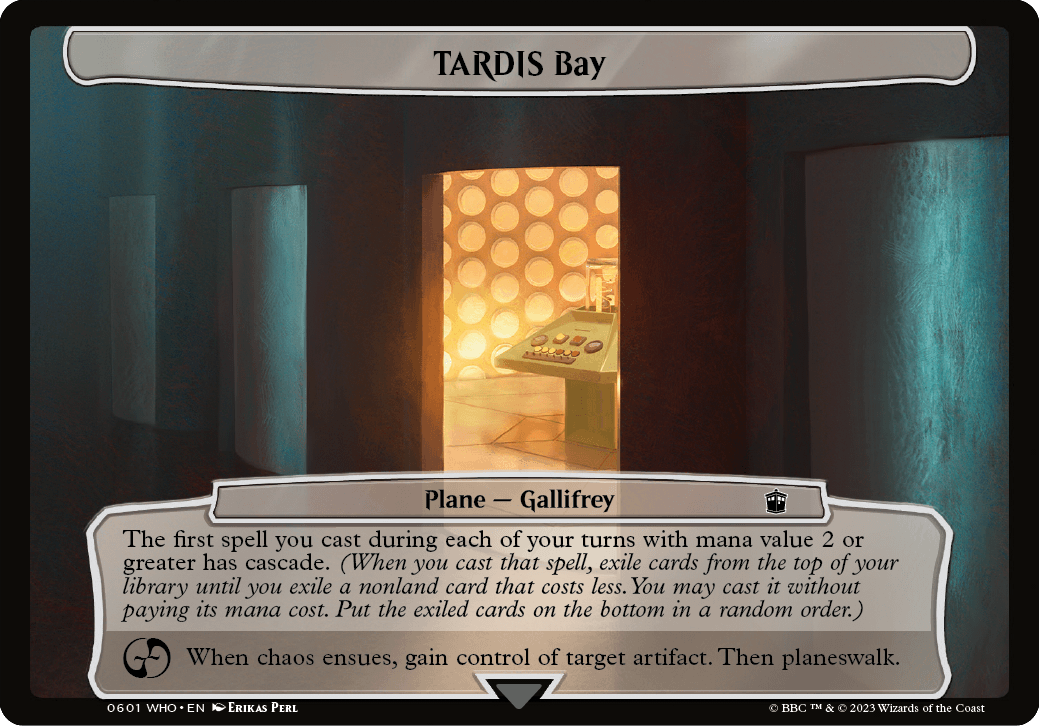
TARDIS Bay
Plane — Gallifrey
The first spell you cast during each of your turns with mana value 2 or greater has cascade. (When you cast that spell, exile cards from the top of your library until you exile a nonland card that costs less. You may cast it without paying its mana cost. Put the exiled cards on the bottom in a random order.)
When chaos ensues, gain control of target artifact. Then planeswalk.
- If a spell has multiple instances of cascade, each one triggers separately.
- A spell's mana value is determined only by its mana cost. Ignore any alternative costs, additional costs, cost increases, or cost reductions.
- Cascade triggers when you cast the spell, meaning that it resolves before that spell. If you end up casting the exiled card, it will go on the stack above the spell with cascade.
- When the cascade ability resolves, you must exile cards. The only optional part of the ability is whether or not you cast the last card exiled.
- If a spell with cascade is countered, the cascade ability will still resolve normally.
- You exile the cards face up. All players will be able to see them.
- If you cast a card "without paying its mana cost," you can't choose to cast it for any alternative costs. You can, however, pay additional costs. If the card has any mandatory additional costs, you must pay those to cast the card.
- If the card has {X} in its mana cost, you must choose 0 as the value of X when casting it without paying its mana cost.
- Due to a 2021 rules change to cascade, not only do you stop exiling cards if you exile a nonland card with lesser mana value than the spell with cascade, but the resulting spell you cast must also have lesser mana value. Previously, in cases where a card's mana value differed from the resulting spell, such as with some modal double-faced cards or cards with an Adventure, you could cast a spell with a higher mana value than the exiled card.
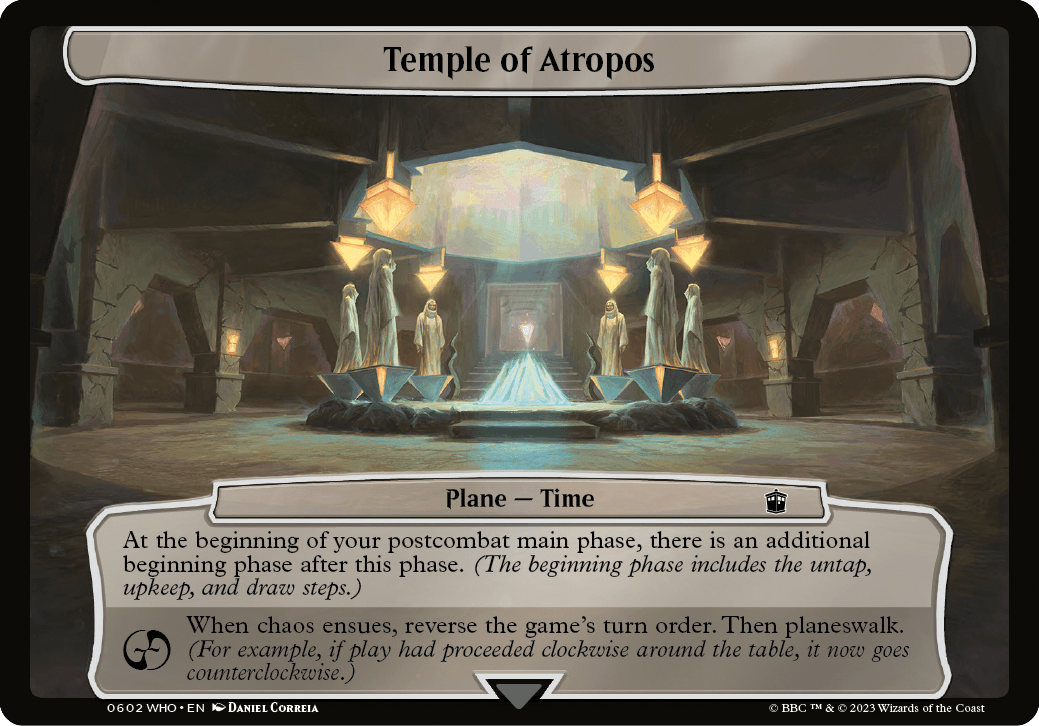
Temple of Atropos
Plane — Time
At the beginning of your postcombat main phase, there is an additional beginning phase after this phase. (The beginning phase includes the untap, upkeep, and draw steps.)
When chaos ensues, reverse the game's turn order. Then planeswalk. (For example, if play had proceeded clockwise around the table, it now goes counterclockwise.)
- The additional beginning phase will be a lot like your normal beginning phase. During the untap step, permanents will phase in or out as appropriate and you'll untap your tapped permanents. Anything that triggers "at the beginning of your upkeep" or similar will trigger during the upkeep step, and you'll eventually draw a card for your draw step.
- The additional beginning phase all happens during the current turn. Any effects that last "until your next turn" or similar won't expire just because you'll go through an additional beginning phase.
- After the additional beginning phase, the game proceeds to the ending phase (unless something has added even more phases; see below).
- If multiple phases are added to the same point in your turn, the most recently created phase happens first. For example, say the current plane is Temple of Atropos and its ability triggers during your postcombat main phase. Later during that same main phase, another effect gives you an additional combat phase after this main phase. The additional combat will happen first, followed by the additional beginning phase.
- Even if you don't attack with any creatures during combat, you'll still get a postcombat main phase and Temple of Atropos's ability will still trigger.
- If you somehow have more than two main phases in a turn, each main phase other than the first one is a postcombat main phase, and Temple of Atropos's ability triggers at the beginning of each of them.
- The effect of the chaos ability reverses the turn order for players established at the beginning of the game. While the order is reversed, anything that cares about this order (such as determining in what order choices are made) will use the new order.
- If the game's turn order is reversed again, it will return to the default order used at the beginning of the game.
- If the turn order is reversed during an extra turn, the next non-extra turn will be taken by the next player in turn order from the last player who took a non-extra turn. The order of any pending extra turns isn't affected.
- If the turn order is reversed during a two-player game, or during a multiplayer game that only has two players left, it has no noticeable effect on the game.
- Reversing the turn order has no effect on the order of steps and phases in each turn. Those steps and phases still happen normally (along with the additional beginning phase).
Magic: The Gathering and Magic are trademarks of Wizards of the Coast LLC in the USA and other countries. ©2023 Wizards.
BBC, DOCTOR WHO, TARDIS, DALEK, CYBERMAN, and K-9 (word marks and devices) are trademarks of the British Broadcasting Corporation and are used under license. BBC logo © BBC 1996. DOCTOR WHO logo © BBC 1973. Dalek image © BBC/Terry Nation 1963. Cyberman image © BBC/Kit Pedler/Gerry Davis 1966. K-9 image © BBC/Bob Baker/Dave Martin 1977. Licensed by BBC Studios.
